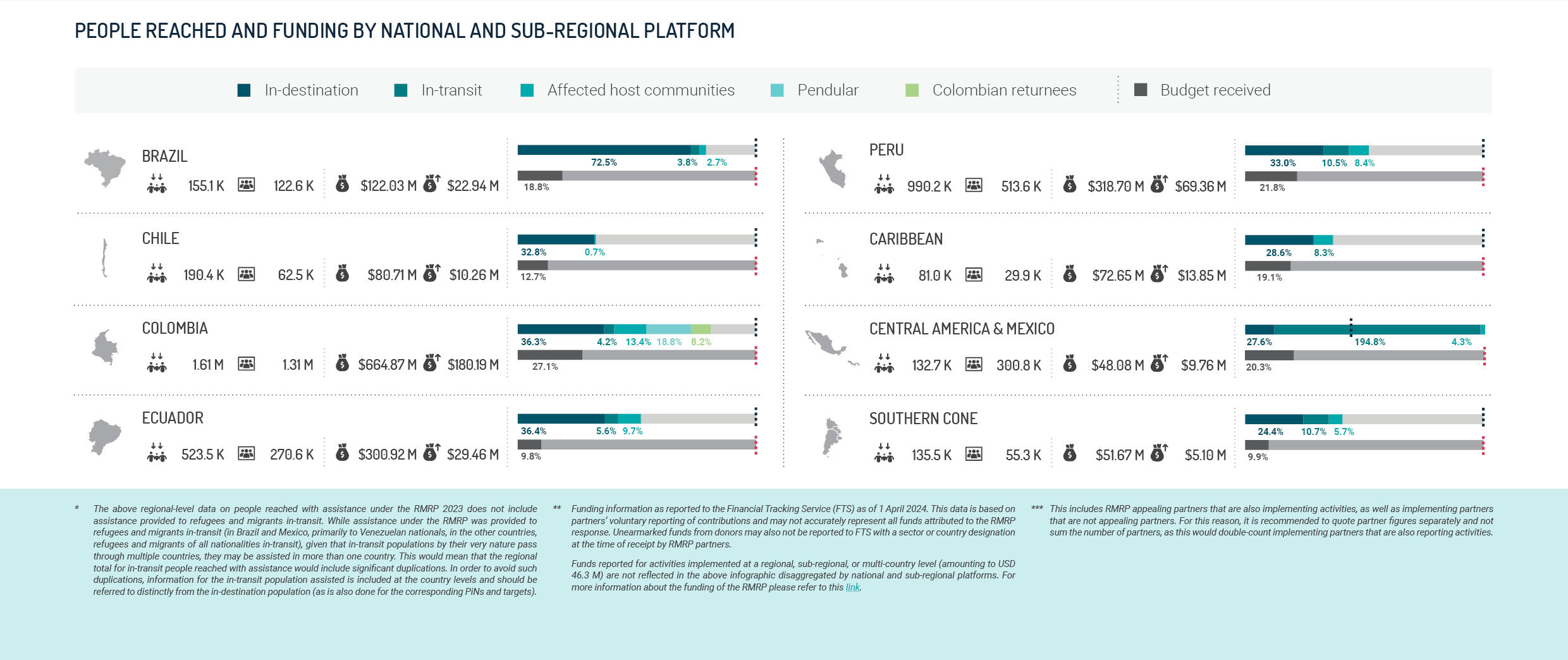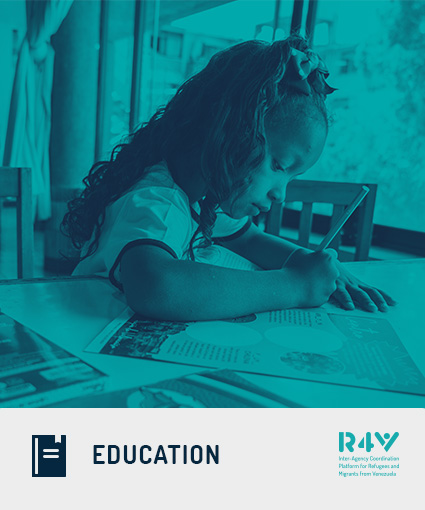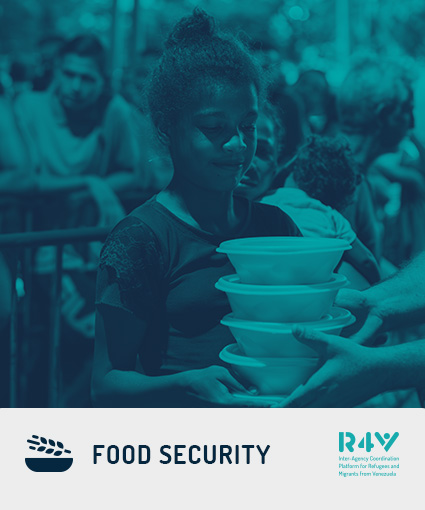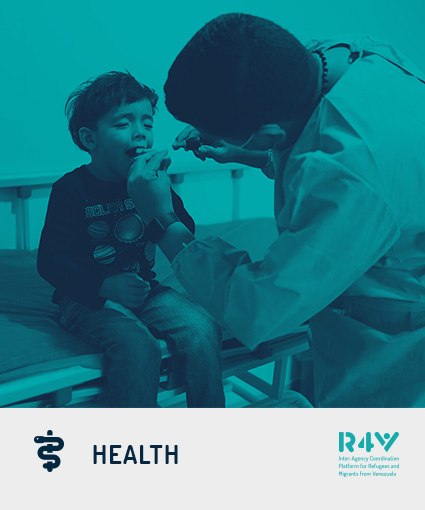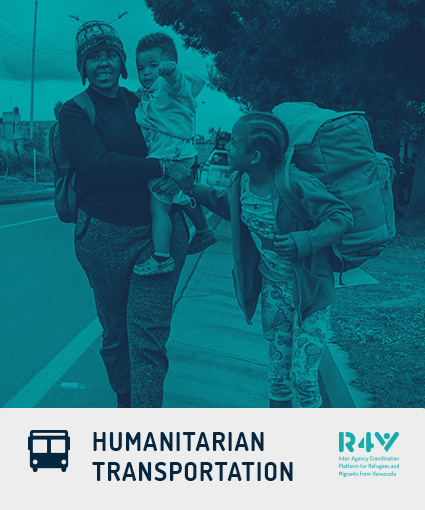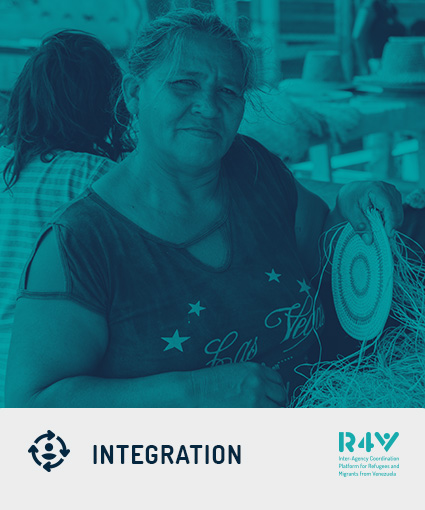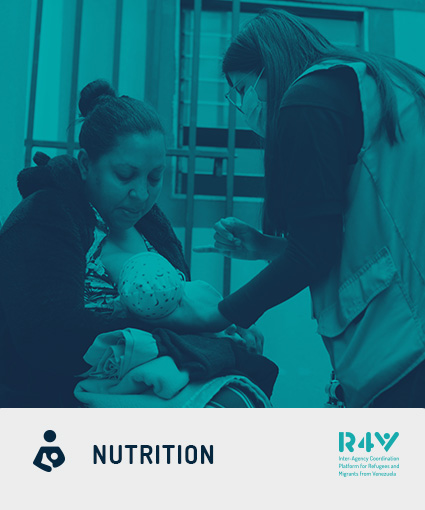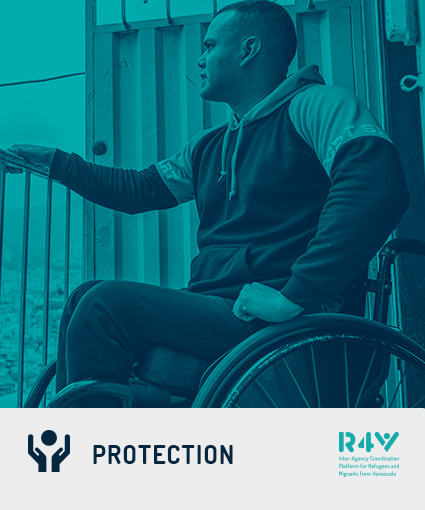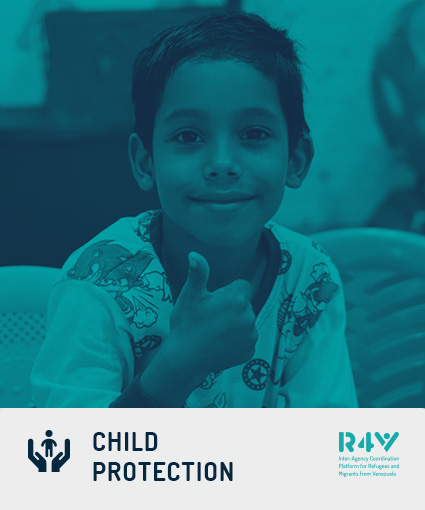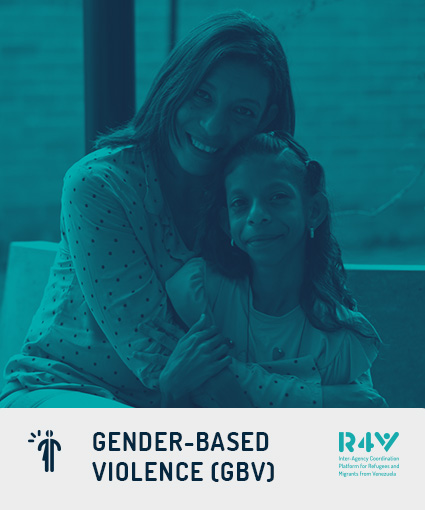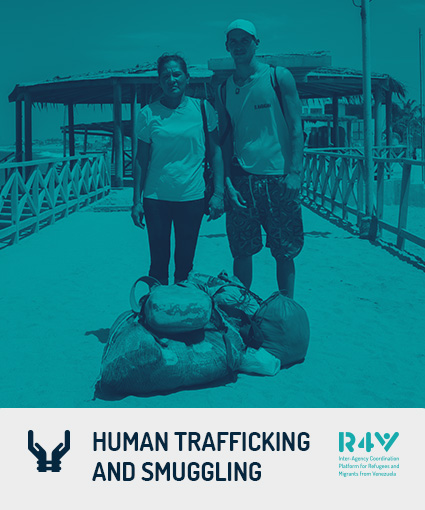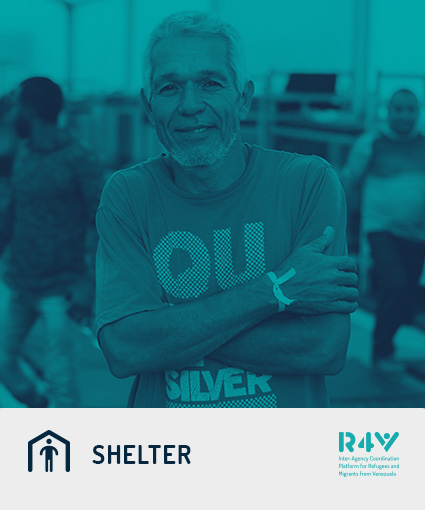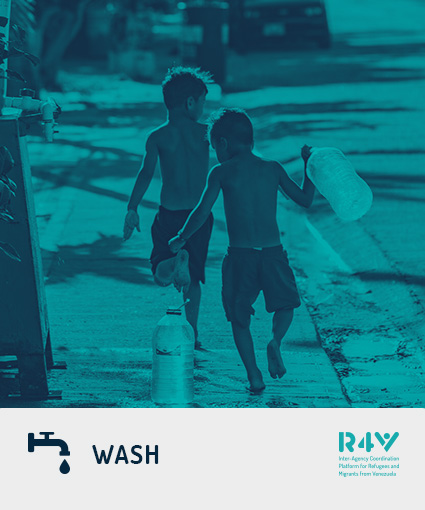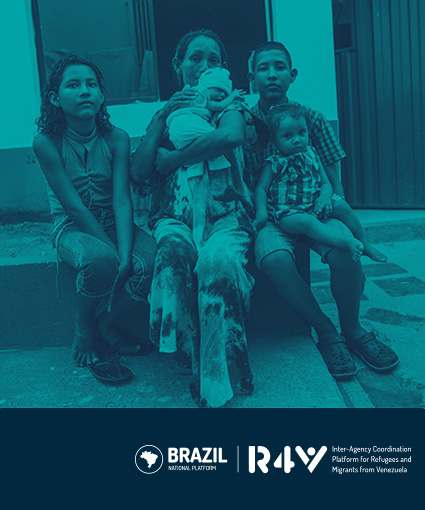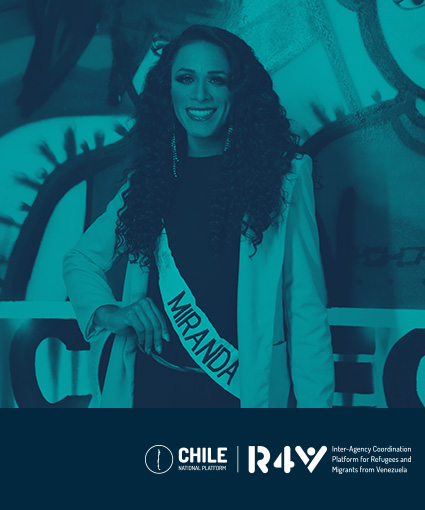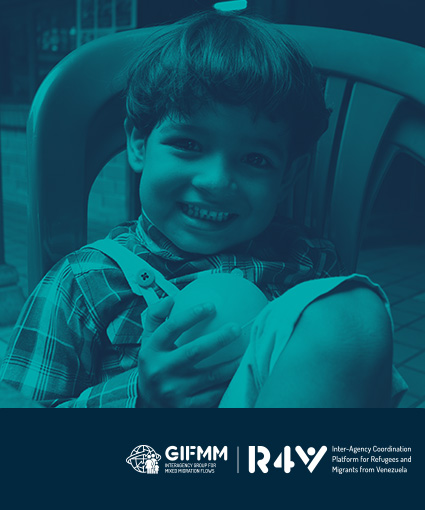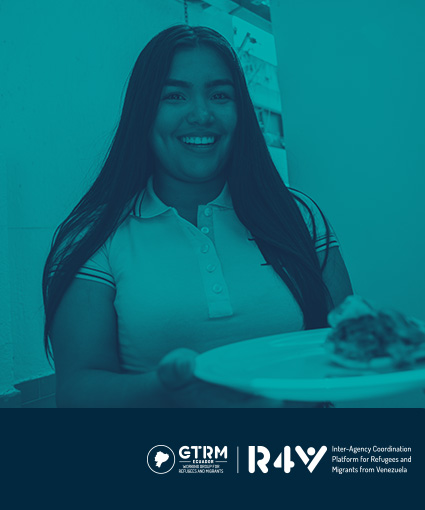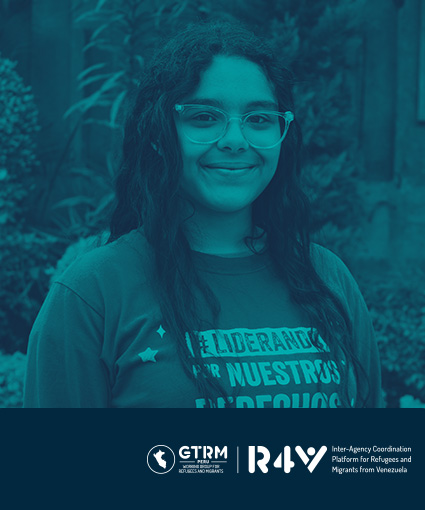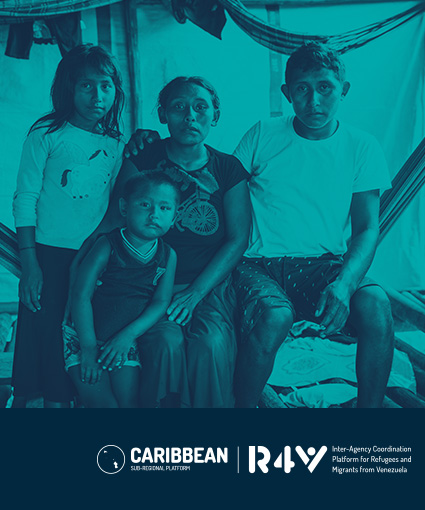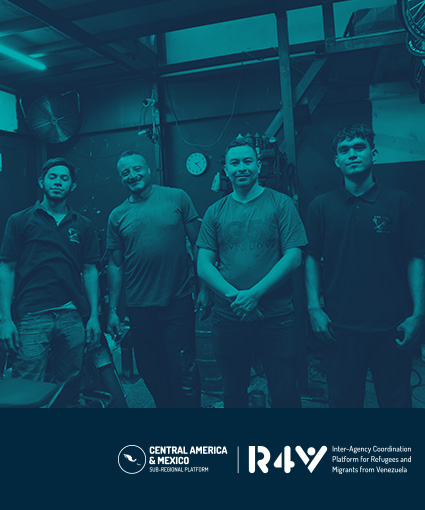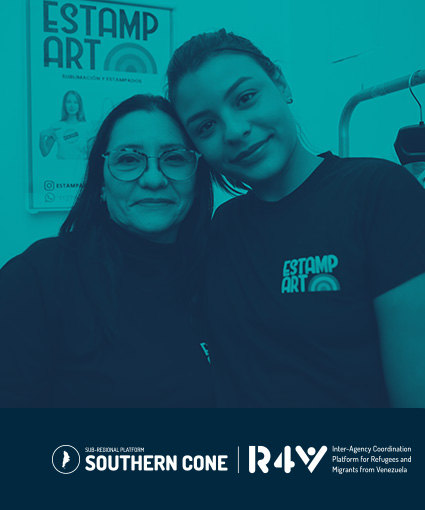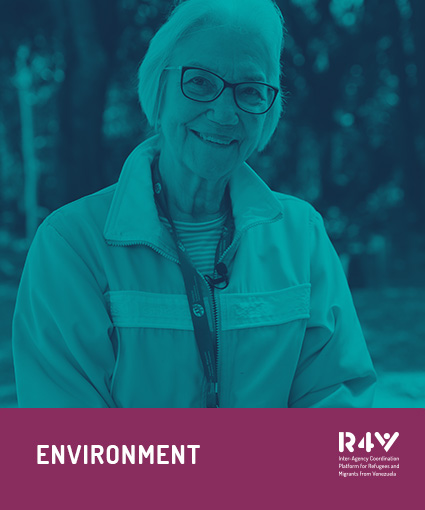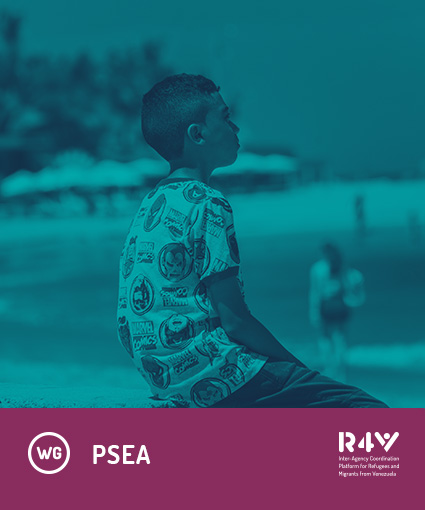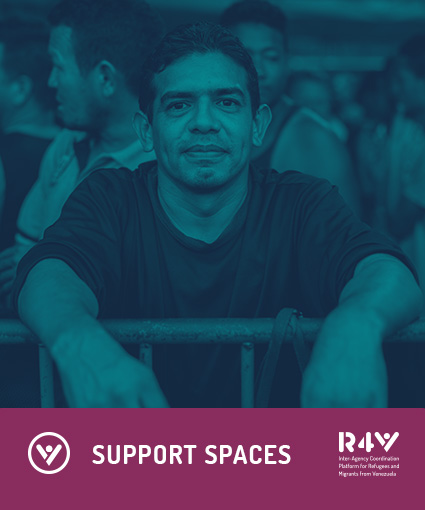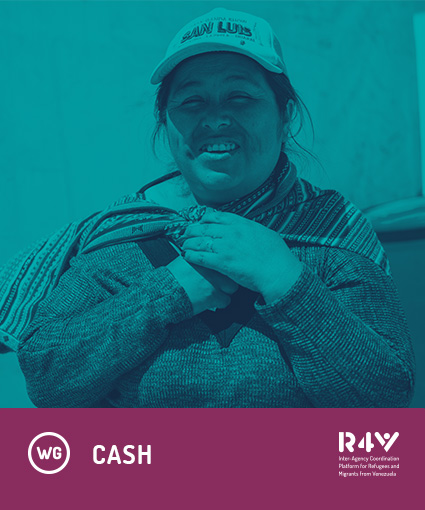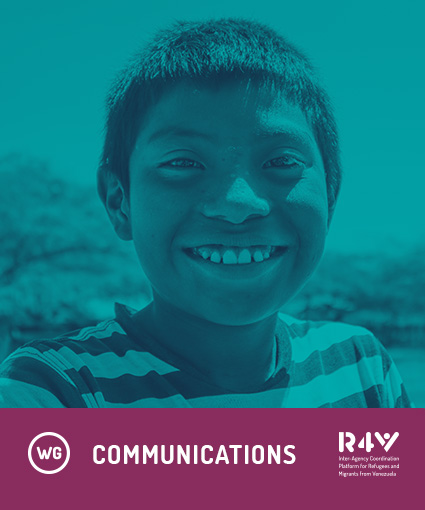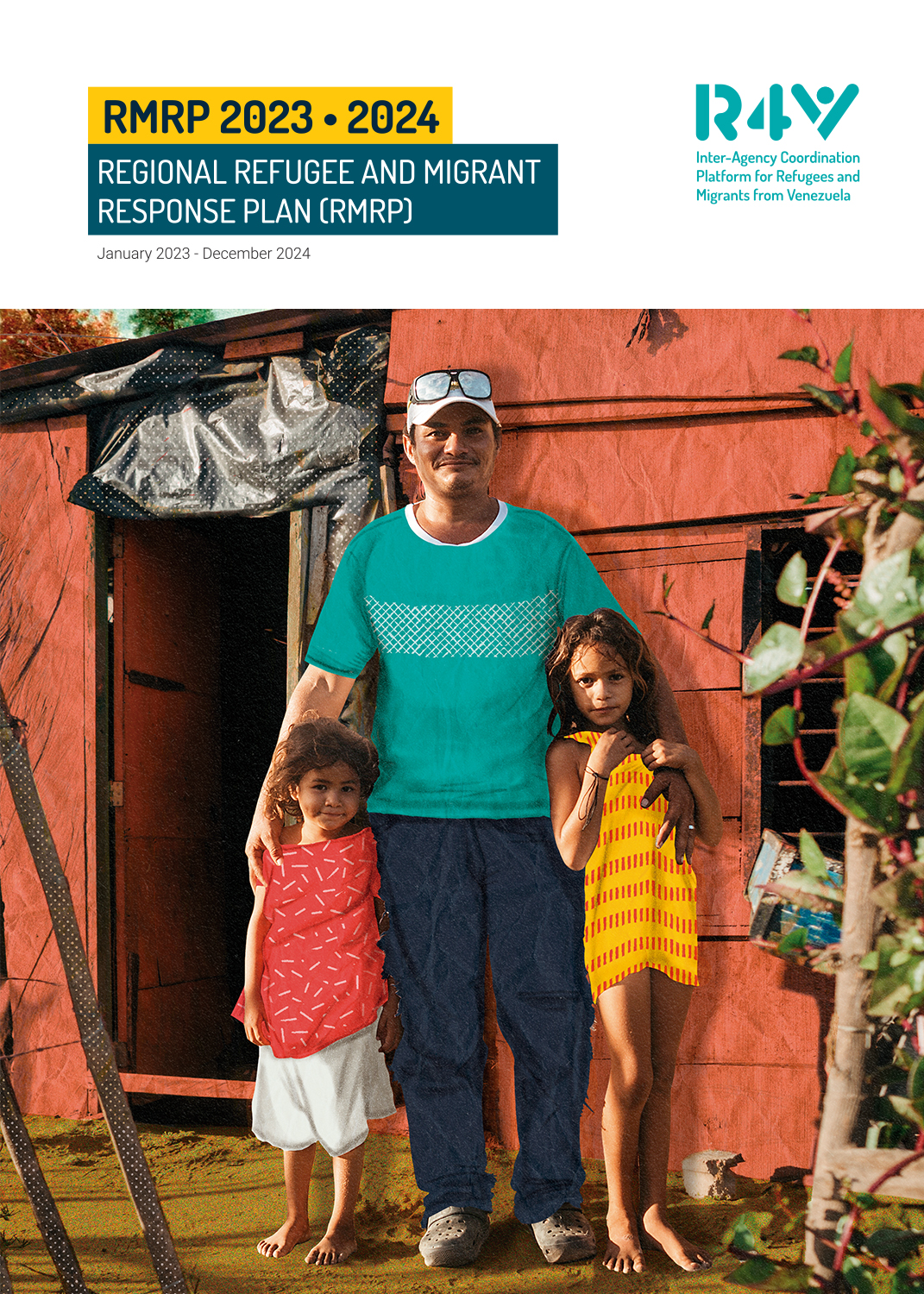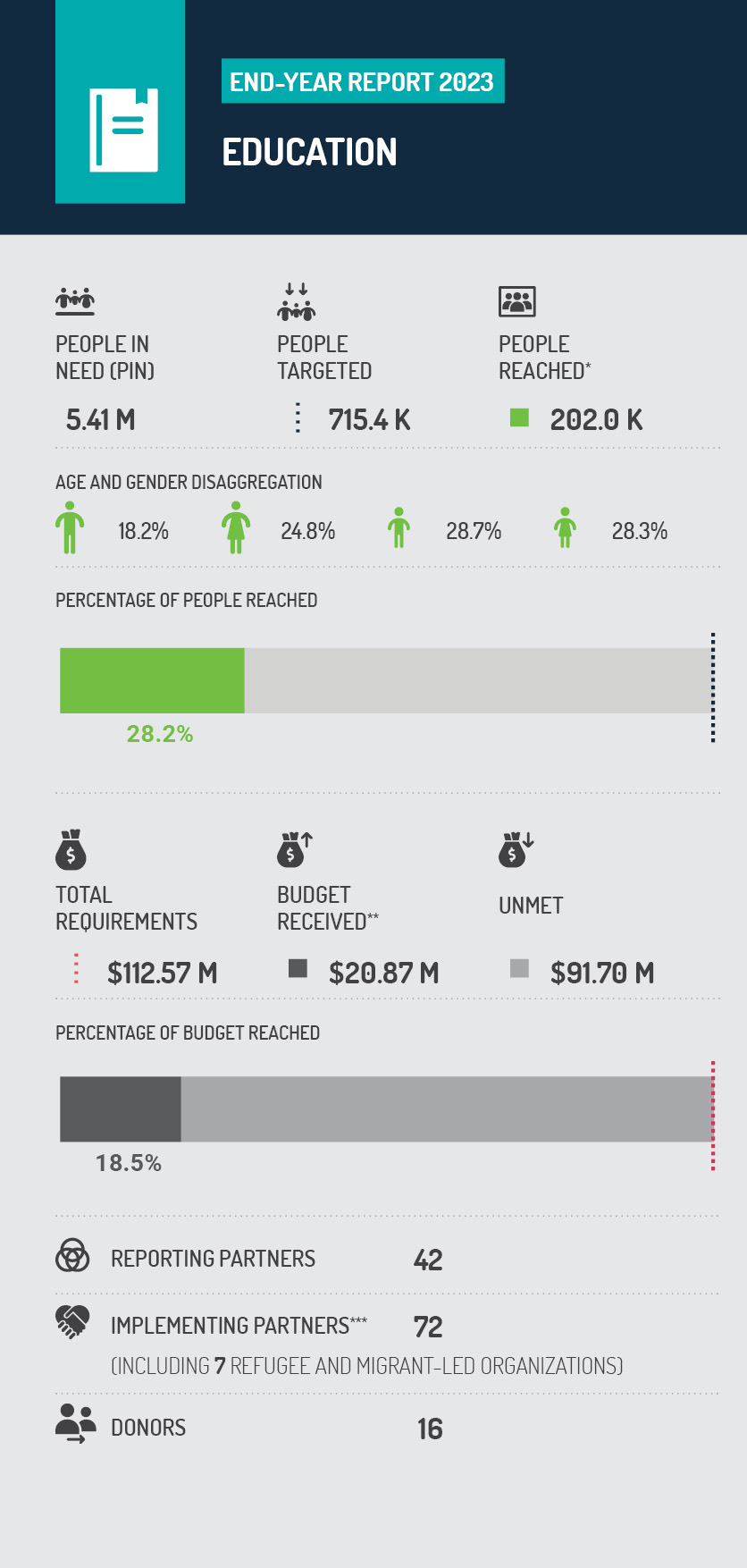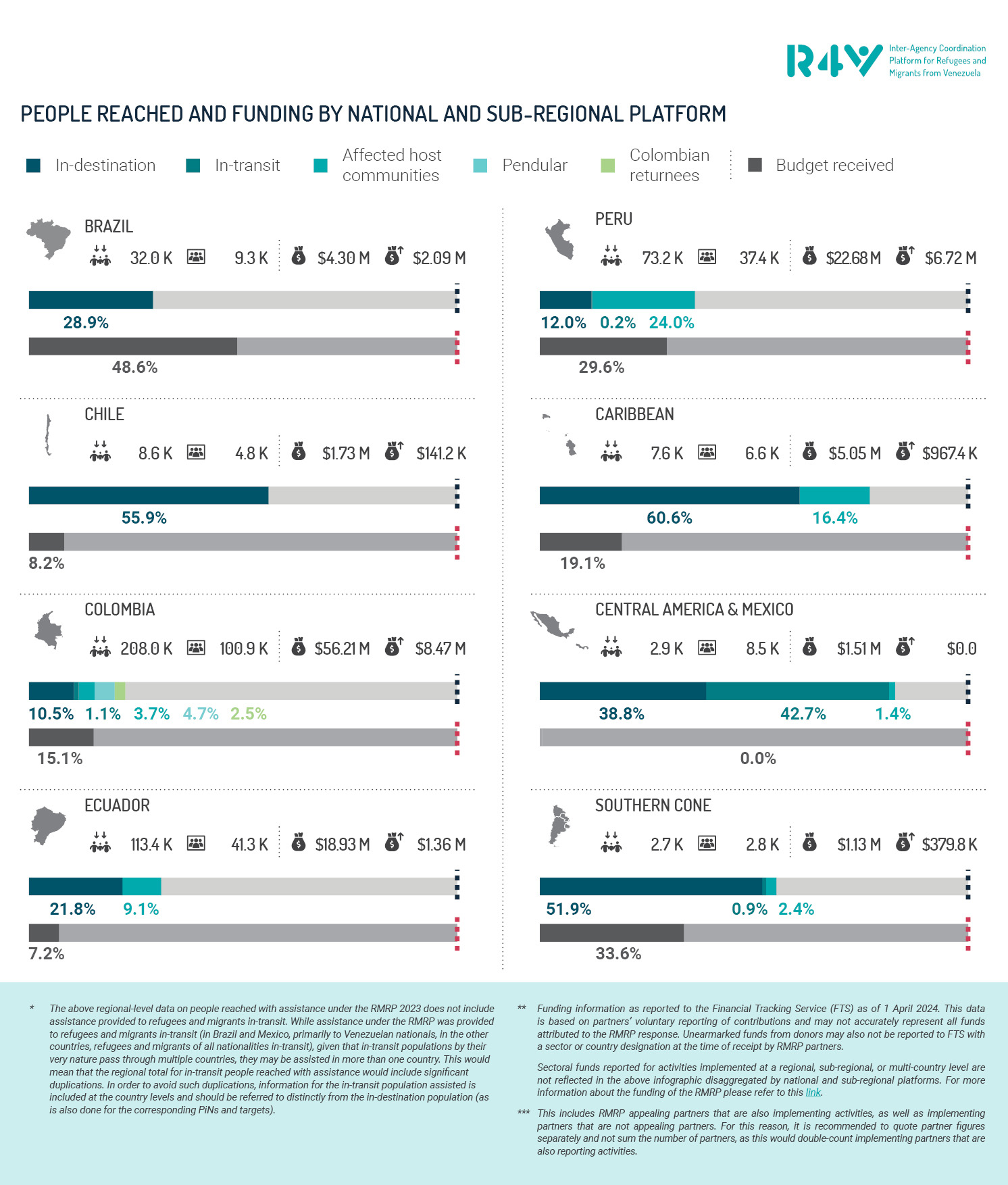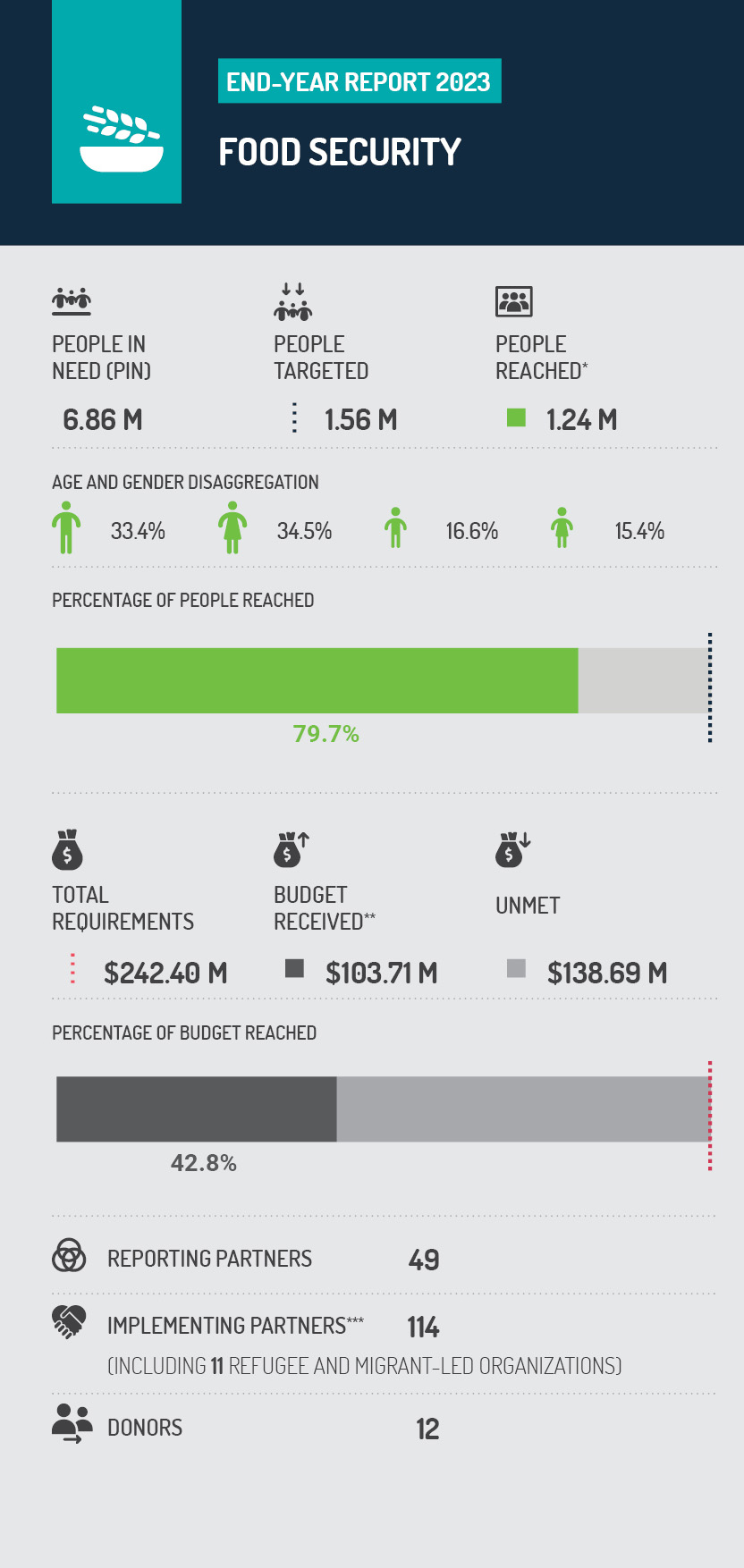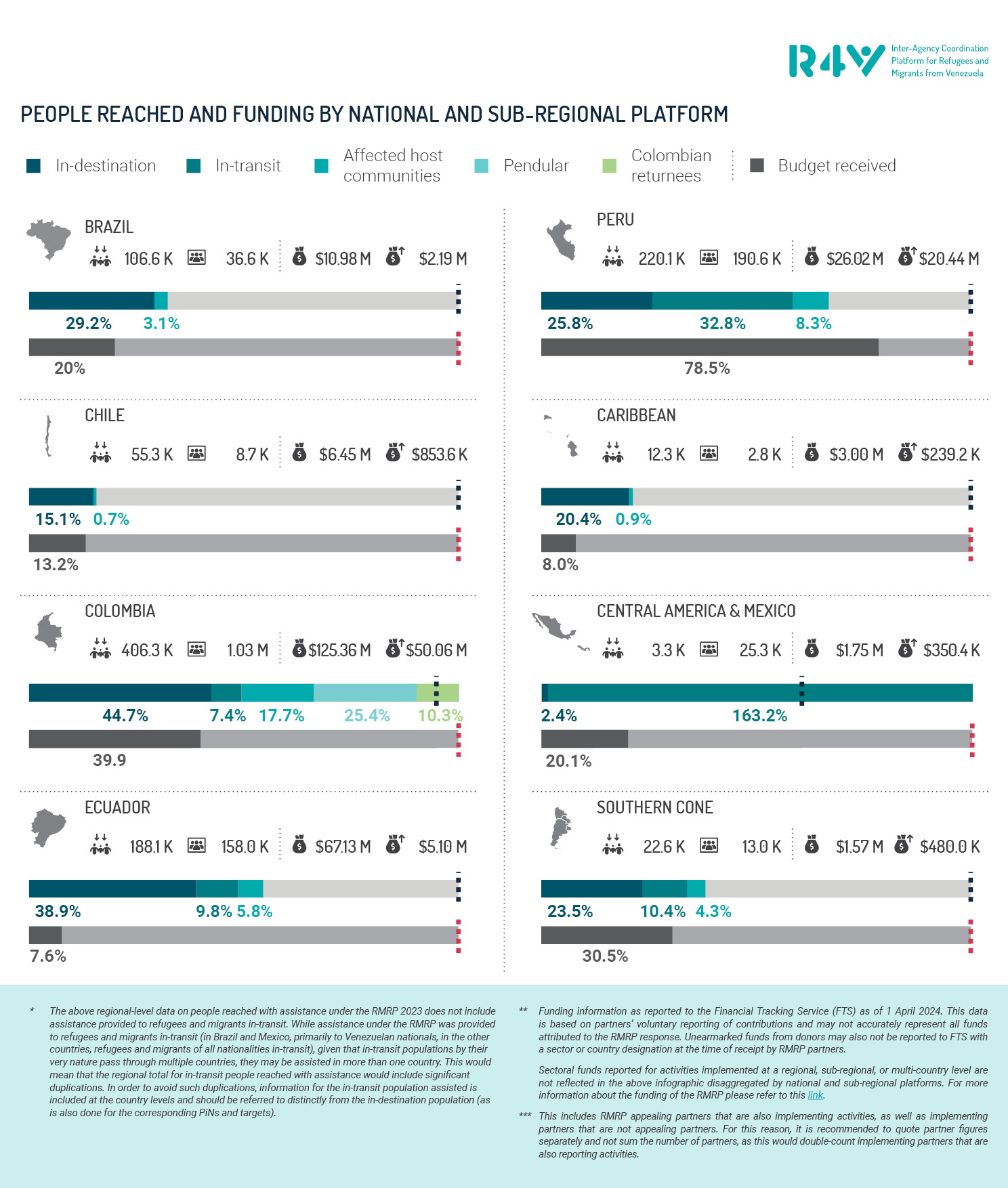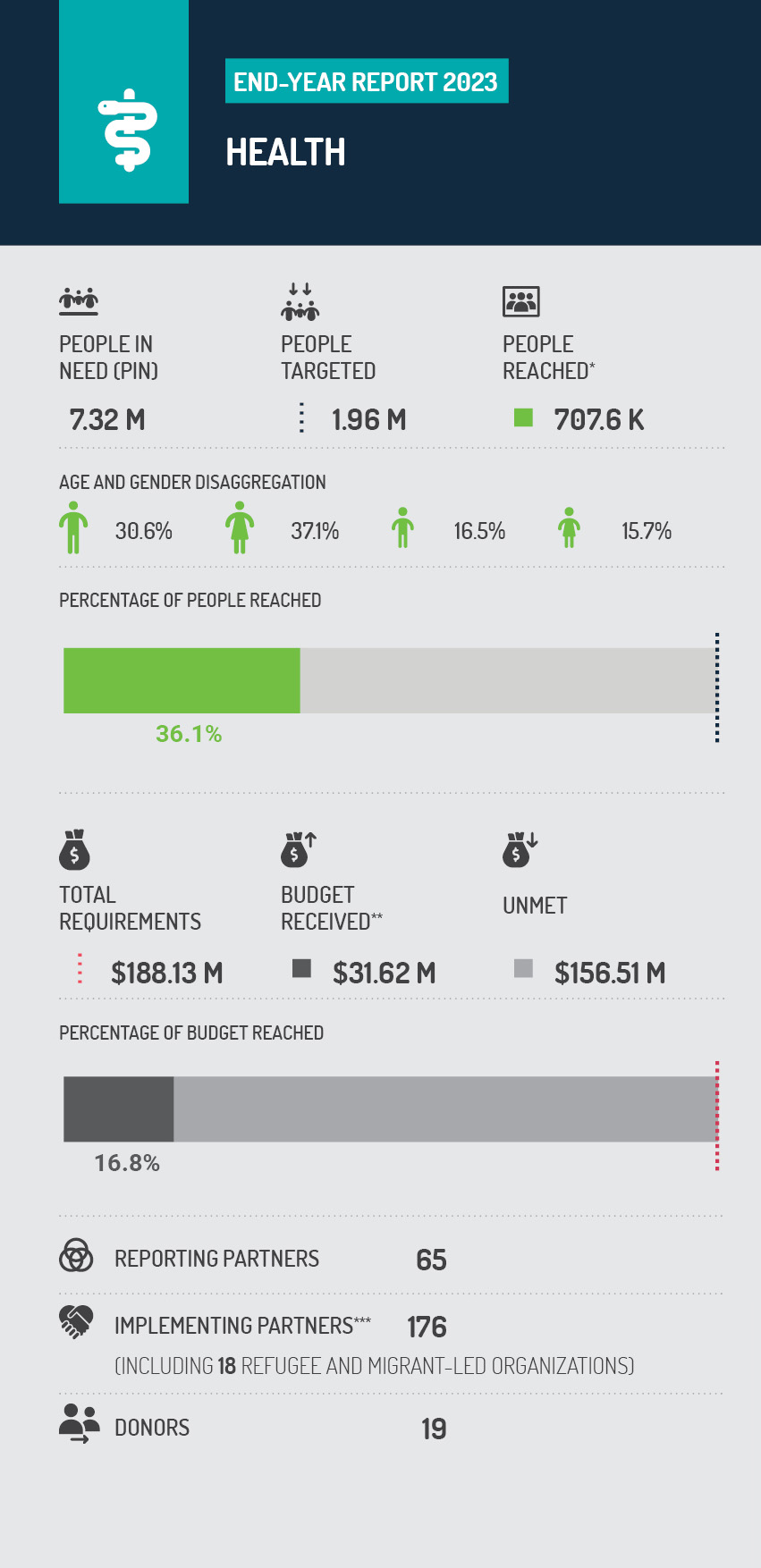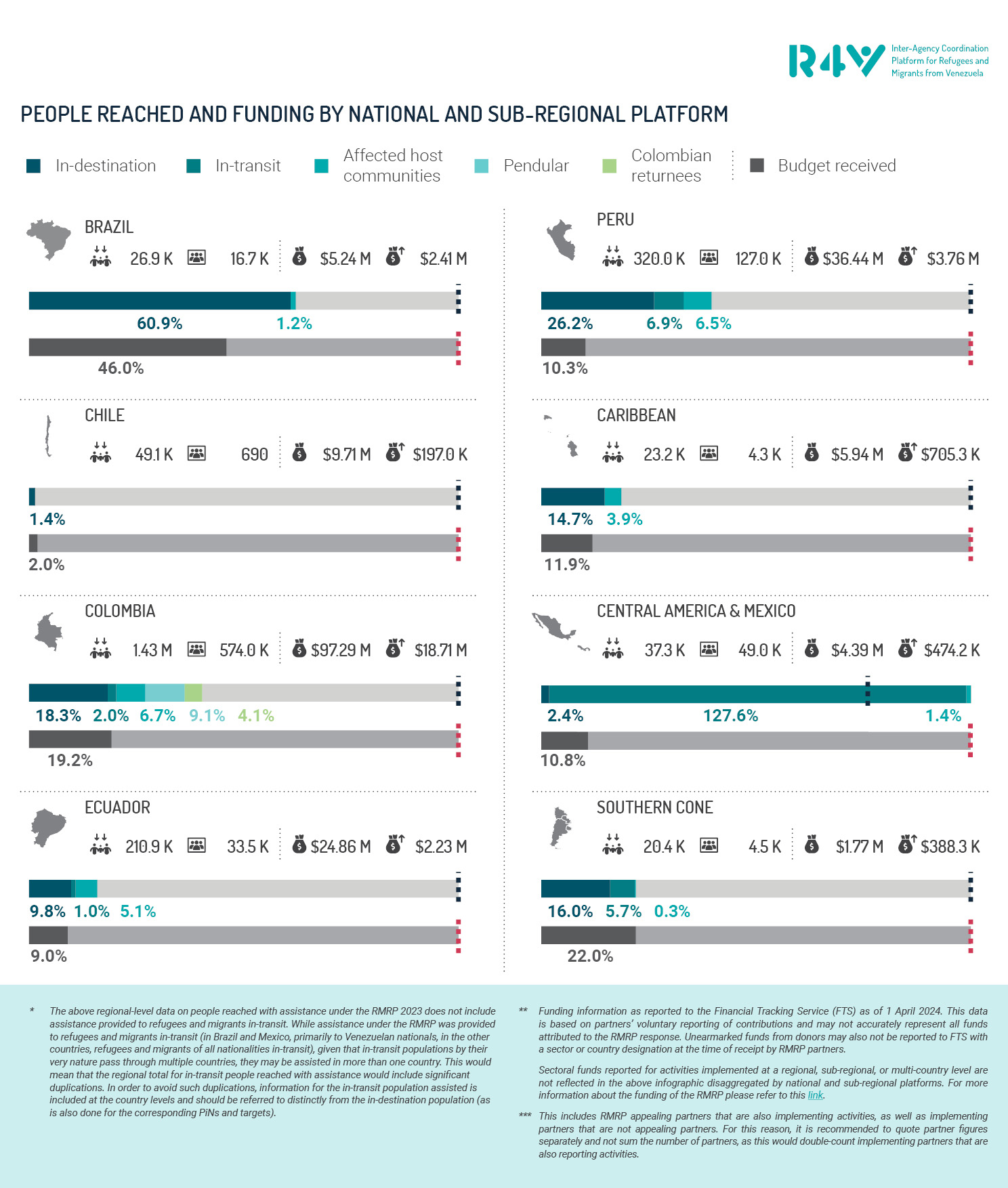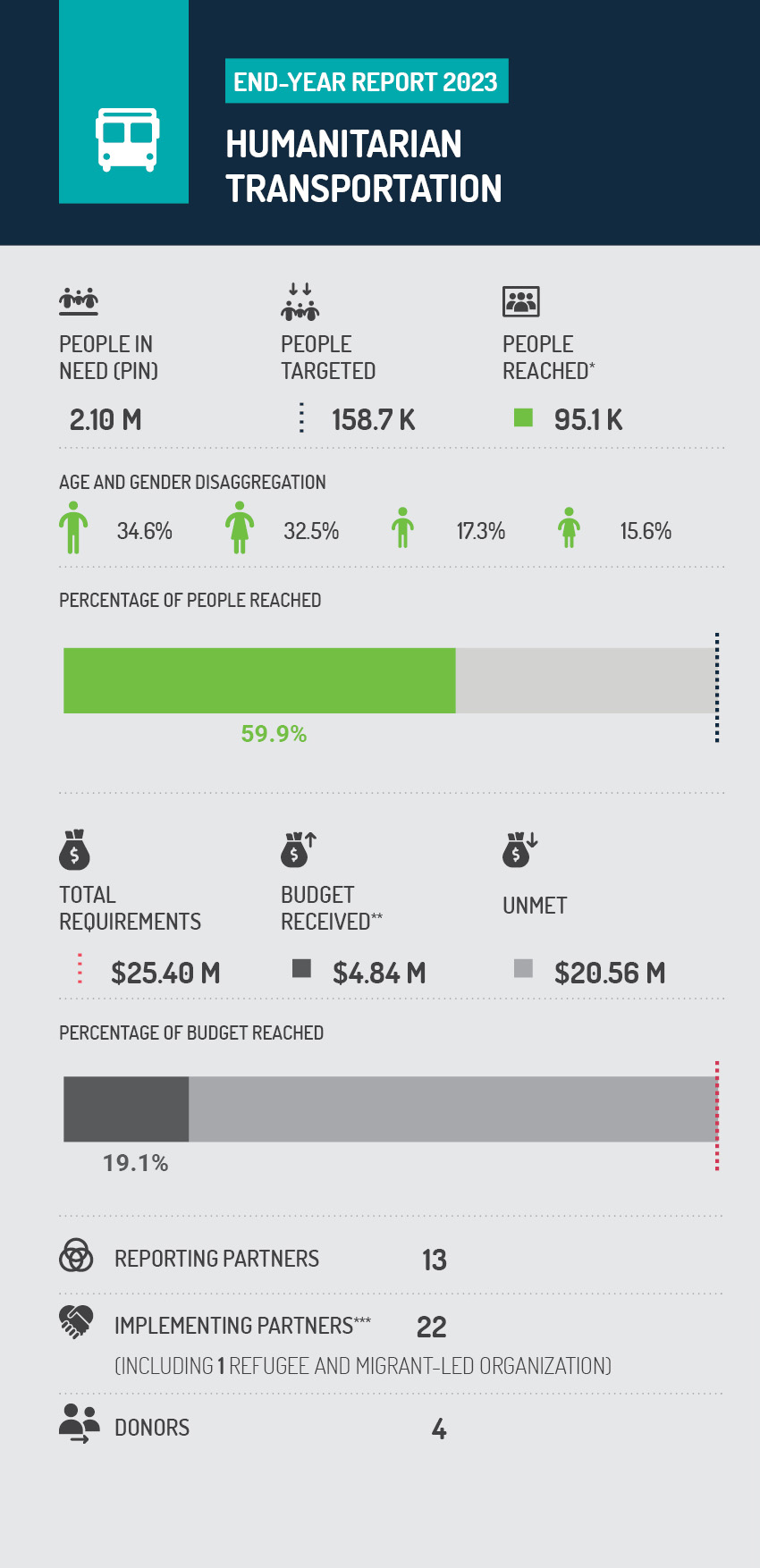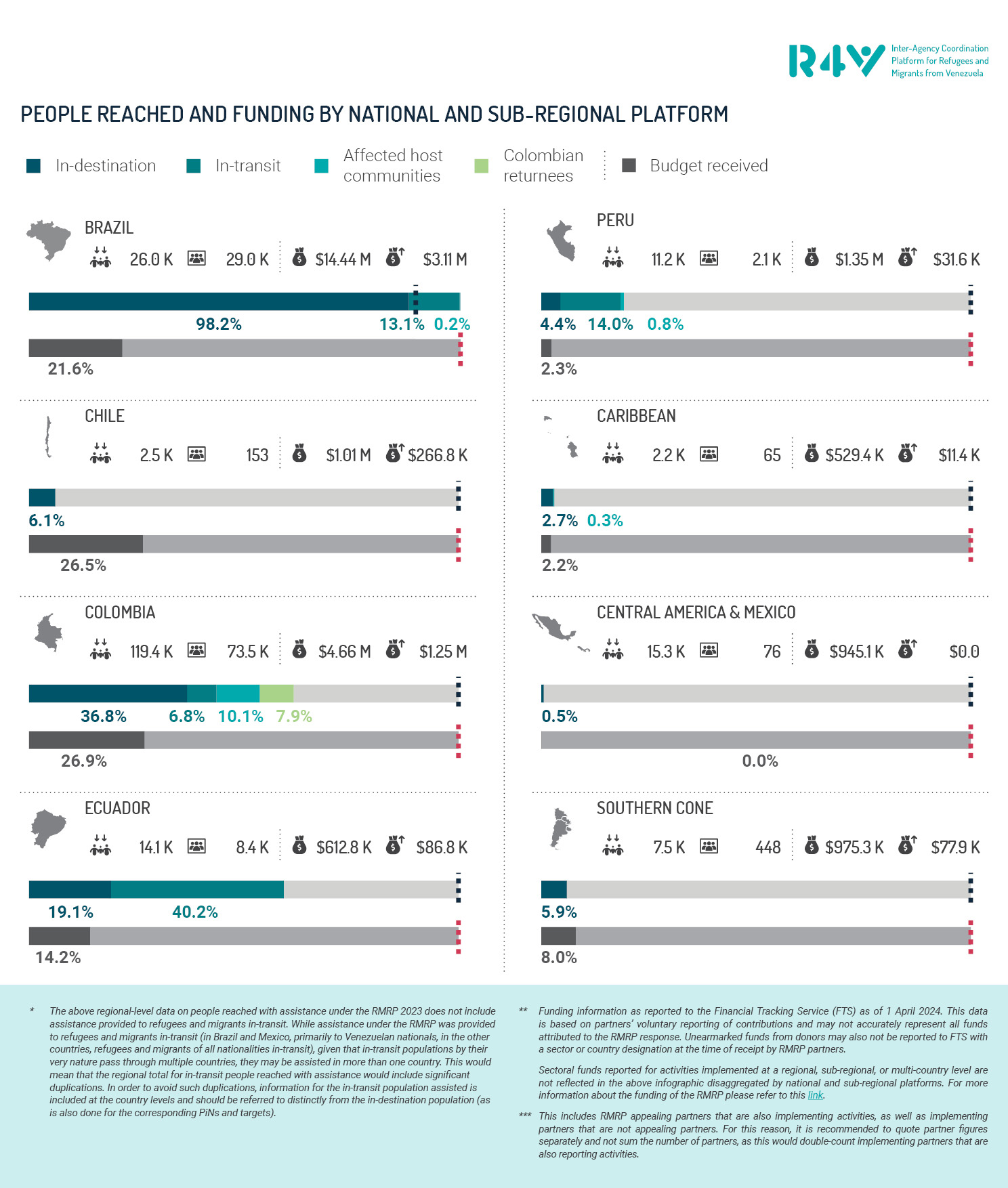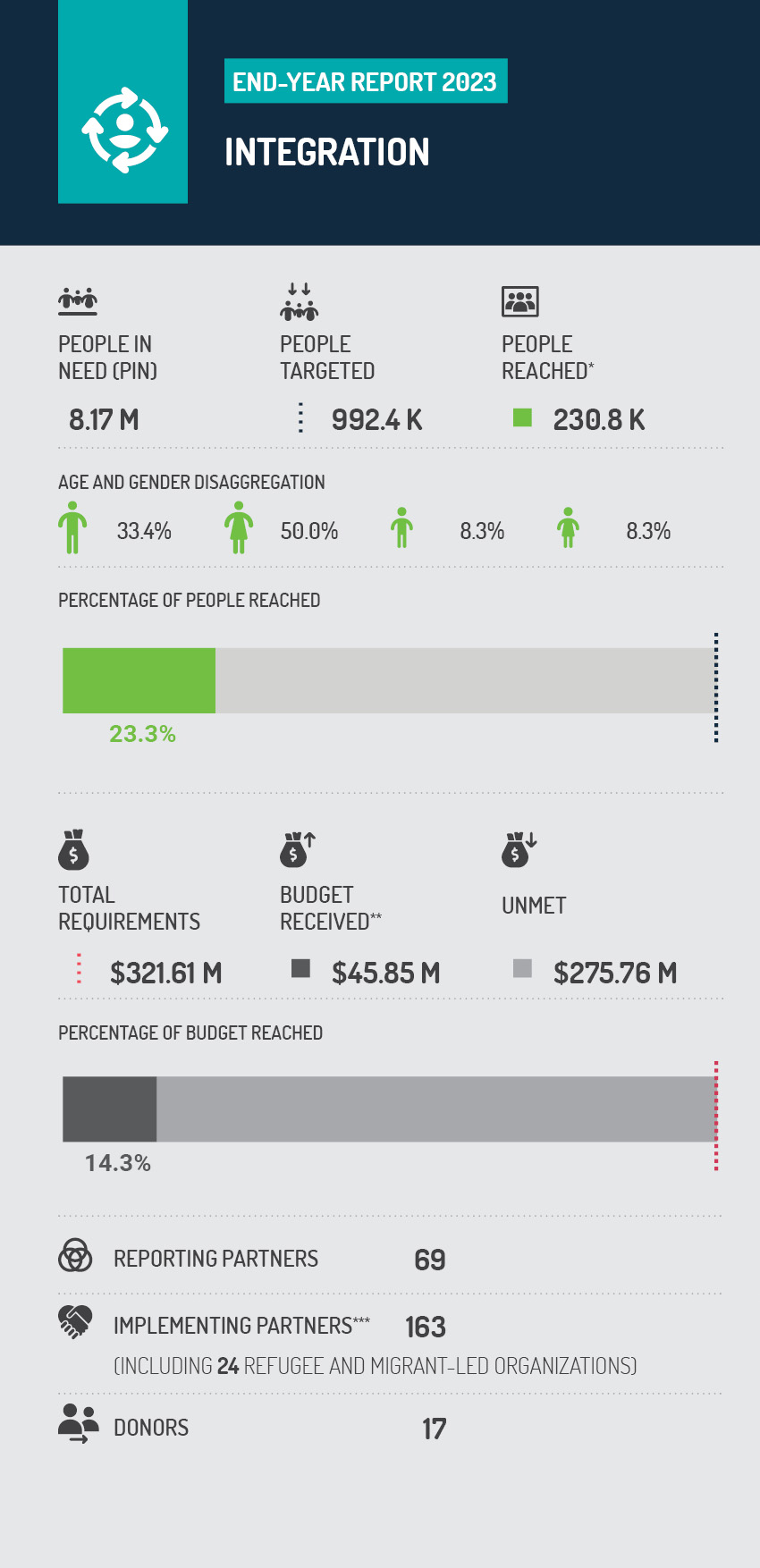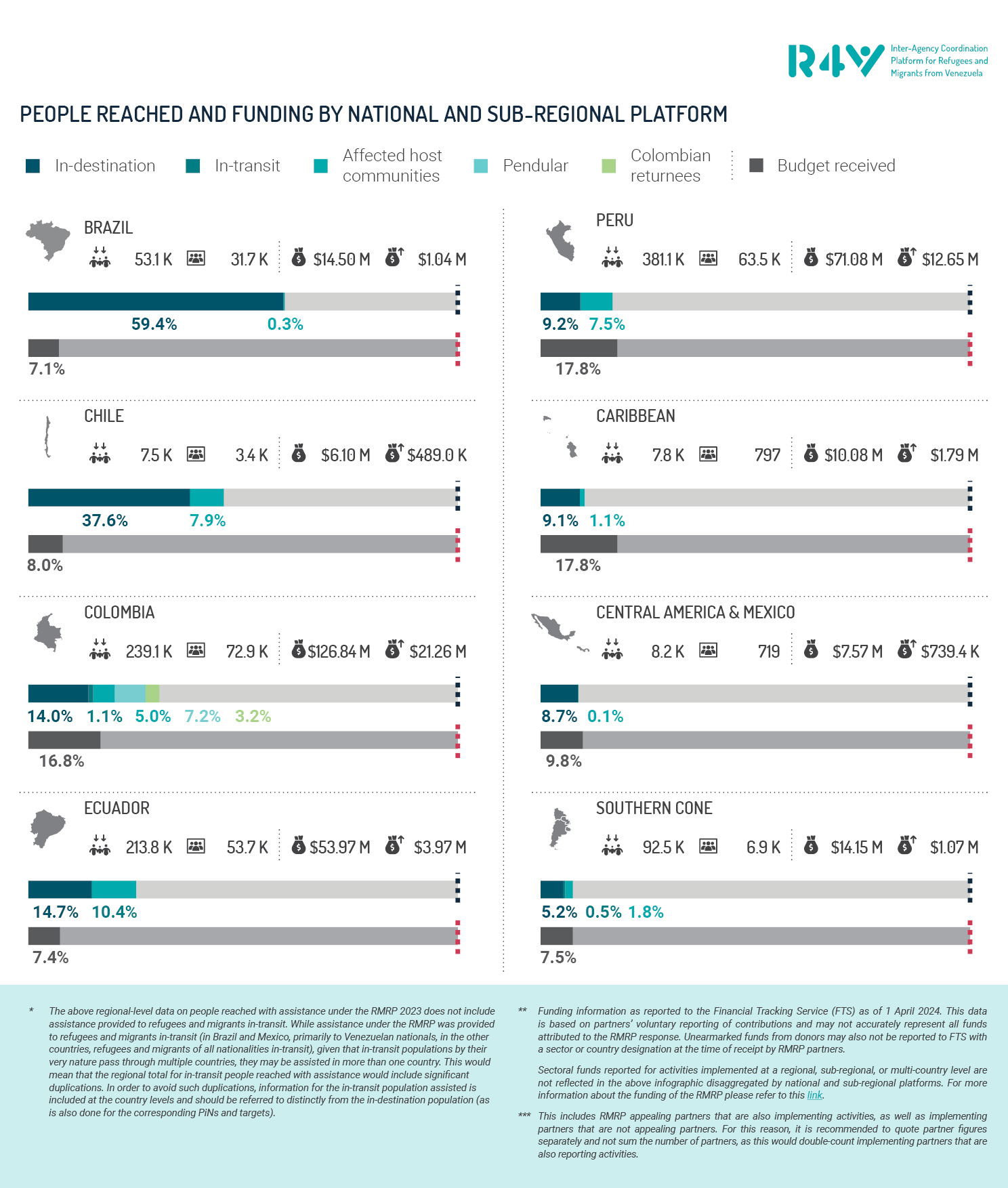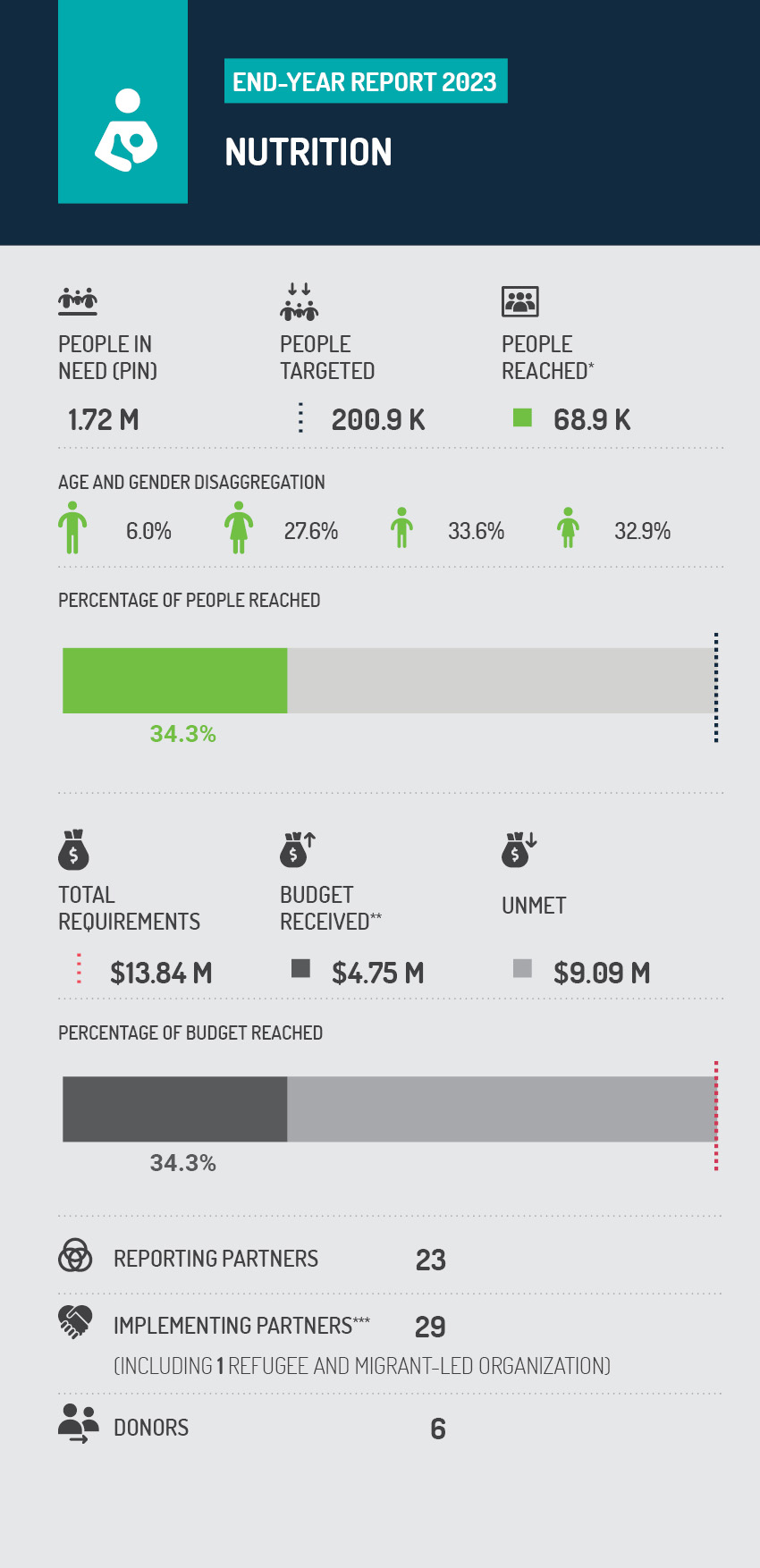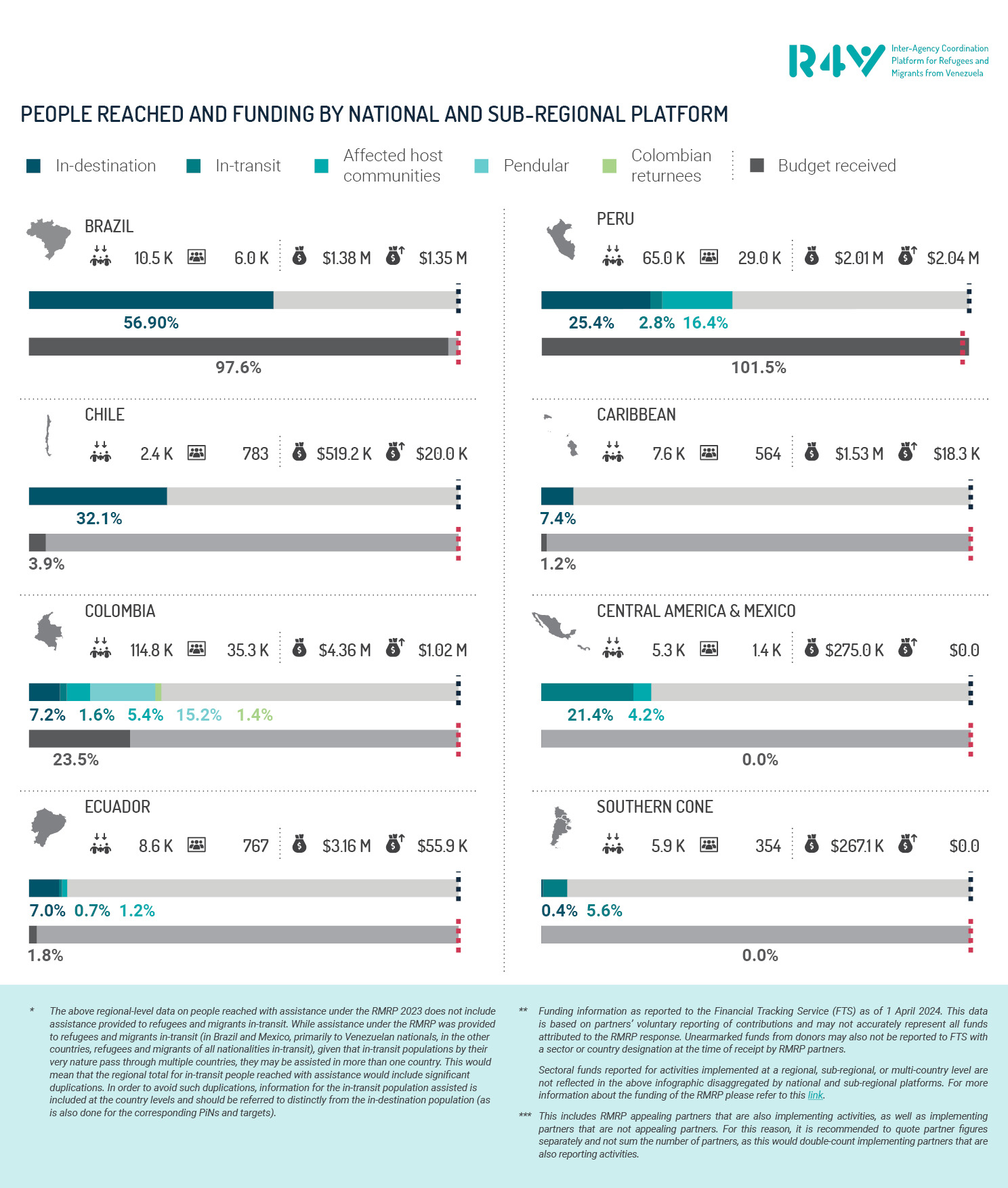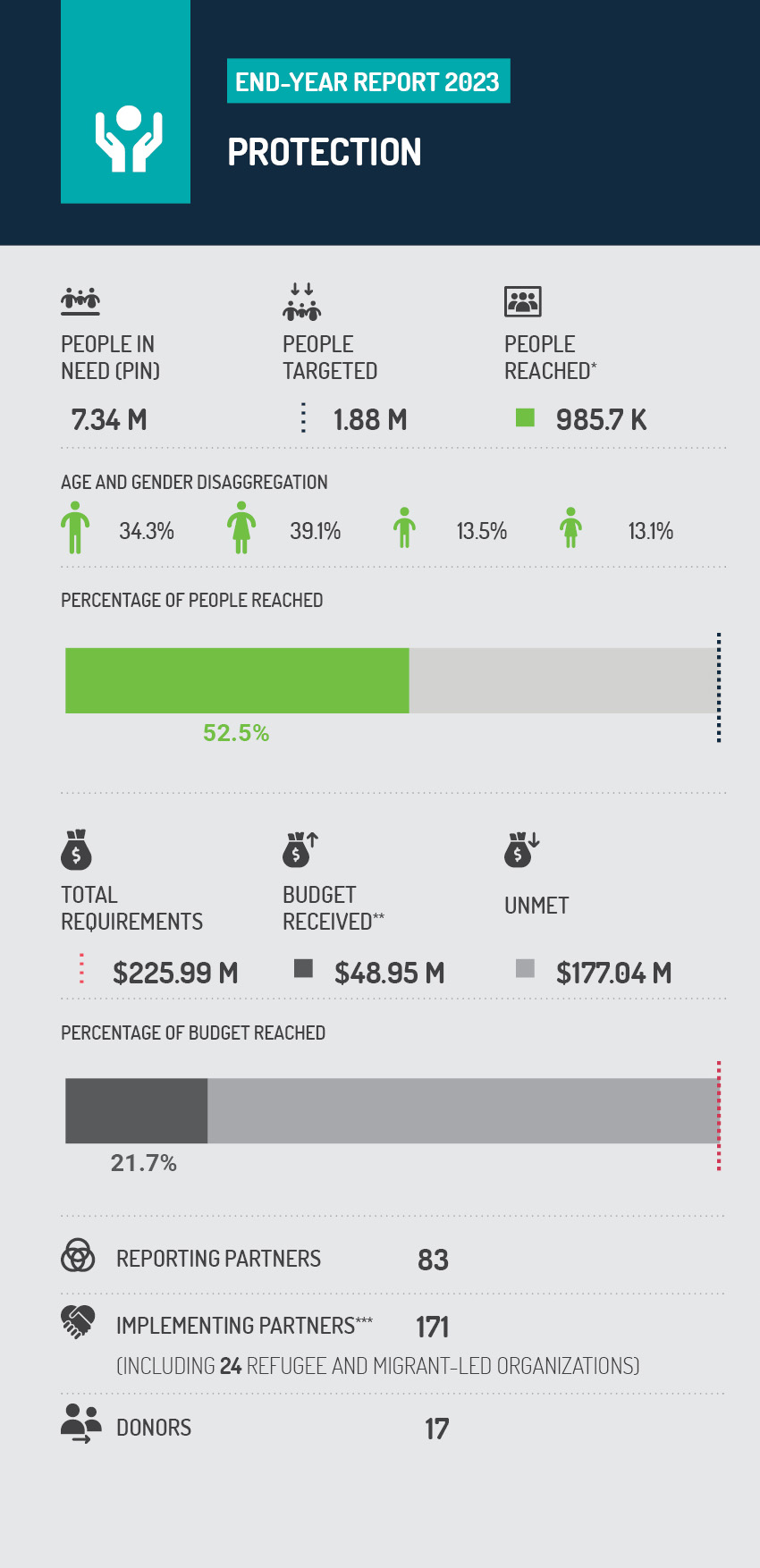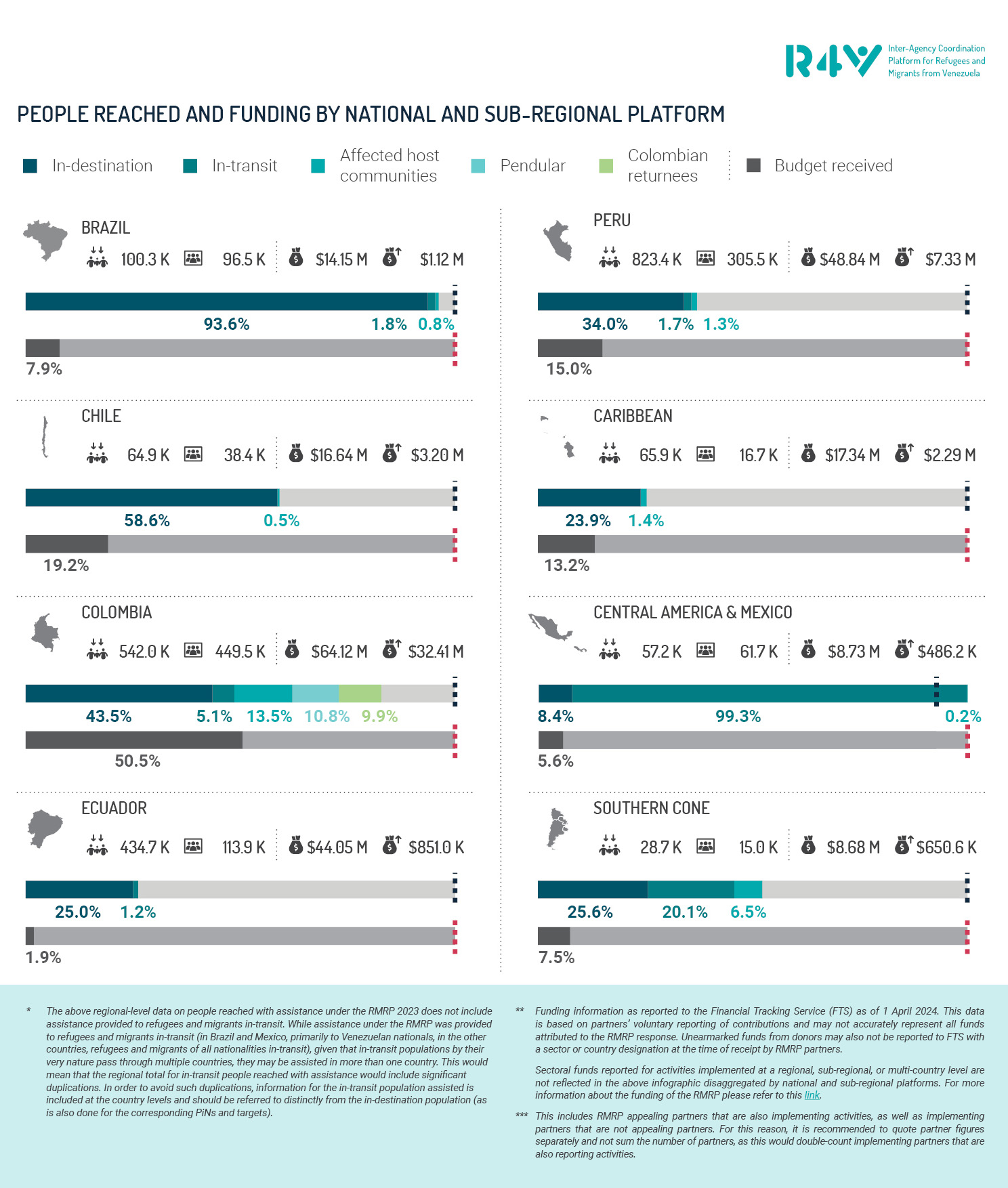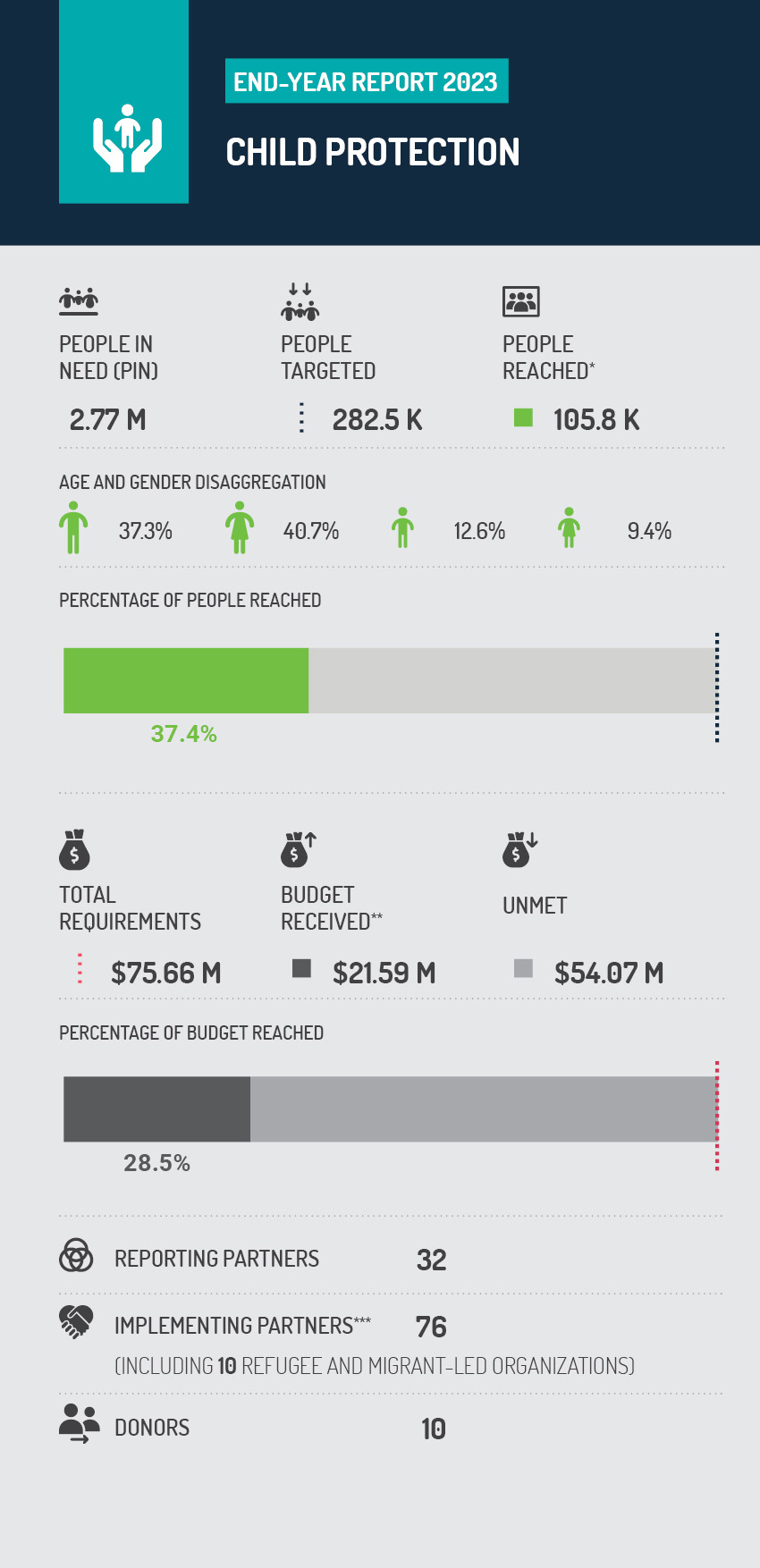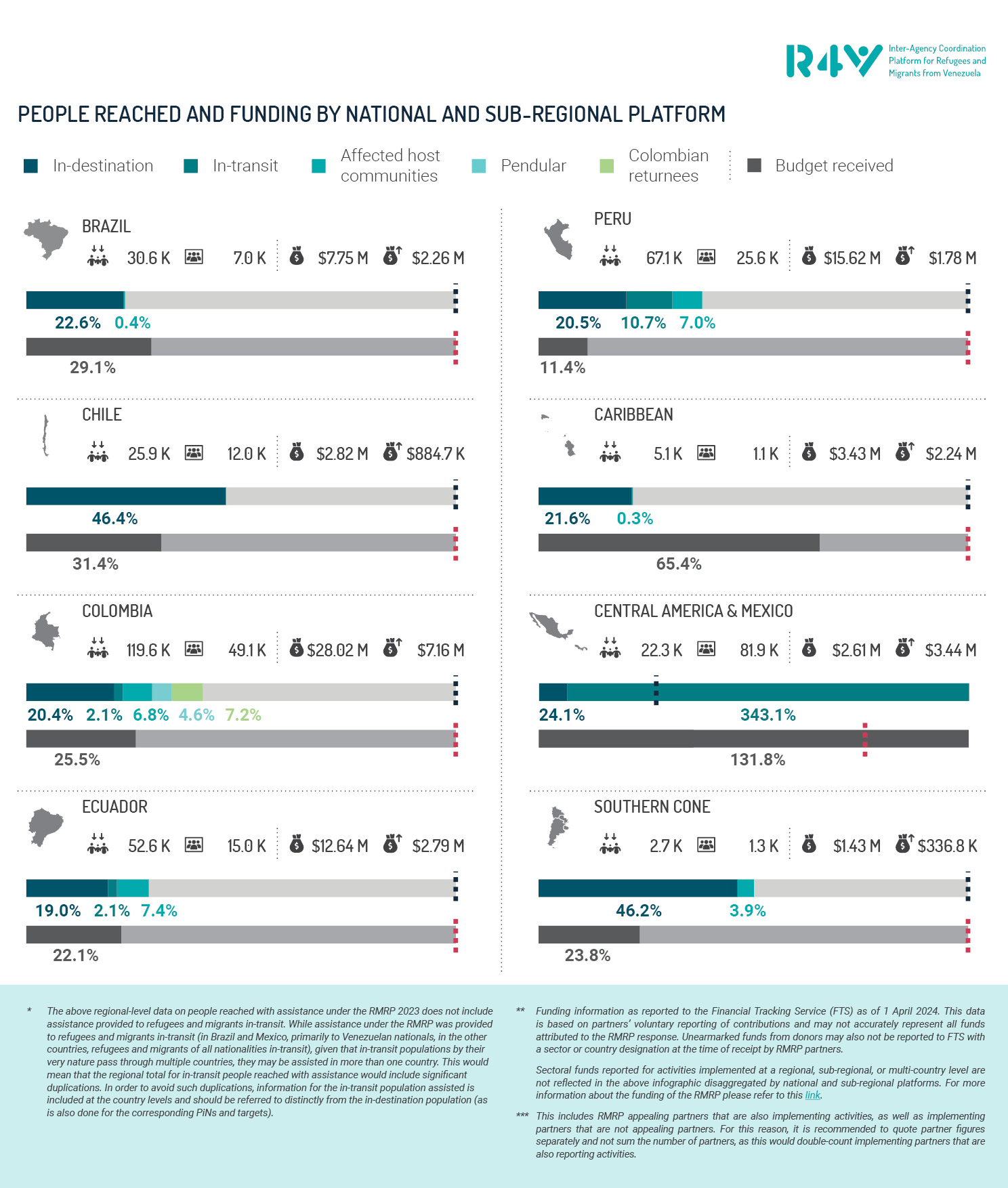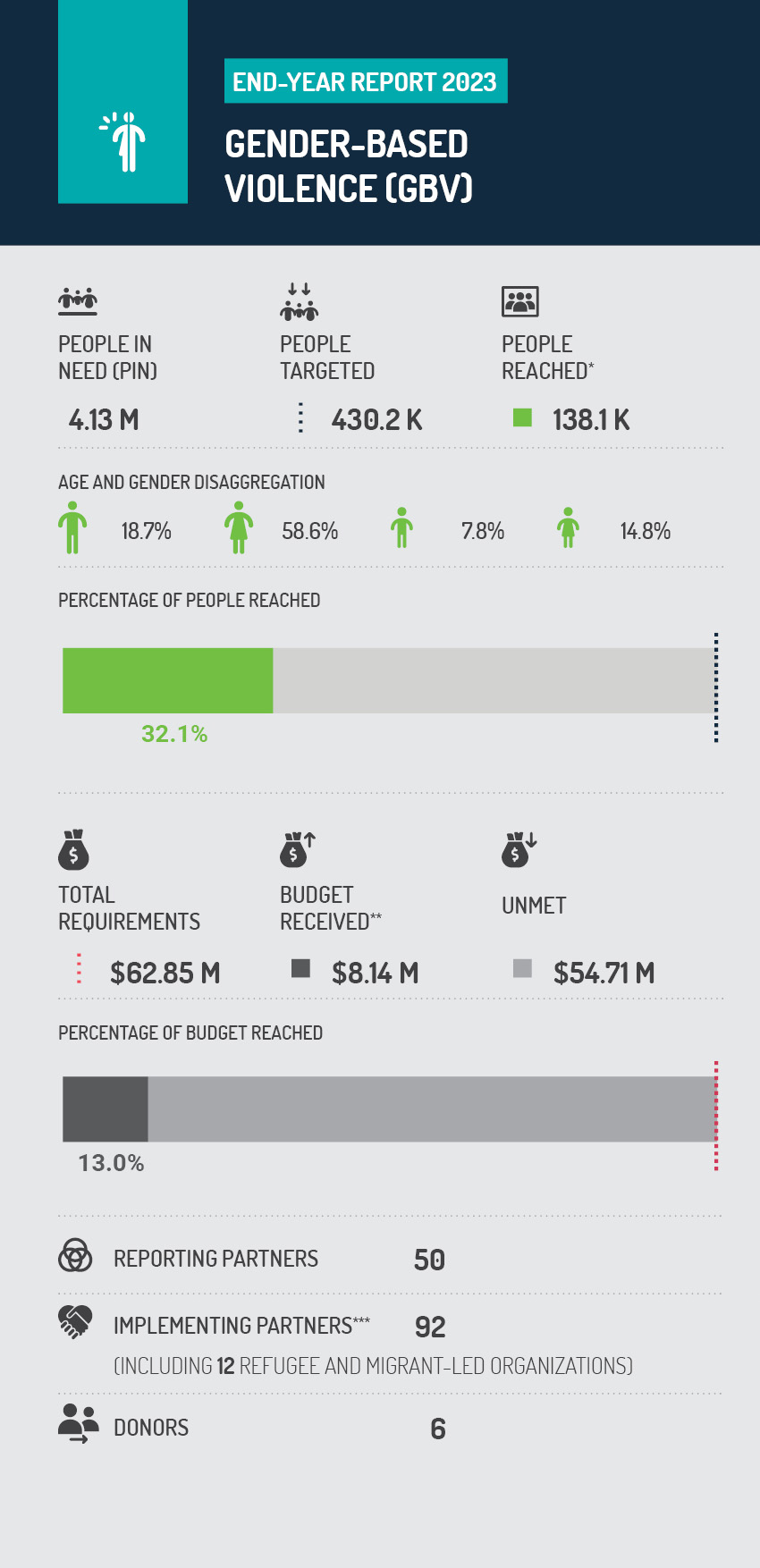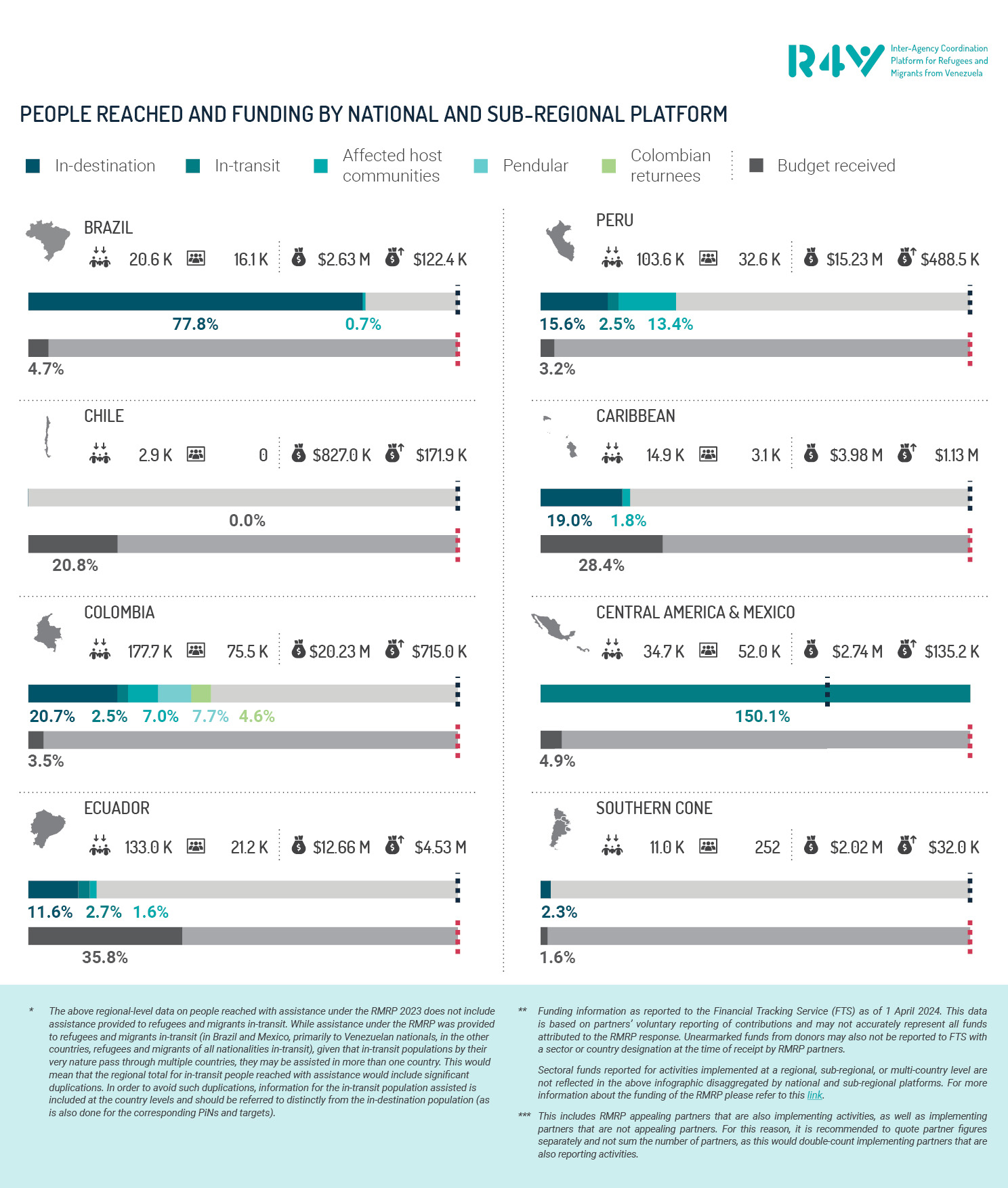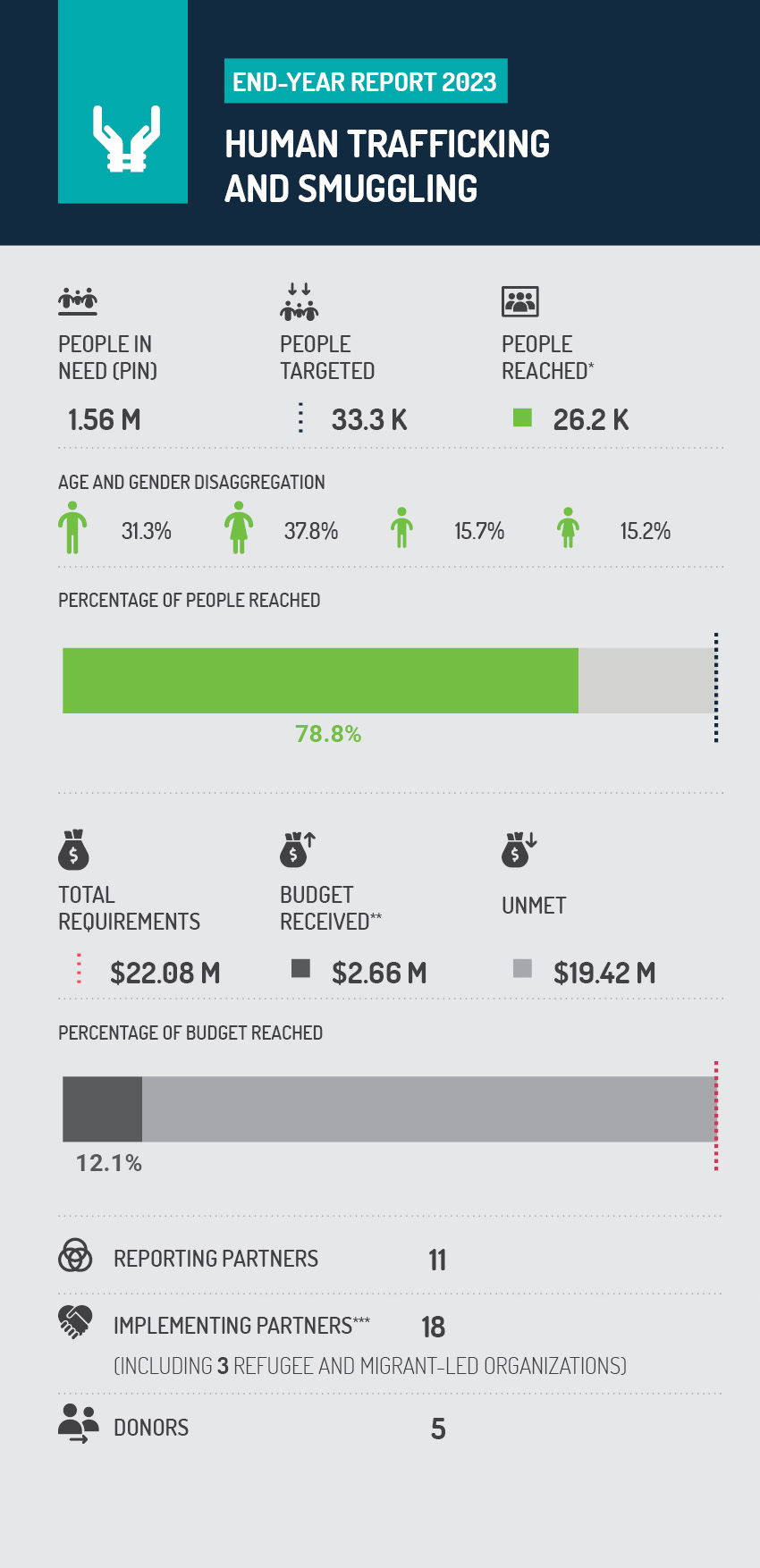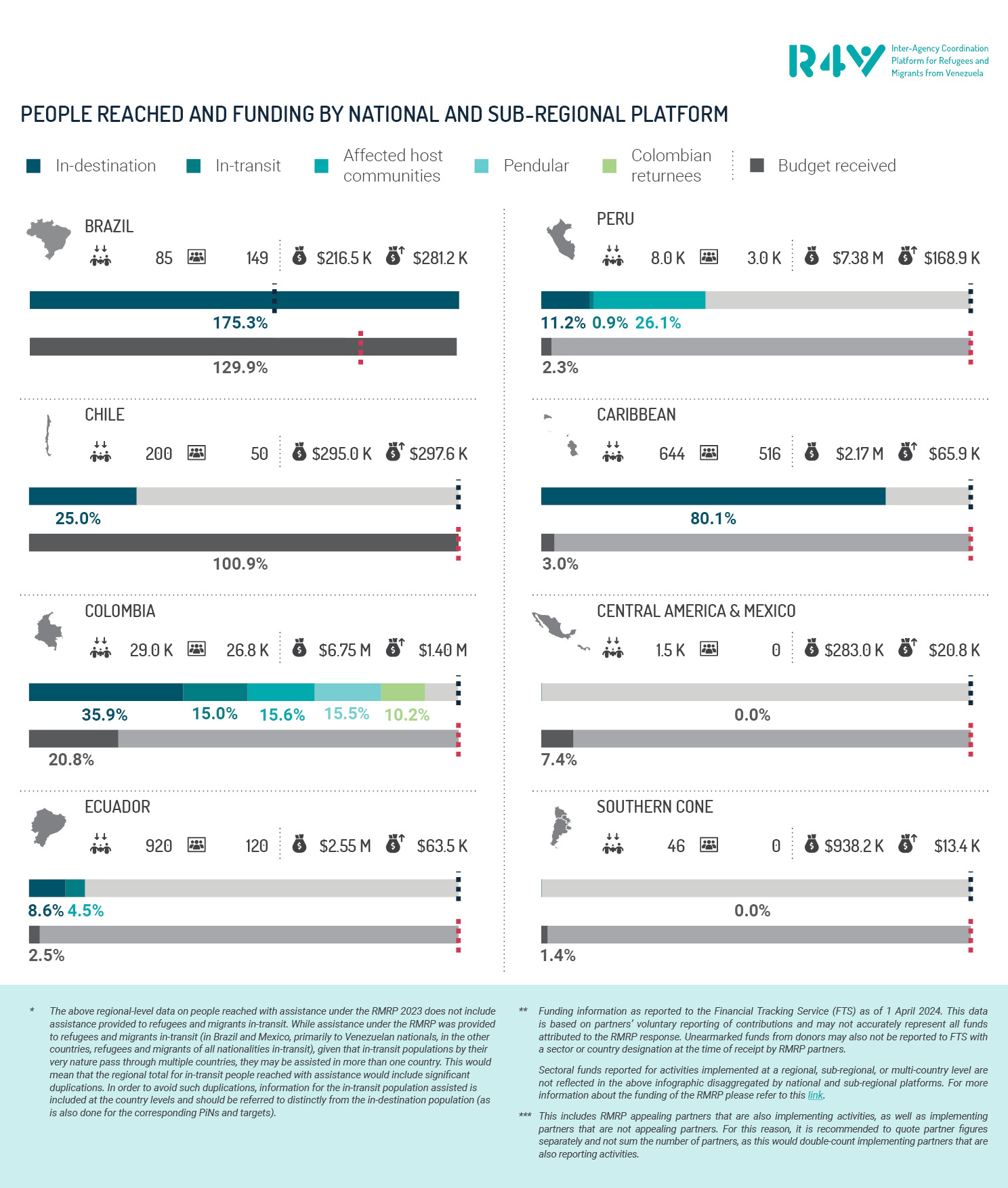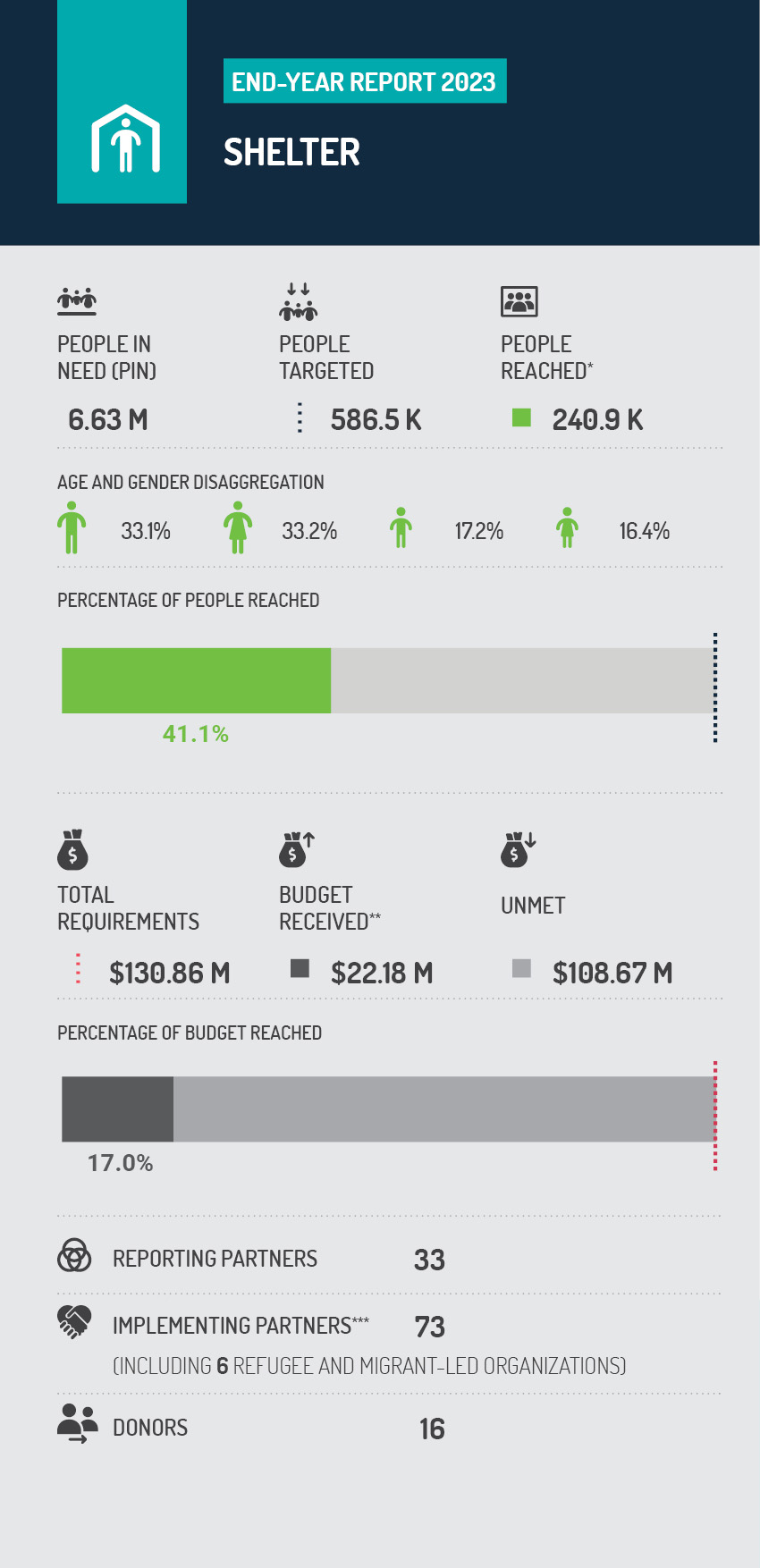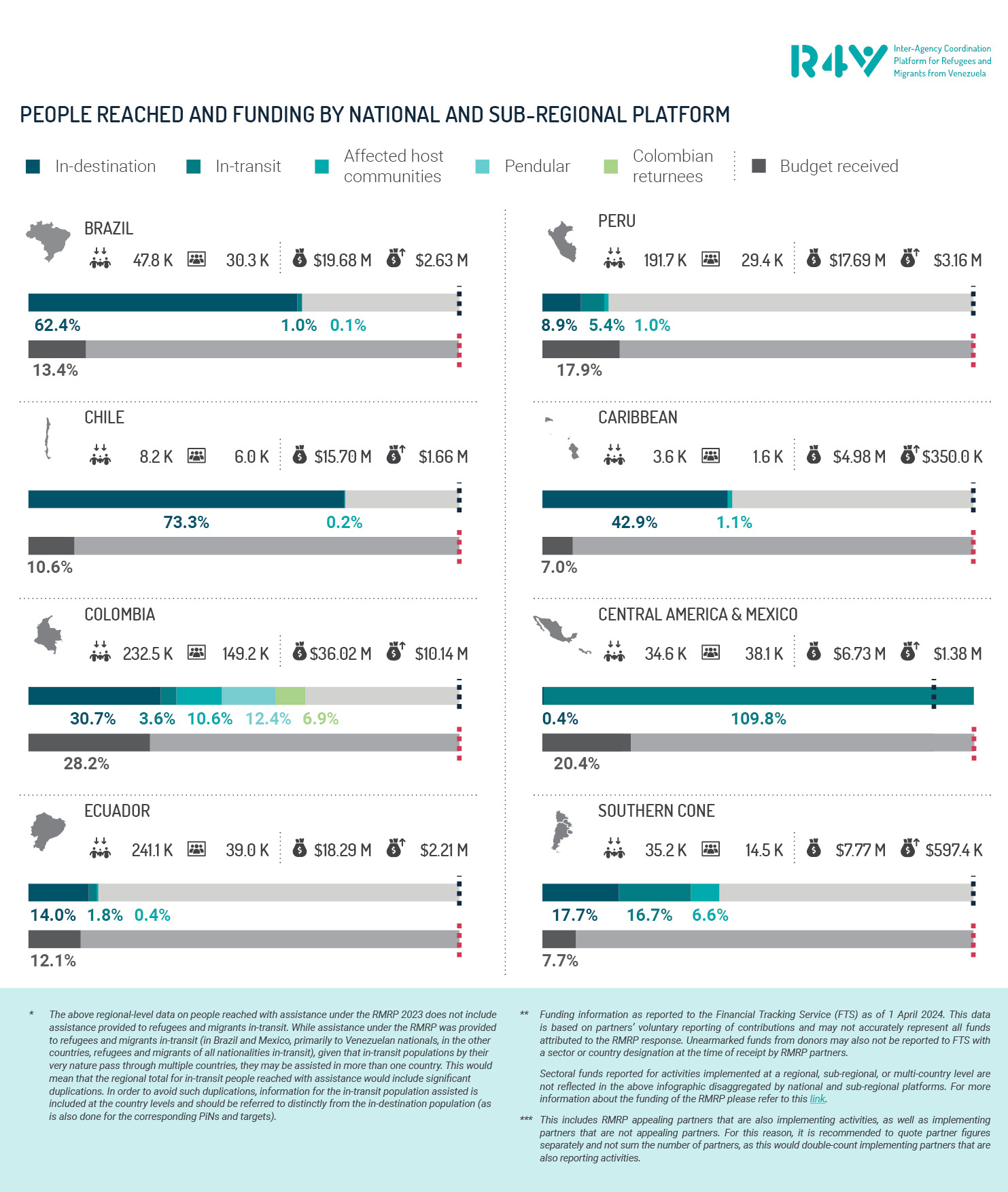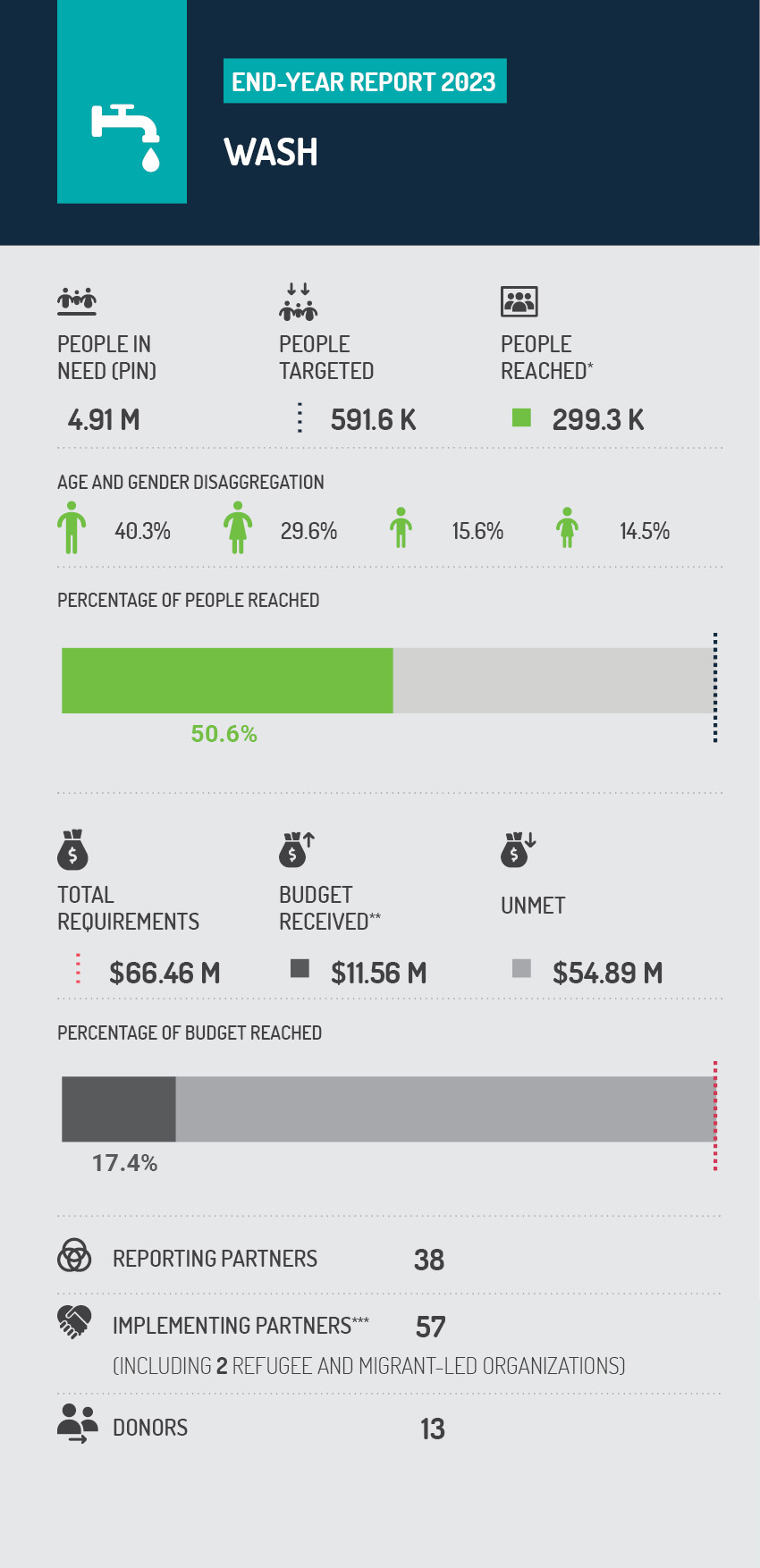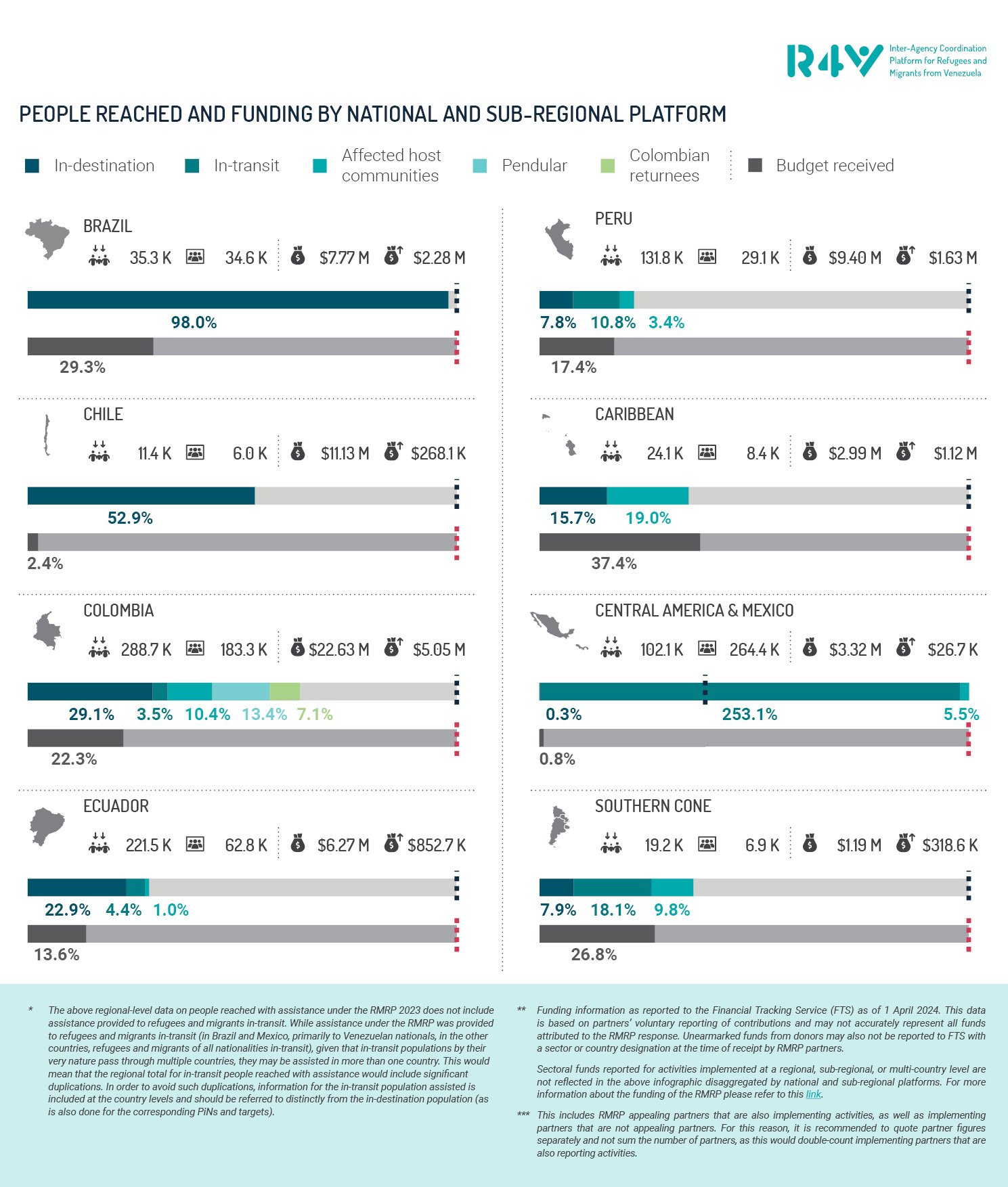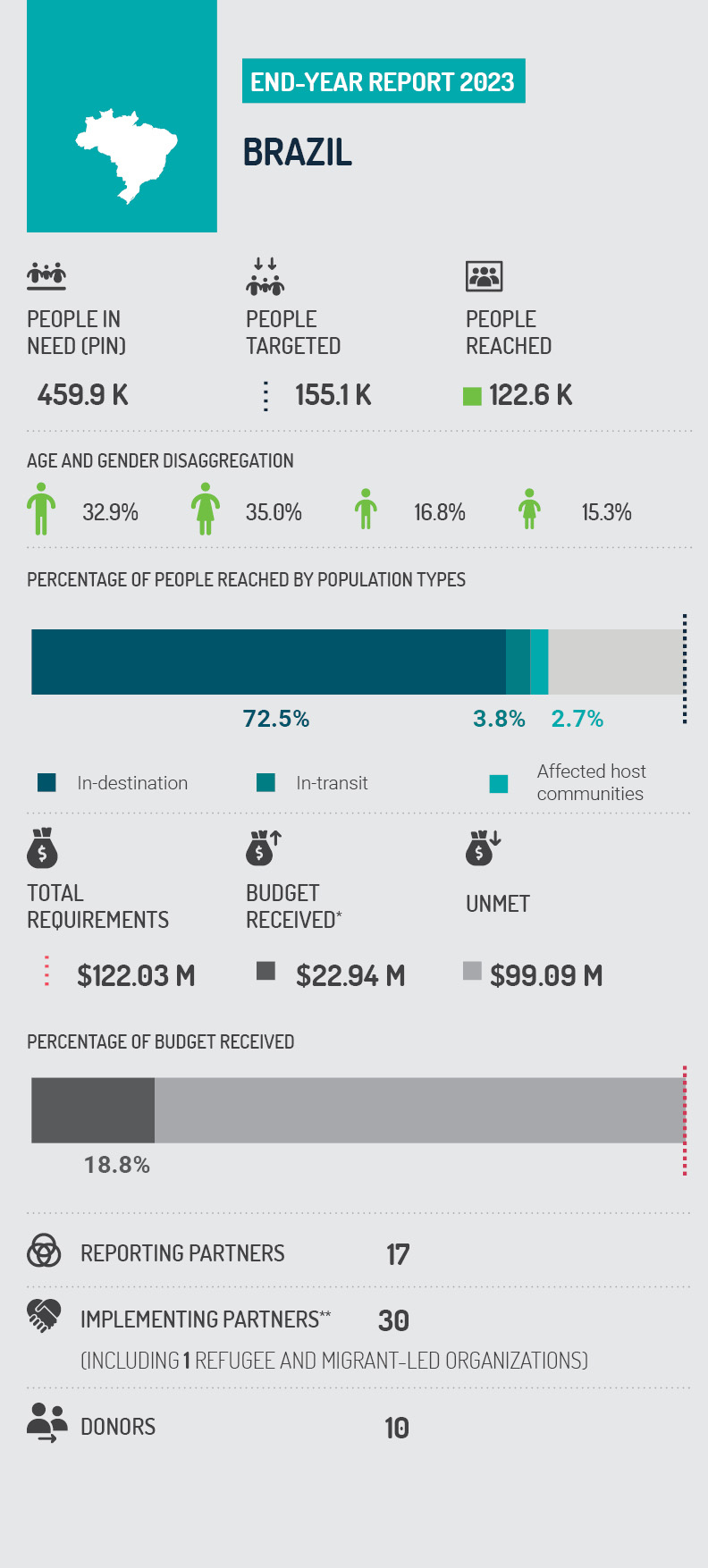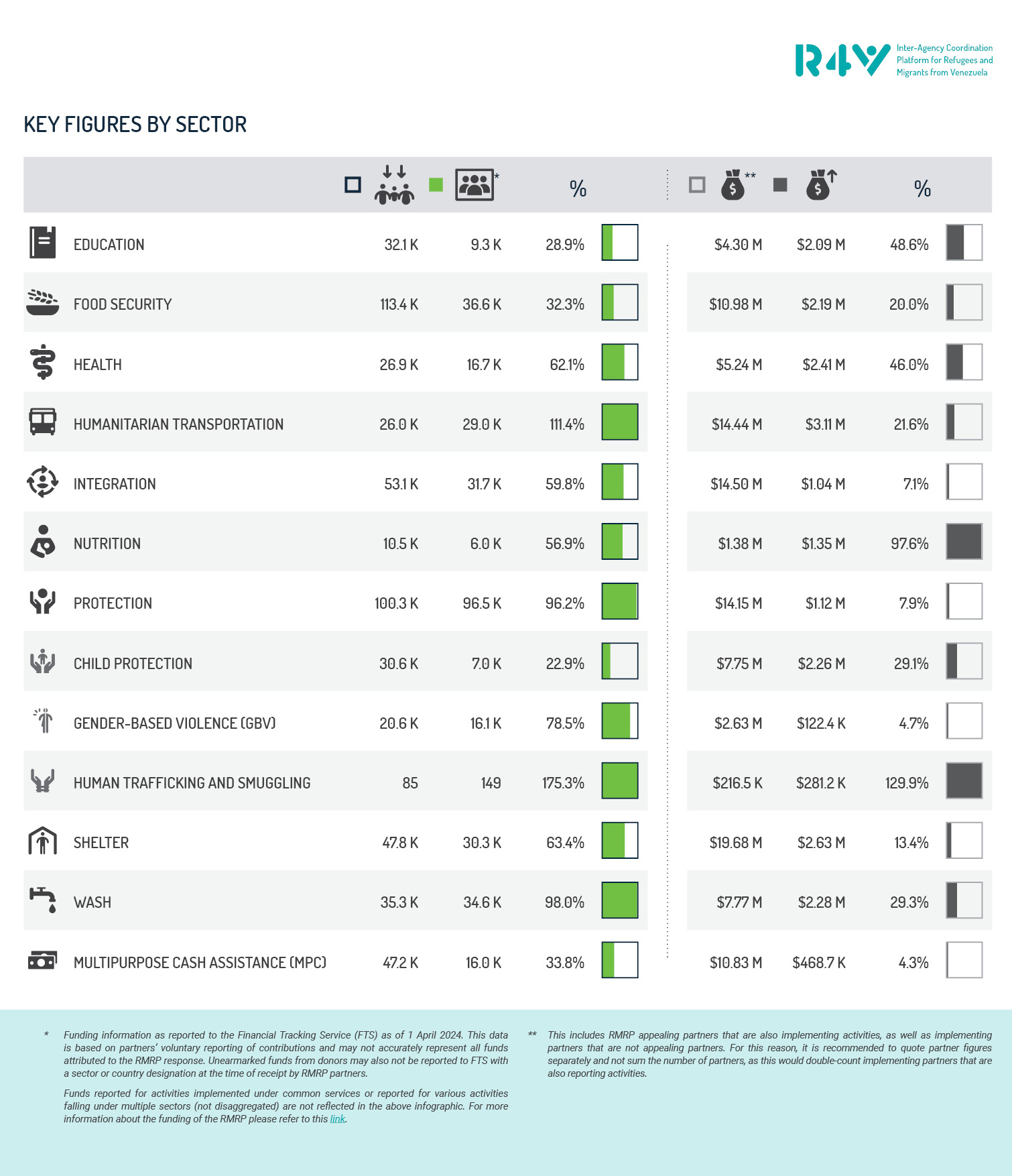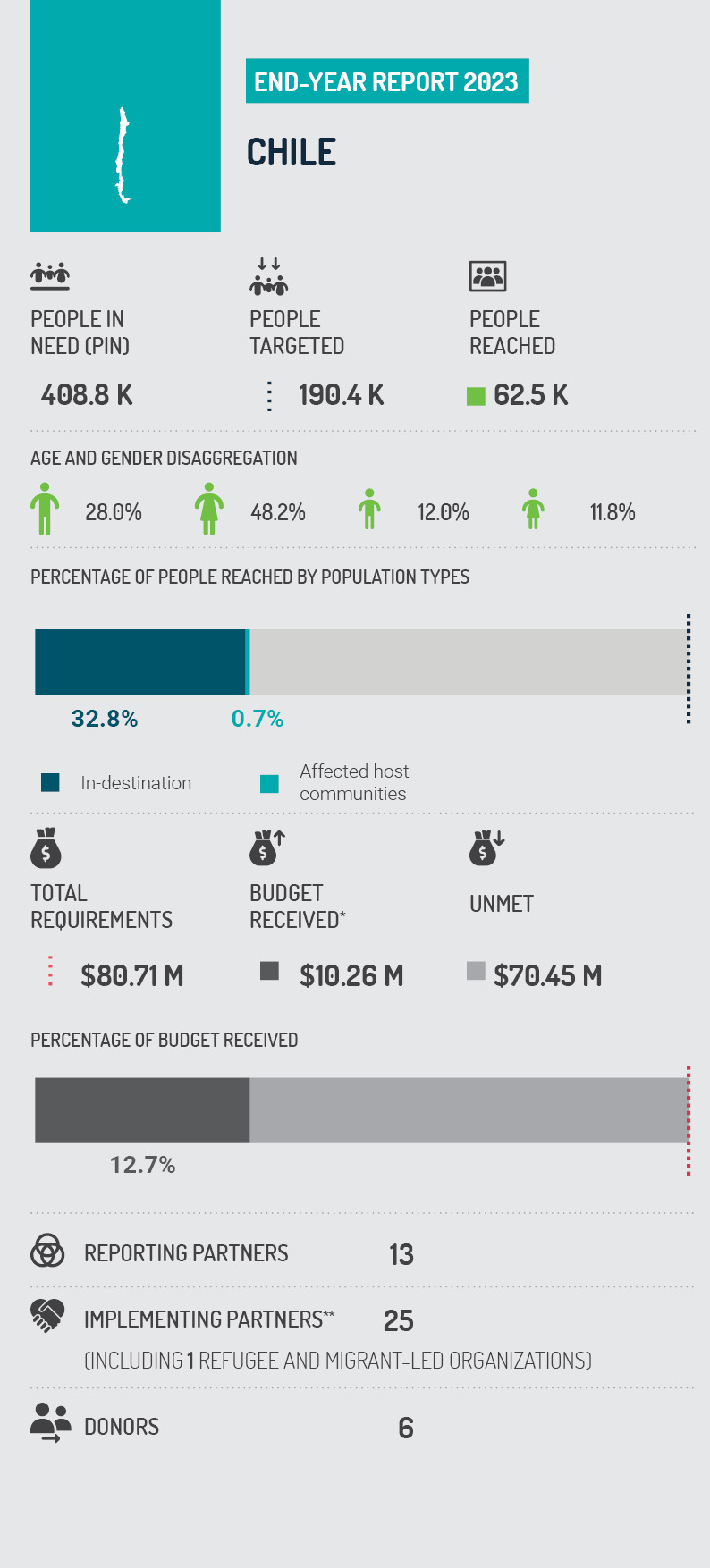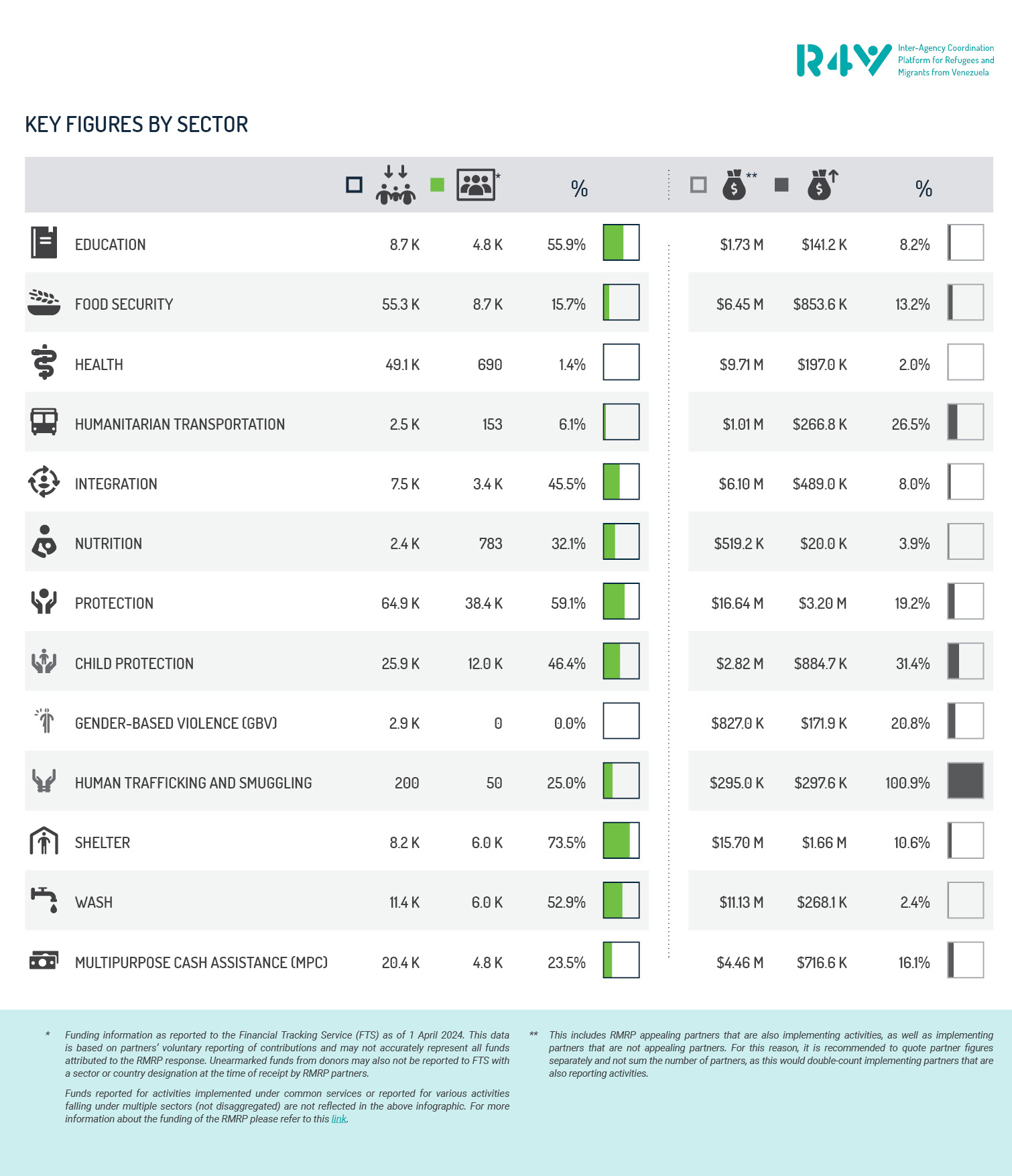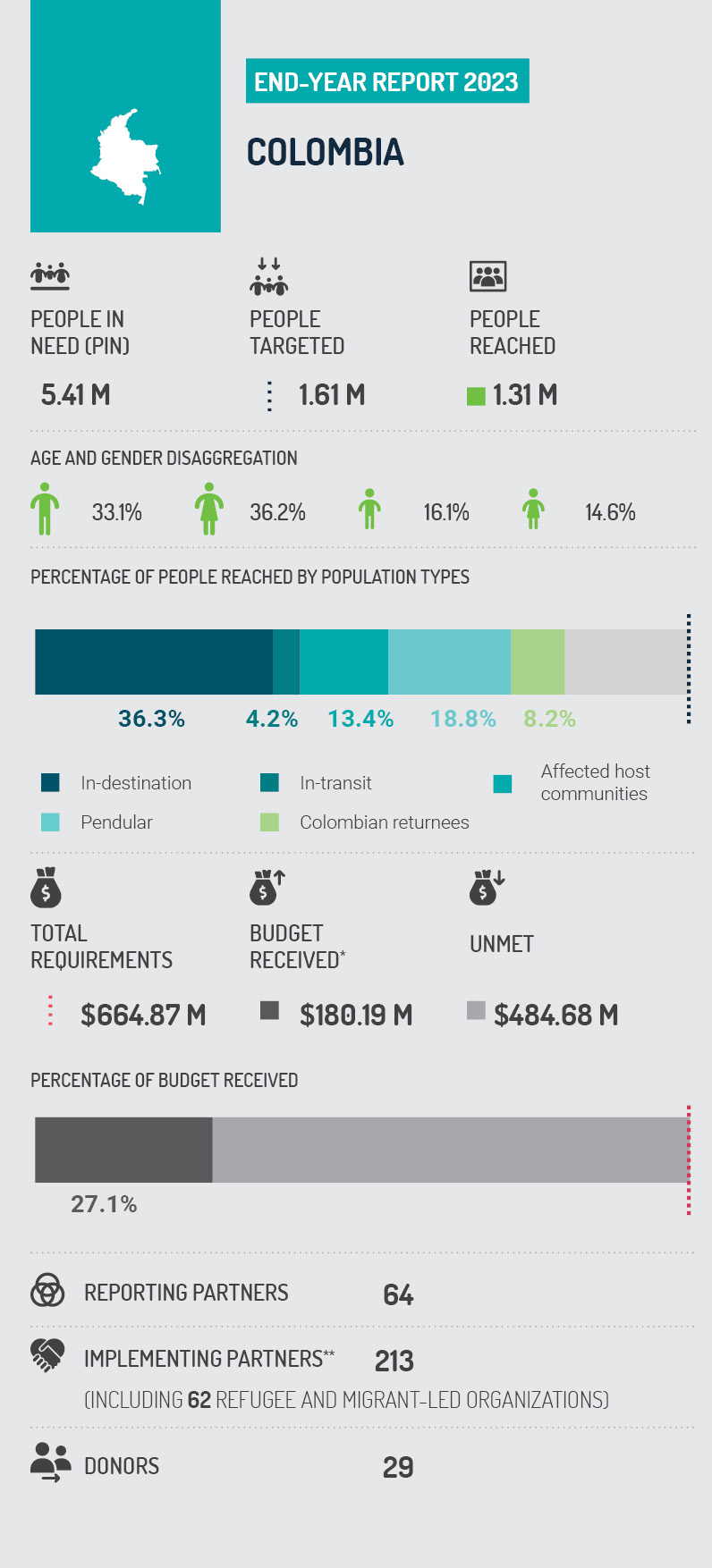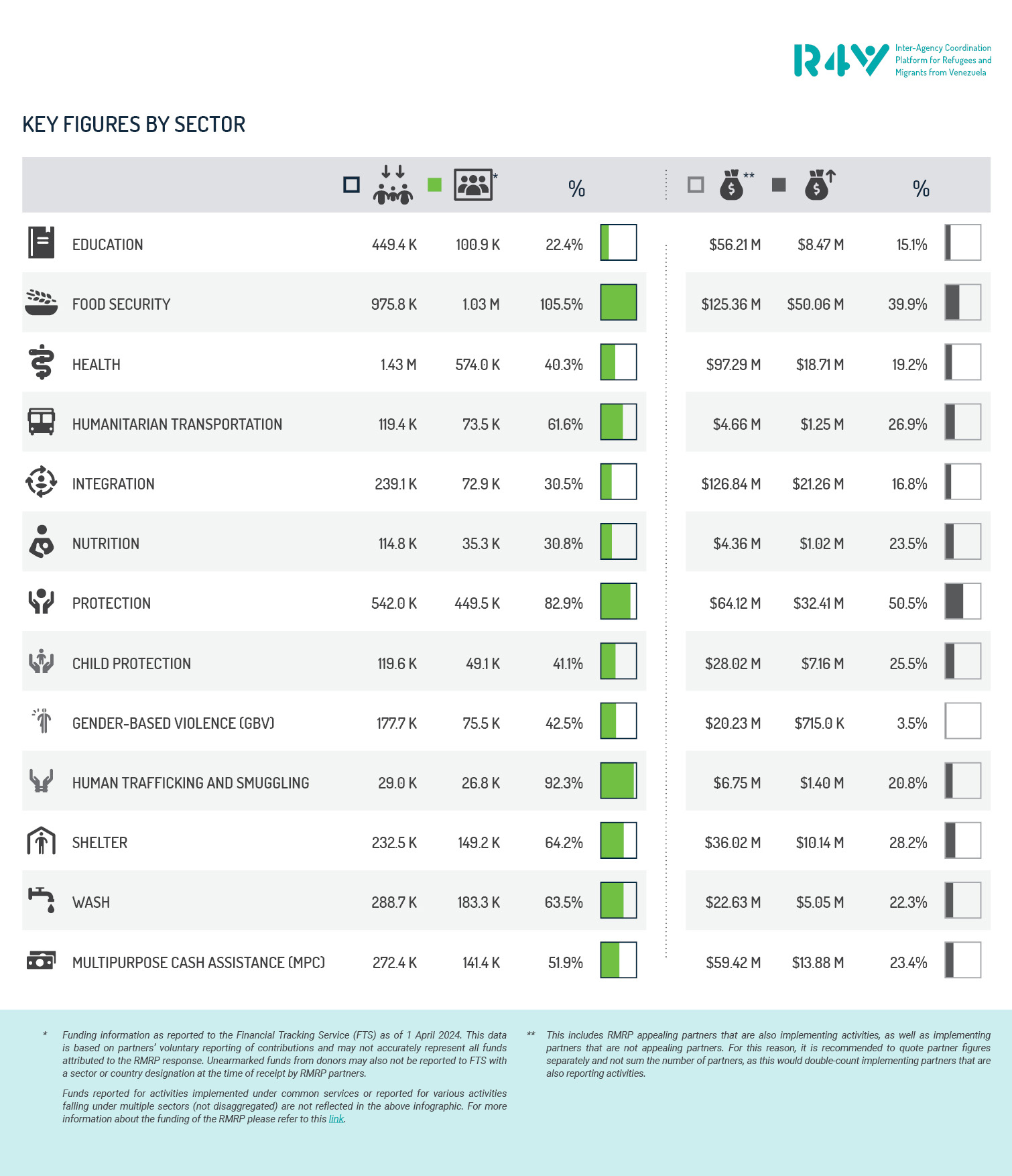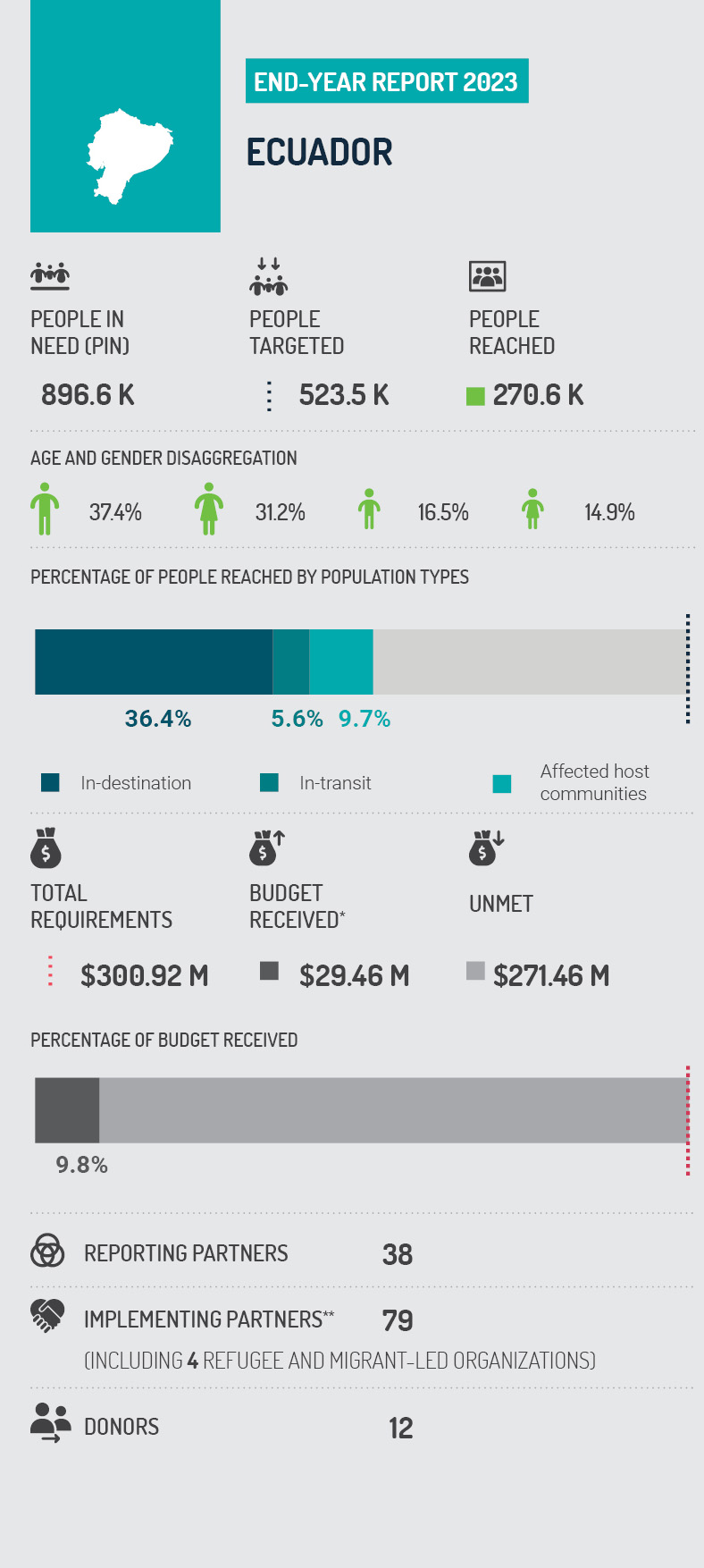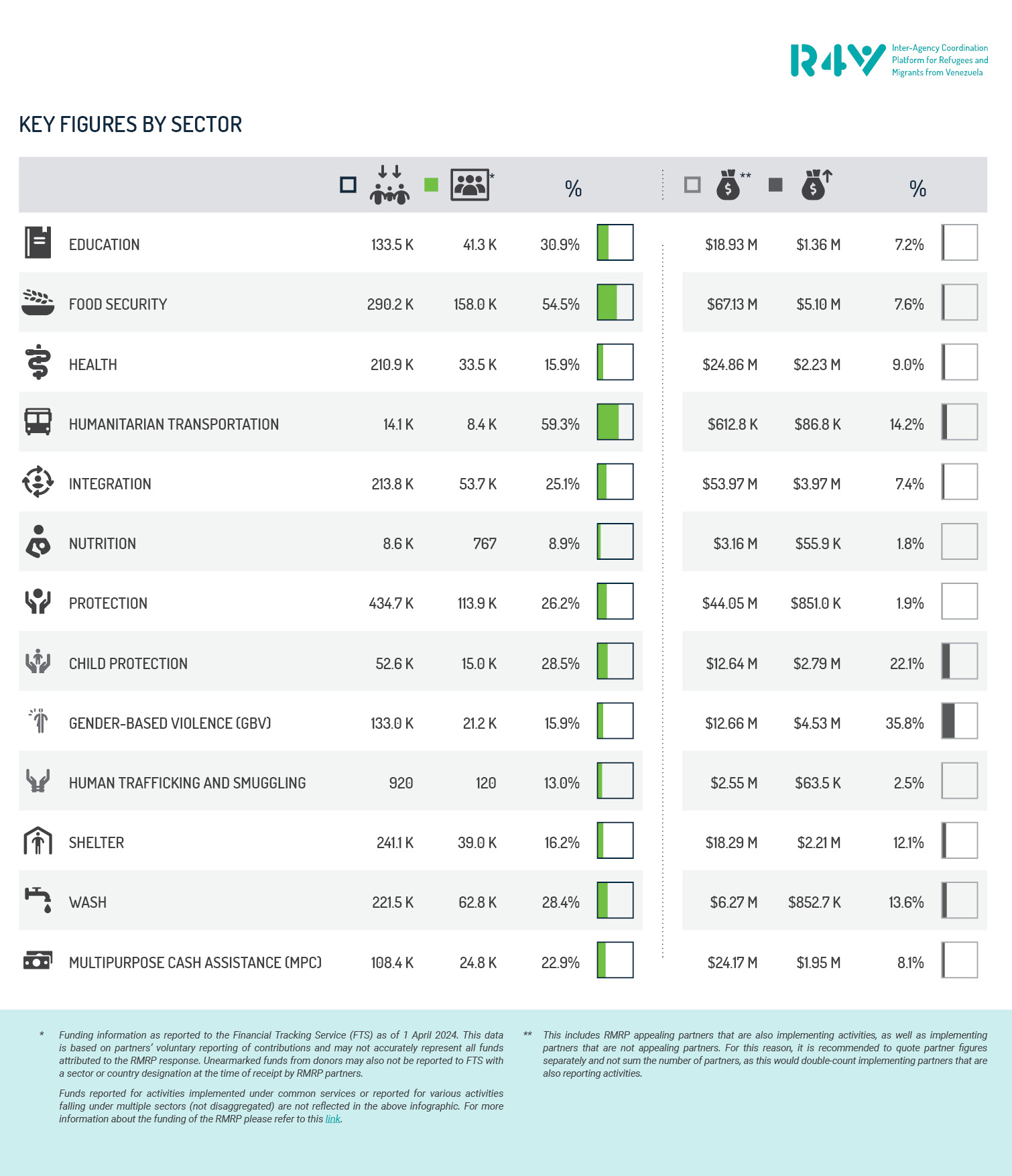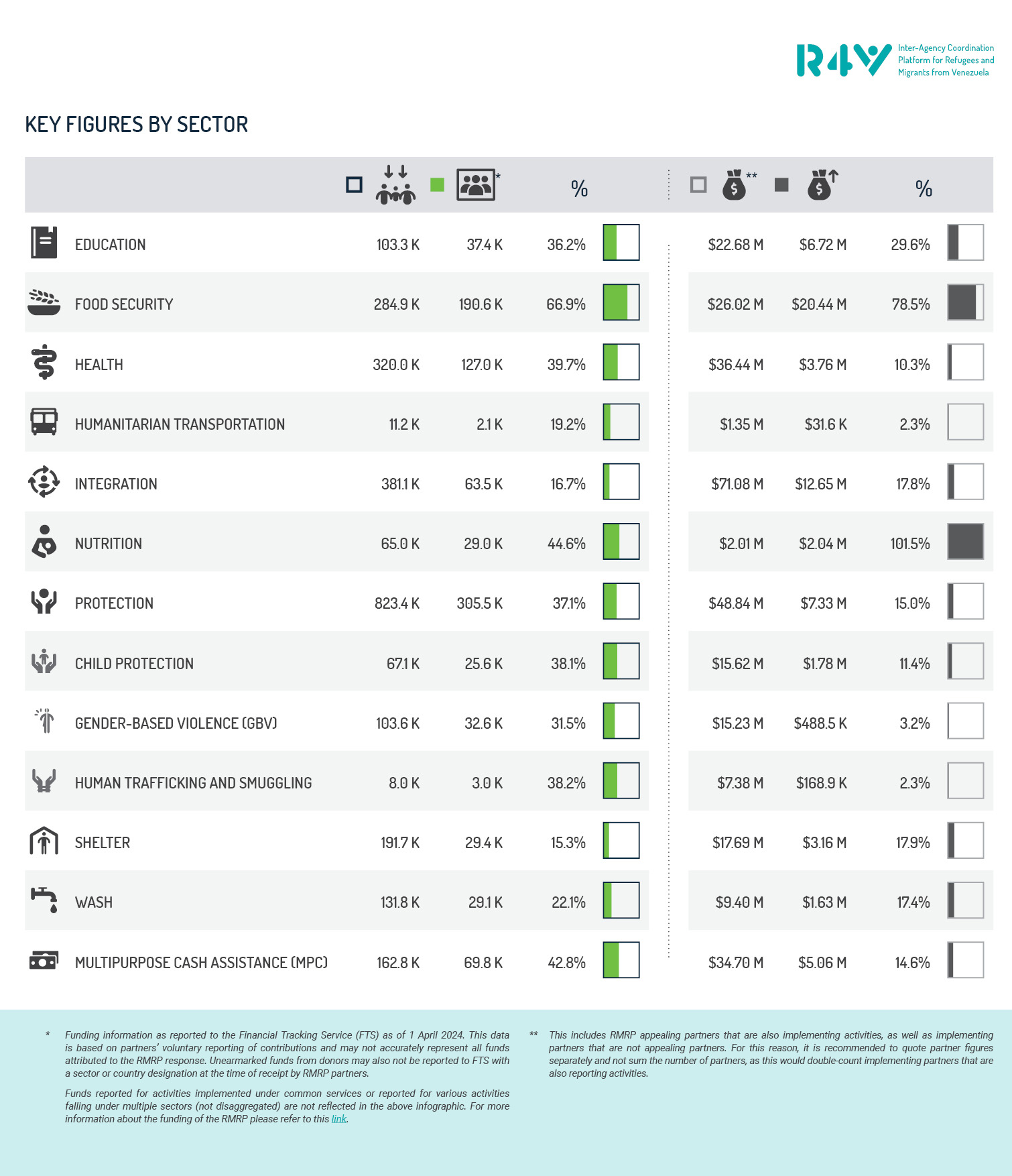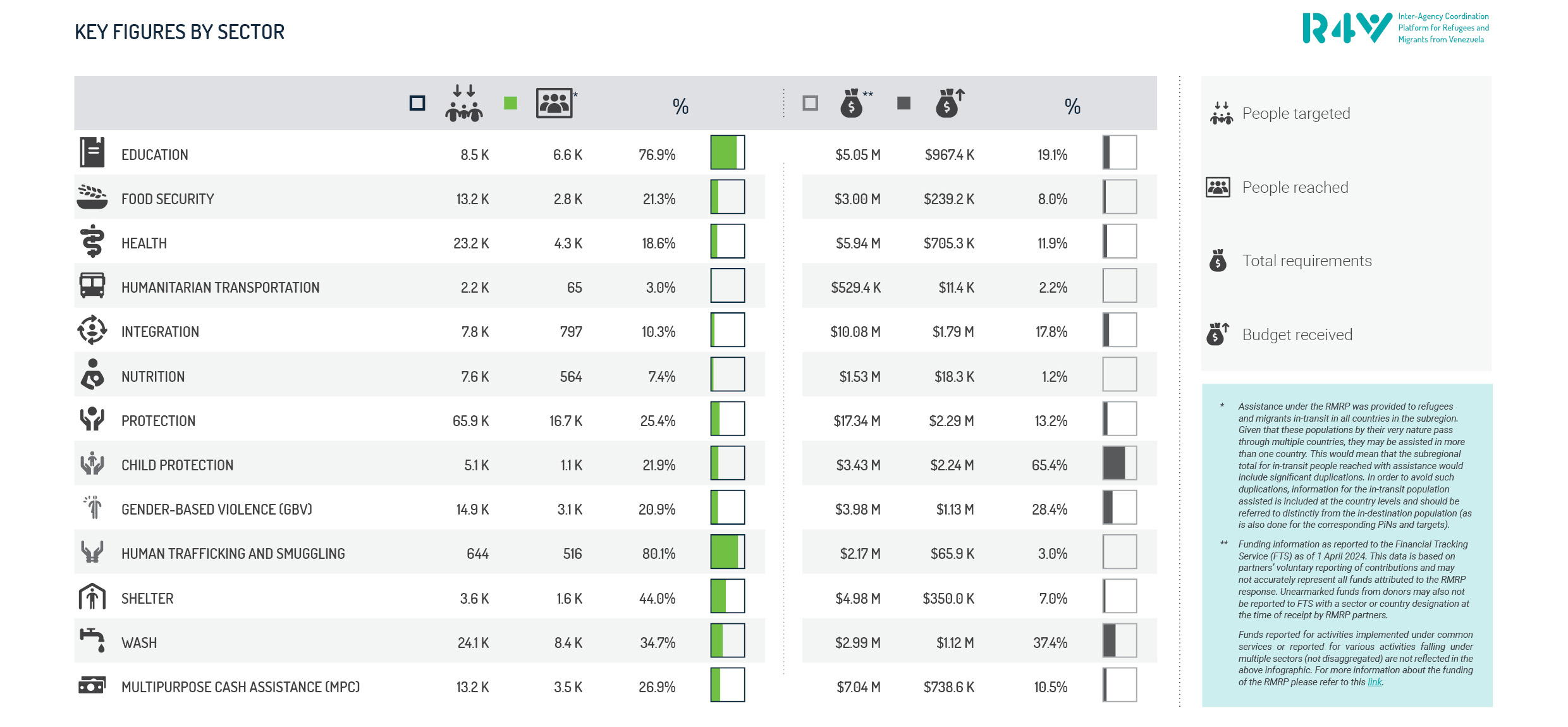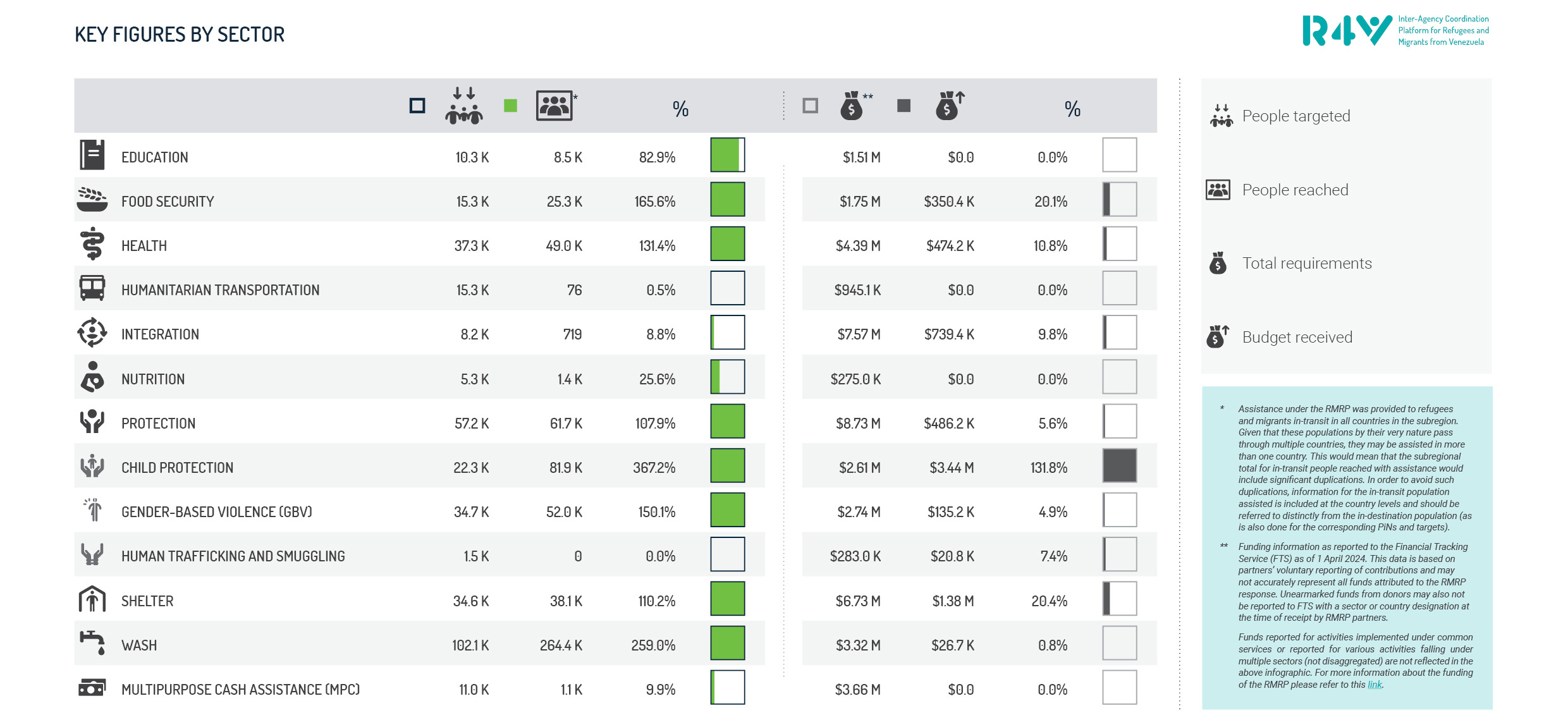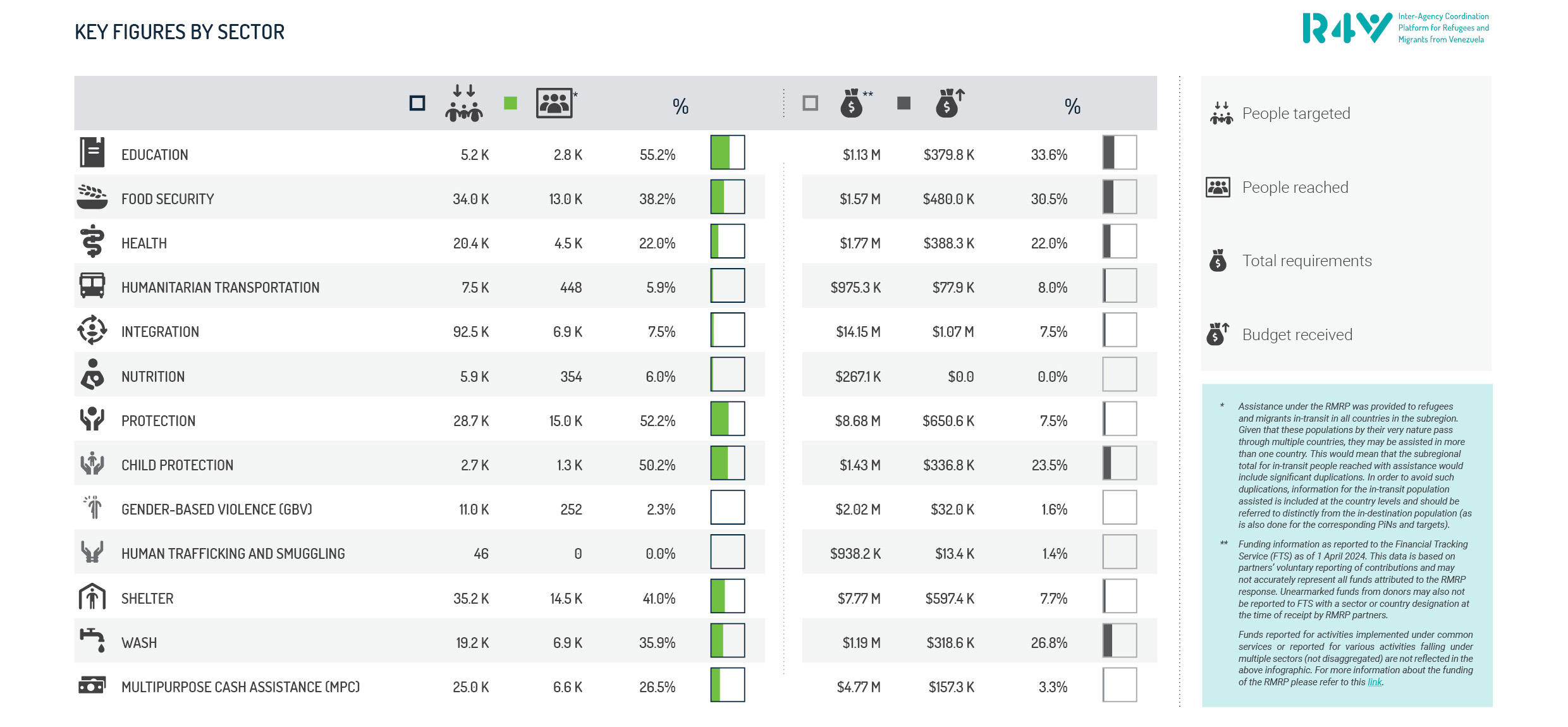RMRP 2023 END-YEAR REPORT
results of THE implementation of the rmrp 2023
PEOPLE REACHED
In 2023, R4V partners reached some 2.18 million people, including refugees, migrants and affected host community members, with some form of assistance under the Regional Refugee and Migrant Response Plan (RMRP). This achievement was accomplished through the collaboration of 132 partner organizations and 408 implementing partners, representing UN agencies, NGOs, international financial institutions, academia and civil society organizations operating across 17 countries in Latin America and the Caribbean (LAC).
Among them were 43 Venezuelan refugee and migrant-led organizations. Overall, the number of refugee- and migrant-led organizations participating in the R4V response as appealing partners, rose from 46 in the RMRP 2023 to 65 in the RMRP 2024 Update.
Click on a country and/or sector in the interactive map below to see RMRP partners’ implementation in 2023.
MONITORING OF THE RMRP 2023
FUNDING OF THE RMRP 2023
Working Groups and Cross-Cutting Themes
Information on R4V, the RMRP and partner organizations
What is R4V?
In April 2018 the UN Secretary-General directed IOM and UNHCR to coordinate the regional response to the situation of refugees and migrants from Venezuela. As a result, the Inter-Agency Coordination Platform for Refugees and Migrants from Venezuela (R4V) was established as a forum to coordinate the response efforts across 17 countries of Latin America and the Caribbean.
What is the RMRP?
The Regional Refugee and Migrant Response Plan (RMRP) was first developed in 2018 as a strategic regional response plan and advocacy tool to support country and sub-regional operations and to ensure the most pressing humanitarian, protection and integration needs of refugees and migrants from Venezuela, as well as those of host communities, were met.
In 2022, the R4V Platform divided the RMRP into two fundamental documents, each with a distinct focus: the Refugee and Migrant Needs Analysis (RMNA), which highlights the needs of refugees and migrants from Venezuela in-destination and in-transit, using primary data collection and secondary data analysis across the region; and the Refugee and Migrant Response Plan (RMRP), which focuses on the operational response priorities, activities, and financial requirements related to the response. In addition, in consultation with host governments, donors, R4V appealing partners, and other stakeholders, and in consideration of the need to better facilitate R4V partner activities across the Humanitarian-Development-Peace Nexus, the R4V Platform transformed the RMRP into a multi-year plan, which also included response activities for refugees and migrants of other nationalities (in addition to Venezuelans) in five out of the seventeen countries covered (six countries, as of 2024). The RMRP 2023-2024 was launched in December 2022.
Subsequently, an update to the RMRP was developed and launched on 6 December 2023. The RMRP 2024 Update accompanies and supersedes the originally planned response for 2024 presented in the multi-year RMRP 2023-2024. It is the result of consultations of 248 partner organizations in the RMRP, as well as host governments, donors, refugees and migrants and host communities throughout the region, to update the planning scenarios originally foreseen for 2024 based on current events and changes in context, and to adjust the response to meet the needs of affected populations as identified through the RMNA 2023.
NATIONAL/SUB-REGIONAL DOWNLOADS
SECTORAL DOWNLOADS
RMRP 2023 partner organizations
ACTED
Action against Hunger
ActionAid
Adventist Development and Relief Agency (ADRA)
Alas de Colibrí Foundation
Alianza por la Solidaridad
Americares Foundation
Apurimac ETS
Argentine Commission for Refugees and Migrants (CAREF)
ASBRAD – Associação Brasileira de Defesa da Mulher da Infância e da Juventude
Asociación Aves
Asociación Civil El Paso
Asociación Civil Lluvia Arcoiris
Asociación de Ciudadanos Migrantes Por Venezuela
Asociación de Venezolanos en Eloy Alfaro
Asociación de Venezolanos en la Cordillera Central
Asociación de Venezolanos en México
Asociación de Venezolanos Organizados en el Exterior
Asociación de Venezolanos y Refugiados en el Estado de Amazonas
Asociación Misioneros de San Carlos Scalabrinianos
Asociación Mujeres Positivas Activas
Asociacion Proteccion Poblacion Vulnerable
Asociación Quinta Ola
Asociación Venezuela en Ecuador AC
Associação Hermanitos
AVSI Foundation
Banho de Cidadania – Recife
Blumont
CARE
Caribbean Centre for Human Rights
Caritas Bolivia
Caritas Brazil
Caritas Chile
Caritas Ecuador
Caritas Germany
Caritas Manaus
Caritas Parana
Caritas Peru
Caritas Rio de Janeiro
Caritas São Paulo
Caritas Switzerland
Caritas Willemstad
Catholic Commission for Social Justice/Archdiocese’s Ministry For Migrant And Refugees
Cayetano Heredia University
CCEFIRO Association
CEDRO
Center for Integrated Studies and Programs for Sustainable Development (CIEDS)
Centro de Atencion Psicosocial (CAPS)
Centro de Desarrollo Humano
CESAL
ChildFund International
CHS Alternativo
City of Knowledge
Coalición por Venezuela
Colonia Foundation of Venezuelans in the Dominican Republic (FUNCOVERD)
Comisión Episcopal de la Pastoral de Migrantes e Itinerantes
Compassiva
Compromiso Migrante
Consejo Interreligioso del Perú – Religiones por la Paz
Consorcio de Org. Privadas de promoción al desarrollo de la micro y pequeña empresa
COOPI – International Cooperation Foundation
Corporación Alianza Humanitaria Tricolor
Corporación Colectivo Sin Fronteras
Corporación de Desarrollo de Ambato y Tungurahua
Corporación Dios nos Brinda una Segunda Oportunidad
Corporación Red Mujeres Feministas Unidas por los Derechos y la Acción Política-Mujer,Denuncia y Muévete
CPUED
CRISFE Foundation
Cuso International
Danielle’s Children Fund (DCF)
Danish Refugee Council (DRC)
De Pana Que Sí
Development and Self-Management Center
Development Support Association – APOYAR
Diakonie Katastrophenhilfe
Diálogo Diverso
Doctors of the World
Dominican Institute for Integrated Development
Duendes y Ángeles Vinotinto República Dominicana
Educational Foundation Rada
Encuentros SJS (Servicio Jesuita de la Solidaridad)
Ending Violence Against Migrants
Foro Salud Callao
Foundation for the Integration and Development of Latin America (FIDAL)
Foundation of the Americas (FUDELA)
Fraternity – International Humanitarian Federation
Fraternity Without Borders
Fundación Activados Panamá
Fundación Aires de Esperanza
Fundación Alianzas Solidarias
Fundación Brisas del Norte
Fundación Cultural Simón Bolívar
Fundación Espacio Creativo
Fundación Esquel
Fundación Haciendo Panas
Fundación Humano y Libre
Fundación Manos Venezolanas
Fundación MUEVE
Fundación Mujer & Mujer
Fundación Operación Libertad Internacional
Fundación Pro-Integración Inclusión y Participación
Fundación Quimera
Fundación RadaBer
Fundación Scalabrini Bolivia
Fundación Sin Frontera Manizales
Fundación Venezolanos en San Cristóbal
Fundación Venezuela & Colombia
German Development Cooperation Agency GIZ
Globalizate Radio
GOAL
Halü Bienestar Humano Foundation (HALU)
Heartland Alliance International (HAI)
HELVETAS Swiss Intercooperation
HIAS
Human Rights Defence Curaçao
Humanity & Inclusion
Idas y Vueltas Association
IEB – Instituto Internacional de Educação do Brasil
iMMAP Inc.
IMPACT Initiatives (REACH)
INCAMI – Instituto Católico Chileno de Migración
Inmigrante Feliz Association
INPPARES
Institute for Migration and Human Rights (IMDH)
Institute of Natural and Cultural Heritage (IPANC)
Instituto de Democracia y Derechos Humanos – Pontificia Universidad Católica del Perú
Instituto de Promoción del Desarrollo Solidario
International Committee for the Development of People (CISP)
International Federation of the Red Cross (IFRC)
International Labour Organization (ILO)
International Organization for Migration (IOM)
International Rescue Committee (IRC)
INTERSOS
IsraAID
Jesuit Migrant Service (JMS)
Jesuit Refugee Service (JRS)
Jesuit Service for Migrants and Refugees (JSMR)
Joint United Nations Programme on HIV/AIDS (UNAIDS)
Kimirina Coorporation
La Casita Hispanic Cultural Centre
Las Reinas Pepiadas
Living Water Community
LLANOVENCOL
Lunita Lunera Foundation
Lutheran World Federation
Lutheran World Relief
MAG-The Bay
Malteser International
Mana Institute
Manos Veneguayas Association
Más Igualdad Perú
MedGlobal
Medical Teams International
Mercy Corps
Migrant Service Center (CAM)
Mirares
Mision Scalabriniana – Ecuador
Missão Paz
Munasim Kullakita Foundation
Museu A CASA
Norwegian Refugee Council (NRC)
OCASIVEN
ONG Migrantes por el Maule
OXFAM
Panamerican and Caribbean Union for Human Rights
Panamerican Development Foundation
Panamerican Health Organization/World Health Organization (PAHO/WHO)
Partners in Health
Pastoral Service for Migrants National
Permanent Human Rights defense Committee (CDH)
Plan International
Plataforma de Personas que Ejercen Trabajo Sexual
Population Program, Faculty of Social Sciences, University of the Republic
Profamilia Association
Programa de Soporte a la autoayuda de personas seropositivas
Rape Crisis Society of Trinidad and Tobago
Red Cross Argentina
Red Cross Bolivia
Red Cross Colombia
Red Cross Ecuador
Red Cross Peru
Red de Investigaciones en Derechos Humanos – CONICET (Consejo Nacional de Investigaciones Científicas y Técnicas)
Refúgio 343
RET International
Ronald McDonald House
Salú pa Tur Foundation
Salvation Army
Samaritan’s Purse
Save the Children International (SCI)
Sección Peruana de Amnistía Internacional
Serviço Pastoral dos Migrantes do Nordeste
Sesame Workshop
Si, Da Vida
Social Assistance Foundation of the Christian Churches (FASIC)
Solidarités International
Solidarity and Action Asociation
SOS Children’s Villages
Takuna Foundation
Tarabita Foundation
TECHO
Terranueva Foundation
Terre des Hommes Suisse
The Heroes Foundation
Unión Venezolana en Perú
United Nations Children’s Fund (UNICEF)
United Nations Development Programme (UNDP)
United Nations Educational, Scientific and Cultural Organization (UNESCO)
United Nations Entity for Gender Equality and the Empowerment of Women (UNWOMEN)
United Nations Food and Agricultural Organization (FAO)
United Nations High Commissioner for Refugees (UNHCR)
United Nations Office of the High Commissioner for Human Rights (OHCHR)
United Nations Office on Drugs and Crime (UNODC)
United Nations Population Fund (UNFPA)
United Nations Programme for Human Settlements (UN Habitat)
UruVene
Vale da Benção Educational and Charitable Association (AEBVB)
VeneAruba Solidaria
Venex Curaçao Foundation
Venezuelan Emigrant Foundation (FEV)
Vicaría de Pastoral Social Caritas
We World GVC
Welcome Venezuela
World Bank
World Council of Credit Unions
World Food Programme (WFP)
World Vision
Young Potential Development Ecuador SA (LAB XXI)
ZOA
Regional Overview
In 2023, R4V partners reached some 2.18 million people, including refugees, migrants and affected host community members, with some form of assistance under the Regional Refugee and Migrant Response Plan (RMRP). This achievement was accomplished through the collaboration of 132 partner organizations and 408 implementing partners, representing UN agencies, NGOs, international financial institutions, academia and civil society organizations operating across 17 countries in Latin America and the Caribbean (LAC). Among them were 43 Venezuelan refugee and migrant-led organizations. Overall, the number of refugee- and migrant-led organizations participating in the R4V response as appealing partners, rose from 46 in the RMRP 2023 to 65 in the RMRP 2024 Update.
Five years since the initial Response Plan for Refugees and Migrants from Venezuela in 2019, 7.7 million refugees and migrants from Venezuela are outside their country of origin, with an estimated 6.5 million in the LAC region. As emphasized in the Refugee and Migrant Needs Analysis (RMNA) 2023, 4.42 million Venezuelans in-destination still encounter difficulties accessing basic needs, protection and integration in their host countries. Partners therefore prioritized multisectoral assistance under a humanitarian-development nexus approach, to address both the immediate and longer-term needs of refugee and migrant populations, whether they were, in-transit or in-destination.
Despite the vast majority of refugees and migrants in the region being in a relatively stable situation within a host country, 2023 also saw an unprecedented surge in irregular and multidirectional transit and onward movements, with more refugees and migrants embarking on dangerous journeys to reach new destinations in order to find more sustainable integration solutions. In response to this, assistance provided to those in-transit by R4V partners doubled in comparison to the previous year. This was most notable in Panama, where the number of refugees and migrants (from various nationalities) in-transit reached with some form of assistance multiplied 20-fold from 12,876 in 2022 to 258,426 in 2023. Reflective of the identified priority needs of in-transit populations in the Central America and Mexico sub-region, R4V partners prioritized in-kind food assistance, WASH and health services.
To address barriers to refugee and migrant children accessing and remaining in schools, Education Sector partners supported their enrolment in schools, provided school supplies and kits as well as uniforms, and provided financial support, including cash and voucher assistance (CVA). In total, some 202K people were reached with some form of education support.
In 2023, Food Security partners reached 1.24M people, marking the highest number of people reached among all sectors. The response prioritized immediate food assistance for highly vulnerable refugees, migrants and affected host communities. While most of the activities were aimed at populations in-destination, the growing needs of refugees and migrants in-transit led to a greater emphasis on in-kind food assistance to those engaging in onward movements. This was particularly relevant along the Andean Corredor and in Panama and Costa Rica, where many refugees and migrants resorted to irregular border points and transit routes.
Health Sector partners supported access to essential healthcare services, reaching a total of 707.6K refugees, migrants and affected host community members. In addition to primary health services, assistance included mental health and psychosocial support services (MHPSS), as well as sexual and reproductive health (SRH) services. Additionally, partners contributed to strengthening public health systems by supporting regular vaccination campaigns and the provision of medical equipment and diagnostic laboratory testing materials to national healthcare facilities.
To support safe and dignified access to a range of services, such as healthcare, legal assistance or education, the Humanitarian Transportation Sector provided local transportation to such essential services within urban areas for the most vulnerable refugees and migrants who lacked sufficient income. Partners also supported some instances of longer-distance transportation, where the requisite criteria were met. In total, 95.1K people were reached in 2023.
With the overall objective to stabilize and support the local integration of refugees and migrants in their host communities through improved access to income-generation opportunities, the Integration Sector reached 230.8K people with direct support relating to vocational and language training, entrepreneurship support and skills recognition. To strengthen social cohesion between refugees and migrants and host communities, socio-cultural events and other related activities, such as cultural and sports events, were organized.
To enhance access to nutrition services, Nutrition Sector partners identified and responded to urgent nutrition needs of vulnerable populations. Direct assistance, such as micronutrition supplementation was provided for pregnant and lactating women as well children under 5 years of age. Partners also provided counselling on nutrition as well as infant and young child feeding for pregnant and lactating women and primary caregivers to children under 2 years of age respectively. In total, the Nutrition Sector reached 68.9K people.
Protection Sector partners reached 985.K people with specialized protection assistance in 2023. To promote effective access to asylum procedures, regularization and regular stay initiatives, partners provided technical assistance to governments and direct support to refugees and migrants, including legal assistance and information on procedures. In response to the significant number of people engaging in irregular transit through dangerous routes, partners implemented numerous information campaigns on the risks of engaging in irregular routes, accurate guidance on regular pathways, including existing entry requirements. Partners in the Sub-sectors of Child Protection, Gender-Based Violence (GBV) and Human Trafficking and Smuggling concentrated on delivering specialized protection assistance services and strengthening response capacities, including through training of partners and supporting of relevant authorities in the respective thematic areas. The Sub-sectors reached 105.8K, 138.1K and 26.2K people respectively.
To respond to immediate shelter needs, the Shelter Sector facilitated access to both short-term and long-term accommodation, reaching 240.9K refugees and migrants. The assistance primarily encompassed rental support and/or access to temporary accommodations, such as hostels. Additionally, the Sector advocated for access to adequate housing for refugees and migrants by updating and adapting of tools to remain fit for purpose.
The WASH Sector facilitated access to water, sanitation and hygiene services at key convergence points for both refugees and migrants in-transit and in-destination, benefiting a total of 299.3K people. WASH partners also constructed and improved sanitation facilities in schools, healthcare centres, shelters and settlements to uphold minimum WASH standards.
The overall response in 2023 was 30% implemented through cash and voucher assistance, a decrease from the 40% CVA in 2022. In addition, more than 257K refugees, migrants and affected host community members received multi-purpose cash (MPC) assistance, enabling them to address basic needs and services while maintaining flexibility and promoting autonomy to prioritize their needs.
Various cross-cutting themes and priorities were integrated across the response. The PSEA Community of Practice supported partners in adopting robust PSEA measures in the response, including through the consolidation of a network of Platform focal points responsible for promoting collective PSEA measures within their respective Platforms. To strengthen Accountability to Affected Populations (AAP) and Communication with Communities (CwC) efforts under the R4V Platform, the AAP/CwC Working Group pursued capacity building to provide skills and knowledge to partners on the effective engagement with affected populations and how to integrate AAP principles into their response activities. Together with R4V sectors, regional key messages were developed to support consistent messaging and provide accurate information on the risks associated with irregular routes and information regarding regular routes.
In addition to the R4V Platform’s main flagship initiatives, such as the RMNA 2023 and the RMRP 2024 Update, the Platform teams ensured consistent and systematic monitoring and reporting of the response throughout the year. This involved the regular generation of reports on contextual updates, including on changes in population movements and developments affecting refugees and migrants across the region (for example, the quarterly Movements Reports). Data on people reached and funding received under the RMRP were visualised in the user-friendly R4V Monitoring Dashboard and the Funding Dashboard, with options to filter data by sector and/or country. All other R4V reporting and information products are available on R4V.info and shared via other platforms, such as Twitter and YouTube.
The RMRP 2023 benefitted from USD 387.2M in financial support, representing 22.6% of the total requirements (USD 1.72B) of the plan. This is a significant decrease from recent years’ response plans, representing almost 50% less than the RMRP 2022 (USD 667 million).
Despite facing funding constraints, R4V partners successfully provided assistance to over 2.18 million of the most vulnerable refugees and migrants and members of affected host communities, complementing the support of the host governments in the region, the primary responders. This achievement was made possible through the support of host and donor governments, the appealing organizations involved in the response, and the resilience and cooperation of refugees and migrants themselves.
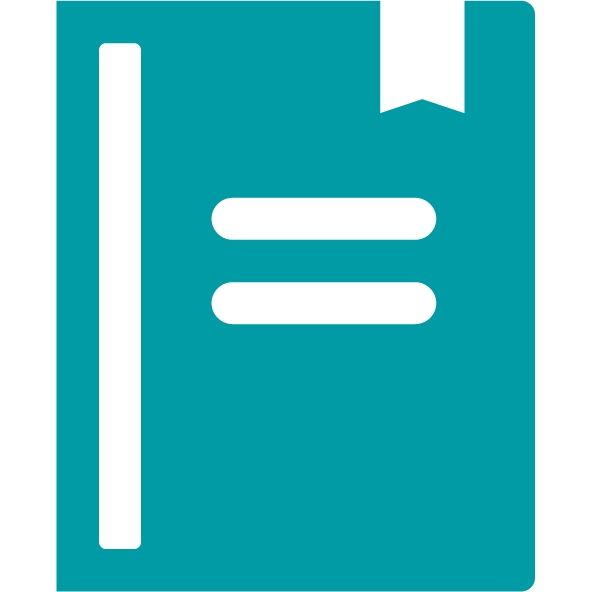
EDUCATION
Situation
Refugee and migrant children and adolescents in the region continue to face challenges accessing educational services and addressing various multi-sectoral needs to mitigate learning gaps. The RMNA 2023 highlighted that the main obstacles to access schools and maintain retention are the widespread lack of regular status and documentation of refugees and migrants. Another important challenge that affected school attendance in various R4V countries was families’ lack of financial means to afford tuition fees (where applicable) and essential school supplies that are not covered by host countries, such as materials, transportation, and uniforms. In countries like Brazil, Chile, Colombia, Ecuador and Peru, the shortage of available enrolment slots also constituted an important challenge for access to education for refugees and migrants. Language barriers often impede Spanish speaking refugee and migrant children’s access and/or effective attendance in countries such as Brazil, Aruba, Curaçao, Trinidad and Tobago, and Guyana. The Trinidad and Tobago government identified 170 Venezuelan students for a pilot program through which it is envisaged that they will be granted access to education in the course of 2024.
Despite various challenges, 2023 also saw some improvements in the field of refugees’ and migrants’ access to education. For example, enrolment of Venezuelan refugee and migrant children in schools in Colombia increased from approximately 488.5K (2022) to 606.5K (2023), with Venezuelan children representing 6% of all children enrolled nationally.
Response
Efforts of R4V education partners supported refugee and migrant children in meeting their educational needs, reaching some 202K people across the region in 2023, accounting for 28.2% of the Sector’s target population.
To enhance access to education for refugee and migrant children, R4V partners conducted a number of activities in 2023, including direct assistance, capacity development, advocacy, and support to governments in the implementation of national education policies inclusive of refugees and migrants. Partners also addressed barriers preventing school attendance, such as lack of financial means to cover costs linked to enrolment and essential supplies, by distributing cash and voucher assistance (CVA), education materials and school uniforms. Additionally, partner initiatives included efforts to identify out-of-school children, as seen in Brazil and Ecuador. Furthermore, collaborative efforts with the Ministries of Education included joint communication campaigns (Peru), provision of educational materials (Colombia), establishment of a special working group (Bolivia) and joint workshops (Chile) aimed at integrating refugee and migrant children into the education system.
To ensure permanence in the educational system, the Education Sector conducted academic leveling activities in Ecuador. Initiatives promoting equality and preventing xenophobia included trainings of school personnel in Peru on xenophobia prevention and intercultural approaches to encourage school retention in Argentina, Paraguay and Uruguay.
In the Caribbean sub-region, educational initiatives included language support and after-school classes tailored for Venezuelan refugee and migrant children in Aruba, Curaçao, Guyana and Trinidad and Tobago. Moreover, indigenous children in Guyana received English language classes pending their school enrolment. Alternative education was also provided for those without access to national education systems in Trinidad and Tobago.
Partners also supported inclusive education policies across various countries. For example, in Ecuador, R4V partners supported the application of Ministerial Agreement 26 A and Active Search programs, which included supporting communication campaigns for refugees and migrants, as well as assistance to individual cases of children in their enrolment in schools.
Finally, education partners also reached some 2.3K teachers through the online course “Creando Aula”, aiming to enhance the continuation of education in contexts of emergency situations. Linked to the increasing number of refugee and migrant children in-transit, the “Education without limits: I learn here or there” campaign raised awareness about the educational crisis experienced by these children.
Lessons Learned
In 2023, several challenges were identified both regionally and nationally. For example, the limited alignment between the regulatory frameworks of the countries in the region concerning access to and permanence of educational services. While important steps were taken through initiatives like the Convenio Andrés Bello (CAB) equivalency table, the various country-specific documentary requirements remain a challenge for the recognition of and access to learning.
Another challenge was the implementation of public policies at the local level, as often a new federal policy do not automatically result in the elimination of educational barriers. For this reason, the Education Sector will continue to focus on supporting governments, also at the local level to ensure federal policies and laws translate into increased access to education for refugee and migrant children in the entire country, particularly in remote areas.
Cover Photo by: Eugenia Paz/IOM
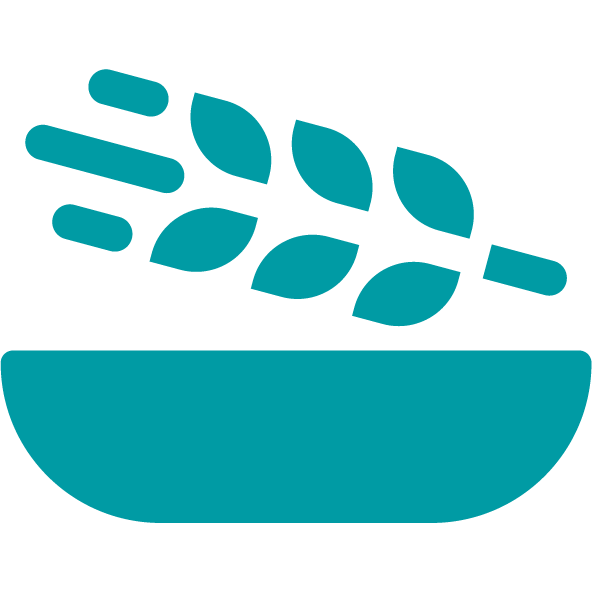
FOOD SECURITY
Situation
The food security of refugees and migrants in Latin America and the Caribbean (LAC) represents a significant challenge, both for those in-destination and in-transit. According to the RMNA, 3.18 million refugees and migrants in-destination were affected by food insecurity in 2023. The drivers of this food insecurity are often the same that drive population movements, including inequality, structural poverty, economic shocks, price increases, and extreme climate hazard events. Insecurity and violence can also push people to catastrophic levels of food insecurity.
Furthermore, as mentioned in the RMNA, refugees and migrants face heightened food security challenges when they are in-transit, staying in temporary shelters, or in households with pregnant and lactating women and children under five years of age. For example, in Colombia, an estimated 83.2% of the population in-transit faced challenges accessing food. According to an R4V partner report, 85% of refugees and migrants in-transit through Central America and Mexico faced difficulties covering their food needs and resorted to negative coping strategies in order to access food. Such negative coping strategies included skipping meals, eating less, or going whole days without food.
Response
In 2023, 114 partners implemented food assistance activities across 16 countries in LAC, including through the distribution of food kits, hot meals, and cash transfers and vouchers to facilitate food security. The use of cash and voucher assistance (CVA) for the provision of food security support declined from 53.1% in 2022 to 39.8% in 2023 and reflects altered and increased in-kind assistance needs of refugees and migrants in-transit. In 2023, R4V partners reached 1.2 million people in need, including refugees and migrants and affected host communities.
Food Security partners distributed in-kind food kits to refugees and migrants in-transit, as well as hot meals through community kitchens. Response strategies also included dissemination of key messages related to nutrition, protection, and life skills.
The close to 40% of the Sector’s assistance that was provided through CVA assistance aimed to address the immediate and short-term food security needs of refugees and migrants, particularly those able to access local markets. With a view to strengthening the Sector’s commitment to operationalizing the Humanitarian-Development Nexus, immediate emergency assistance was linked with sustainable livelihood opportunities to enhance socio-economic integration in urban and rural areas.
Sector partners also provided support to public institutions through the enhancement of basic infrastructure, such as community kitchens, and equipment to deliver better food security services.
Lessons Learned
Due to fluctuating movement patterns of the in-transit population and changing needs of in-destination populations, the Sector aims to increase the use of CVA in 2024, thereby facilitating the flexibility and autonomy of beneficiaries, while improving nutritional and food security outputs of refugees and migrants. The Sector will also bolster cross-sectoral coordination, particularly with Integration and Protection sectors, to increase the overall impact and socio-economic integration and to strengthen national social protection systems and the inclusion of refugees and migrants, as part of an inclusive integration strategy in host countries.
Cover Photo by: R4V
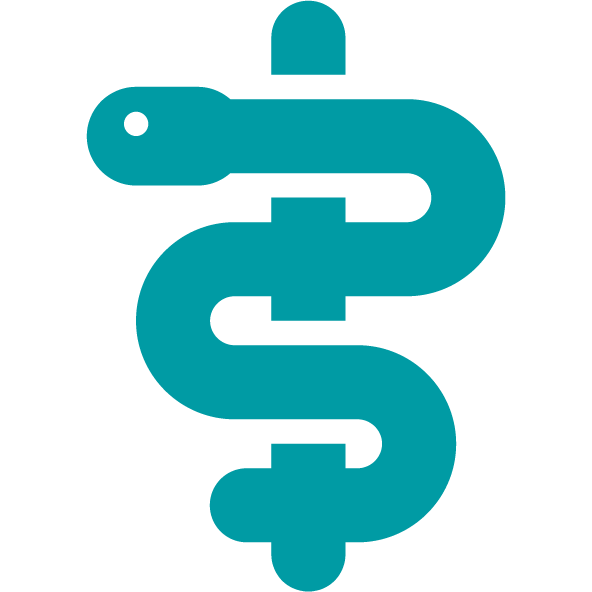
HEALTH
Situation
The health of refugees and migrants in-transit and in-destination, and that of affected host communities, were a concern in 2023. While some countries in the region made progress integrating refugees and migrants into their national health systems, and others (such as Brazil, Costa Rica and Ecuador) provide universal healthcare for all, refugees and migrants across the region continue encountering barriers in accessing comprehensive health services. As noted in the RMNA 2023, these challenges include lack of health insurance, difficulties in covering the costs of medical services, administrative, linguistic, and cultural barriers, as well as being in an irregular situation and a fear of rejection.
Changes in the movement dynamics, with increased in-transit populations often involving entire families, women, children, and older adults, highlight the need for further specialized health services in rural and semi-urban areas, including sexual and reproductive health, maternal and neonatal care, family planning and contraception, diagnosis and treatment for chronic diseases such as HIV/AIDS, diabetes and hypertension, specialized mental health and psychosocial support services (MHPSS).
As the aforementioned and increase in onward and transit movements regularly imply the use of dangerous journeys, with significant exposure to abuse and exploitation, a greater focus on mental and physical health situations has been identified by R4V partners. In the same context, reports of sexual violence underscored a prevalent and underreported reality along transit routes.
Response
R4V Health Sector partners across the region provided healthcare assistance to 707.6K people, including refugees, migrants, and affected host communities, reaching 36% of their target population in 2023. A total of 12,986 health activities were carried out by 65 appealing organizations and 176 implementing partners, with the Sector receiving a total financing of USD 31.62 million, representing 16,8% of its requirements.
Health Sector partners prioritized the provision of direct health assistance to refugees and migrants, including primary health, sexual and reproductive health (SRH), MHPSS, and maternal health services. Partners also contributed to strengthening public health systems, such as in Ecuador, where they supported regular vaccination campaigns for children.
Health partners also assisted in improving healthcare facilities, through medical equipment, personal protective equipment, and diagnostic laboratory tests, as well as infrastructure enhancement. Additionally, partners conducted capacity building activities for healthcare personnel, reaching 31,925 individuals.
To enhance access to healthcare and expand health insurance coverage, R4V partners undertook advocacy efforts in various countries. For instance, in Uruguay and Bolivia, partners collaborated with national and local health authorities to advocate for the recognition of temporary documents and direct assistance for enrolment. In Peru, partners promoted the inclusion of refugees and migrants in the Comprehensive health Insurance (SIS).
The coordination with other regional mechanisms, such as the intergovernmental Quito Process, which includes a HIV/AIDS Working Group (Champion Country: Argentina) and a Health/COVID-19 Working Group (Champion Country: Peru), was strengthened, through the Regional Health Sector’s participation in technical workshops with governments in the region, as well as advocacy for a more holistic approach, including other health topics (apart from COVID-19, mental health, and HIV-AIDS) in Quito Process discussions and relating technical workshops.
Lessons Learned
While 2023 saw improvements in access to healthcare services, certain limitations persist, with continued coordination and efforts required to address healthcare needs amid increasing mixed movements. These challenges are exacerbated by logistical and infrastructure challenges, especially in remote areas, as well as continued challenges ensuring that national health policies are accessible to refugees and migrants. Therefore, in 2024 the Health Sector will ensure further coordination with governments, at federal and local levels, to enhance the provision of healthcare services.
In 2024, the Health Sector will continue to adjust programs to evolving movement trends to support refugees and migrants in accessing vital services, irrespective of their situation (in-destination or in-transit), while continuing to strengthen national capacities, and to work with governments to reduce barriers that limit access to healthcare services.
Cover Photo by: Medical Teams / Lauren Odderstol
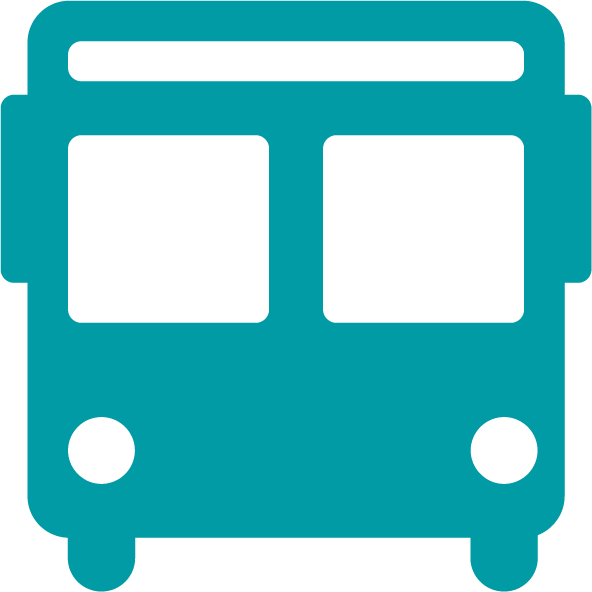
HUMANITARIAN TRANSPORTATION
Situation
In 2023, despite significant efforts and achievements by host governments to support refugees and migrants with regularization, protection and integration efforts, refugees and migrants in-destination often experienced difficulties accessing regular income in their host countries, while being heavily impacted by the general cost of living crisis. Lack of transportation was one of the main obstacles to accessing essential services like healthcare, education, protection, or regularization. The resulting and ongoing need for humanitarian transportation services on a daily or regular basis remains a significant concern, especially for women who are heads of households, pregnant or lactating (RMNA 2023).
In parallel, 2023 was marked by a notable increase in onward and transit movements of refugees and migrants, particularly in Central America and Mexico. More than half a million people crossed from Colombia to Panama through the Darien in 2023, representing almost 50% more than 2022. In addition, movements between host countries and pendular movements in the Southern Cone and some Caribbean countries continued.
Due to the lack of documentation and economic means to pay for safe and dignified transportation many refugees and migrants travel on foot on these routes, often walking for weeks, for 8 to 16 hours per day. During such journeys, they face heightened risks that affect their health including exposure to climatic events and direct sunlight, roadside accidents, insufficient access to healthcare services, as well as protection risks such as abuse, exploitation, trafficking and smuggling, GBV especially sexual violence, harassment, and recruitment of minors. Furthermore, refugees and migrants continue to embark on dangerous sea crossings to Aruba, Curaçao, and Trinidad and Tobago, exposing themselves to risks such as trafficking and exploitation, as well as deaths at sea.
Response
In 2023, R4V partners conducted 947 humanitarian transportation activities assisting some 95.1K people, of which 73K were refugees and migrants in-destination, meeting 59.9% of the Sector’s target population. This was achieved through the support of 13 appealing organizations and 22 implementing partners. Humanitarian Transportation Sector partners received a total of 4.84 million USD in funding. More than 99% of the assistance was provided through direct assistance activities.
Regional efforts included adapting the definition and scope of humanitarian transportation to align with contextual changes and the updated activities within the Sector, aiming for improved clarity in implementation. Therefore, most of the reported sector activities in 2023 related to long-distance humanitarian transportation (528 activities). Building on recommendations and information in the 2022 Guidelines of Long-Distance Humanitarian Transportation, the Regional Sector developed a document on case studies, summarizing various good practices, successes and challenges faced in the implementation of long-distance transportation.
Lessons Learned
Access to safe transportation remains a significant challenge for refugees and migrants, in particular for those in an irregular situation, as most R4V countries have strict regulations and a corresponding requirement that access regular transportation options is contingent on having a regular status. This increases the exposure of refugees and migrants to criminal groups (including human smuggling and trafficking), risks of theft, health deterioration, exploitation, fraud, and violence.
In 2024, the Regional Sector’s efforts will continue to be directed at promoting information on the protection risks associated with irregular journeys and ways to reduce their exposure. This will occur in coordination with other sectors such as the Protection and Integration Sectors and the CVA Working Group.
Noting the unique structure of the Humanitarian Transportation Sector, a continued challenge remains the need to strengthen advocacy efforts with host governments, donor organizations, media, and others on its essential work in the region. The Sector will continue to support advocacy and advisory work for the implementation of activities and development of tools and capacities in short-distance humanitarian transportation.
Cover Photo by: Milena Ayala/NRC
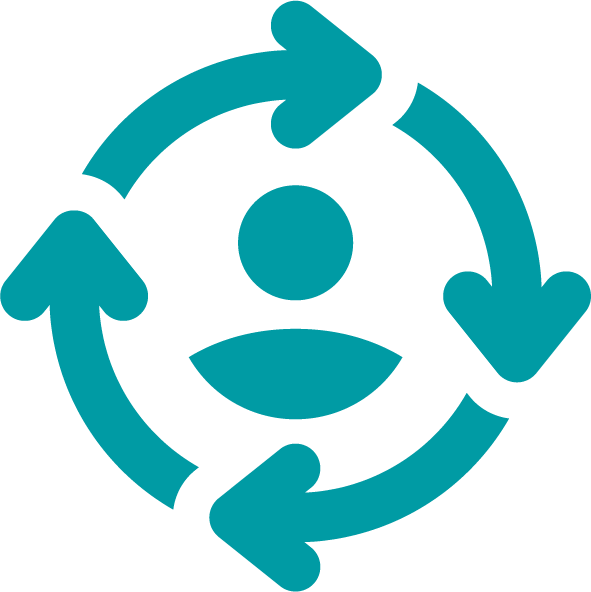
INTEGRATION
Situation
According to an Economic Commission for Latin America and the Caribbean (ECLAC) report, economic growth in the LAC region slowed down in 2023. South America’s economies grew by an average of 1.5% (3.8% in 2022); those in Central America and Mexico by 3.5% (4.1% in 2022); and in the Caribbean (excluding Guyana) by 3.4% (6.4% in 2022). Overall, the report estimates that the number of employed persons grew only by 1.4% in 2023 (5.4% in 2022). Against the background of slow economic growth, refugees’ and migrants’ access to income-generating opportunities has been particularly impacted, and in a context where refugees and migrants are perceived (more so than before) as competitors for the few remaining opportunities, it contributed to increasing levels of social instability, discrimination and xenophobia, further limiting their integration.
Political, social and economic instability, as observed in Ecuador, Peru and Argentina impeded the opportunities for refugees’ and migrants’ integration, contributing to onward movements. On the other hand, countries such as Brazil and Uruguay maintained both a favorable economic and political context, as well as integrative policies, beneficial for refugee and migrant integration, while other countries, such as Colombia, the Dominican Republic, Ecuador, Panama, Costa Rica and Peru, have made advances towards regularization, which has greatly facilitated access to regular labour markets. That notwithstanding, challenges persist, particularly in accessing employment and financial services, partly due to limitations in existing regularization options (such as cutoff dates for eligibility and extensive administrative procedures), dynamics of regional labour markets as the unemployment rate for refugees and migrants surpasses the national average as seen in Ecuador and Chile, and lack of awareness by employers and financial institutions.
Response
In 2023, Integration Sector partners benefitted from financial contributions totaling some USD 48.85 million (amounting 14.3% of their requirements), with which they implemented 6,855 activities that provided integration support to 230.8K refugees, migrants and members of affected host communities (23.3% of those targeted). Among those reached, 61% were refugees and migrants in-destination, 28% were affected host community members, and the remaining 11% were those engaging in pendular, return and transit movements. Half of those reached were women.
To promote integration at the national level, integration partners supported entrepreneurship, enhanced access to vocational and language training and skills recognition, and promoted socio-cultural events through its work with authorities, private sector, academia and civil society. Partners highlighted contributions of refugees and migrants to local development through economic impact studies, such as in Panama, the Dominican Republic, Chile, Colombia, Costa Rica and Aruba, which have been key for changing migration perceptions and narratives.
Capacities of local authorities to promote inclusive participation in the design and implementation of socio-economic integration action plans were also strengthened in Colombia, Ecuador, Peru, Brazil, Argentina, Uruguay, Chile, the Dominican Republic and Panama. Advances were also made towards the integration of indigenous refugees and migrants, notably in Trinidad and Tobago, Guyana and Brazil where entrepreneurship trainings and financial education were made available in Spanish and in indigenous languages. In Aruba, partners collaborated with the government to amend the work permit policy. Manuals and guides were developed through coordination among various stakeholders, including an entrepreneurship guide in Ecuador.
In Brazil, the Integration and Humanitarian Transportation sectors collaborated in supporting the government’s Interiorization strategy; the Integration and Education sectors and the National Indigenous Affairs Working Group collaborated on capacity building efforts for indigenous refugees and migrants from Venezuela.
At the regional level, the Integration Sector established an Entrepreneurship Working Group and participated in the launch event of a regional online course on Entrepreneurship for refugees and migrants. In addition, the Integration and Shelter Sectors developed an Issue Paper on Area-Based Approaches to Integration. The Sector also improved communication and coordination with the intergovernmental Quito Process through its Socioeconomic Insertion Working Group (Champion Country: Colombia), and with the Food Security / Livelihoods Cluster of the Venezuela HCT through the R4V regional coordination team.
Lessons Learned
Securing funding remains a significant challenge. Considering the overarching Strategic Objective of the R4V response aiming to stabilize and integrate refugees and migrants in their host communities (also with a view to avoid onward movements) securing greater support from the international and development community remains the Sector’s greatest challenge.
Other challenges which impacted implementation related to the economic context and its effect on labour markets. The lack of legislative frameworks to enable refugees and migrants to access the regular labour market and the lack or limited regularization processes posed significant challenges for advancing integration, as did the rising levels of xenophobia and language barriers (especially in the Caribbean and in Brazil).
To address these issues, the Integration Sector will continue to strengthen its advocacy efforts for more adapted and inclusive public policies and provide technical assistance to national authorities in 2024. It will also adopt intersectoral measures and enhance collaboration with civil society organizations, particularly those led by refugees and migrants, using community-based approaches.
Cover Photo by: R4V

NUTRITION
Situation
In 2023, increasing levels of multidirectional transit and onward movements of refugees and migrants, the ever-visible impacts of climate change, growing insecurity due to organized crime, and an increase in energy and food prices across the region exacerbated the vulnerability of population groups most susceptible to malnutrition: children under 5 and pregnant and lactating women, increasing the risk of malnutrition, disease, and death, especially among the youngest ones. In Colombia, the number of women observed among refugees and migrants in-transit from Venezuela increased by 143% in 2023, compared to 2022. Similarly, the number of children under the age of 5 increase by 177% during the same period.
The increase of refugees and migrants in-transit, including a large number of children under five and pregnant women undertaking these journeys, contribute to an increased vulnerability to malnutrition due to limited access to healthcare and nutrition services, WASH services, and food along the routes. For example, in Panama, the number of refugees and migrants in-transit through the Darien jungle reached historic records in 2023, with the number of children who crossed the Darien (113.2K) having almost tripled in comparison to 2022 (40,438). The number of pregnant women in-transit increased to over 1,000 during the year.
Host countries identified various types of malnutrition among refugees and migrants. In Brazil, out of 6,138 nutrition screenings performed on children of 6–59 months living in shelters and informal settlements in Roraima, 1,256 (29.2%) identified some level of wasting, either moderate (22%) or severe (7.2%) and were admitted for treatment. In Bolivia, 6% of Venezuelan refugee and migrant children in-transit aged 2–59 months were identified with wasting while 65% of children aged 6–59 months have either light, moderate or severe anemia. At the same time, malnutrition (underweight) and anemia were identified among pregnant and lactating women. In the Darien in Panama, among refugees and migrants in-transit, 1 out of 3 children between 6 and 12 years and 1 in 2 adolescents between the ages of 13-17 were identified with anemia.
Response
Ensuring access to nutrition services through qualified and trained personnel was the main priority of the regional Nutrition Sector. This included identifying and addressing the most pressing nutrition needs of vulnerable populations through nutrition interventions to prevent, identify and treat malnutrition (wasting, stunting and micronutrient deficiencies, such as anemia), nutrition counselling and micronutrient supplementation in pregnant and lactating women and children under the age of 5, as well as the timely identification, referral, and treatment of children under 5 with wasting.
Overall, 46.0K primary caregivers of children between 0 and 23 months received infant and young child feeding counselling in Bolivia, Brazil, Chile, Colombia, the Dominican Republic, Ecuador, Guyana, Peru and Trinidad and Tobago. Additionally, more than 8.5K children between 6 and 59 months received micronutrient powders, enriching their diets with essential vitamin and minerals, including iron, in Bolivia, Colombia, and the Dominican Republic.
Regarding wasting, the most life-threatening form of malnutrition, 4.0K children between 6 and 59 months with a severe form of the condition were admitted for treatment and provided direct assistance, in coordination with government partners in Colombia, the Dominican Republic, and Brazil.
Capacity development of health workers to deliver nutrition interventions was also a key component of the nutrition response. In Brazil, together with the WASH Sector, the Nutrition Sector supported the capacity building of 367 community health workers focusing on health and nutrition at local primary health care services, as well as strengthening of cultural sensitivity towards refugees and migrants.
Lessons Learned
Fund scarcity and limited nutrition expertise at the country level in some countries remain important challenges of the R4V Nutrition Sector response. Funding levels for nutrition activities varied widely across the region, with some countries encountering significant shortages while others met or exceeded financial requirements. Misalignment between data on funding levels and people reached data may stem from some activities not contributing to the overall number of people reached, notably awareness campaigns or some capacity-building activities, while in other cases partners may not have reported activities or the funding they received. Furthermore, although most countries have some level of capacity to implement nutrition interventions, this remains heterogenous across the 10 countries with an active Nutrition Sector, as shown by the limited coverage of infant and young child feeding counseling (34%) and micronutrient supplementation (25%). With only half of the R4V countries having the ability to contribute to nutrition responses of governments, the need for greater visibility and expertise in the field of nutrition remains paramount.
The traceability and follow-up of child malnutrition cases among refugees and migrants in-transit is a challenge due to the mobility of the population and the low access to health services. The increased number of women and children in transit was a challenge to the already stretched nutrition capacity.
Cover Photo by: Medical Teams / Lina Hernandez
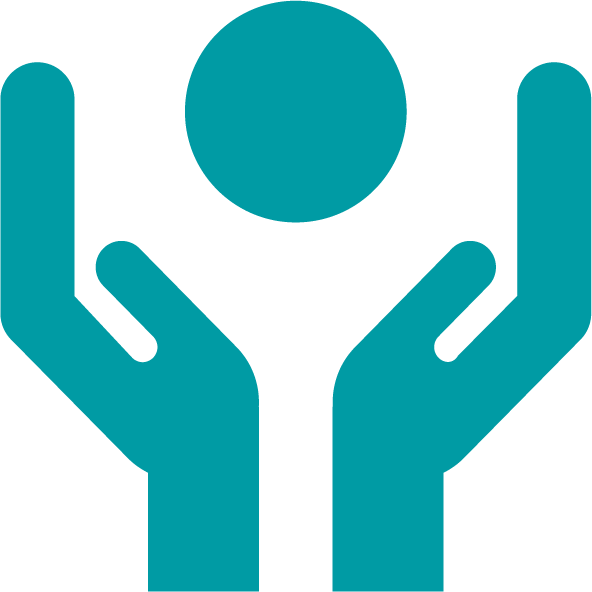
PROTECTION
Situation
Refugees and migrants continued to engage in complex onward movements in 2023, often in an irregular manner and under precarious circumstances exposing themselves to excessive danger. Some individuals suffered violence, serious human rights violations, exploitation and abuse. Refugees and migrants from other nationalities increasingly joined these movements seeking safe access to territory. In addition, numerous Venezuelan refugees and migrants in host countries continued to remain in an irregular situation without regularization of their status.
Response
In 2023, partners reached over 985.7K refugees and migrants and affected host community members with specialized protection assistance.
To promote safe access to territories, partners engaged in communication with communities initiatives, in coordination with the AAP-CwC working group, to enable vulnerable individuals to access accurate information about regular routes, the risks associated with irregular routes and entry processes to countries in the region. Partners produced information material about the existing entry requirements for Chile and Peru, while, at the regional level, guidance on the changed legal framework for entry to the United States of America was developed to facilitate partners’ engagement with vulnerable individuals.
Legal assistance was a key activity to ensure refugees’ and migrants’ access to asylum systems and protection services. In Trinidad and Tobago, Colombia and Panama, partners engaged in strategic litigation to promote asylum seekers’ safe access to international protection, while in Peru, legal services fairs in districts with high concentration of Venezuelans were organized.
Partners called on government authorities to enhance protection, including regular stay arrangements and regularization initiatives. To support the continuous registration and regularization efforts in Peru, Ecuador, and Colombia, partners extended technical assistance to governments and offered direct support such as legal assistance, information on procedures and cash and voucher assistance (CVA) to refugees and migrants. In the Southern Cone, advocacy with government officials led to the creation of safeguards for asylum application of individuals in need of international protection at the Bolivian borders. Aruban partners worked with the government on a quality assurance endeavor, examining the country’s asylum process to guarantee equitable and efficient procedures that adhere to international standards. In Panama, partners supported authorities with the opening of a National Office for the Attention of Refugees (ONPAR) to receive asylum applications from people entering the country.
To strengthen linkages with the host states’ social protection systems and promote a favorable protection environment, referrals to specialized services and community-based protection initiatives were promoted. In Brazil and Guyana, partners identified vulnerable individuals, including from the ethnic group of the Warao, and referred them to state protection services. In Colombia, partners trained affected communities to reinforce their prevention and response capacity when confronted with human rights violations and violence. In Chile, actors supported community-based protection interventions to support social cohesion in response to an increased number of incidents involving xenophobia against refugees and migrants. In the Caribbean, partners engaged with indigenous and non-indigenous communities to promote their access to protection services and the exercise of their rights further.
Finally, the Sector also supported the work of the intergovernmental Quito Process and related protection advocacy, ensuring consultations with regional protection actors, creation of key advocacy messages and participation in the ‘Regularization and Integrated Border Management’ workshop held in October 2023.
Lessons Learned
The increasing number of refugees and migrants engaging in irregular movements; the adverse climate conditions at the borders between Chile, Bolivia, and Peru; the growing tension between Venezuela and Guyana due to bilateral territorial disputes; increasing levels of xenophobia and a militarization approach to mixed movements in the region, challenged the implementation of protection activities primarily by hampering the Sector’s ability to meet significant protection needs, as well as partners’ direct access to affected communities.
Limited funding impacted implementation across various countries of the region. Nevertheless, despite facing funding constraints in Brazil, Colombia and the Central America and Mexico sub-region, partners were able to reach protection targets. This can partly be attributed to the reorientation of the response to the growing in-transit population, but also as a result of an increased focus on capacity-building activities. Additionally, discrepancies between data on funding and people reached may also be due to partners not reporting financial contributions.
Considering the changing dynamics and multidirectional movements, the Sector will strengthen coordination among Platforms and partners to define and implement a suitable regional protection approach to common protection issues.
Cover Photo by: Daniela Perez /UNHCR
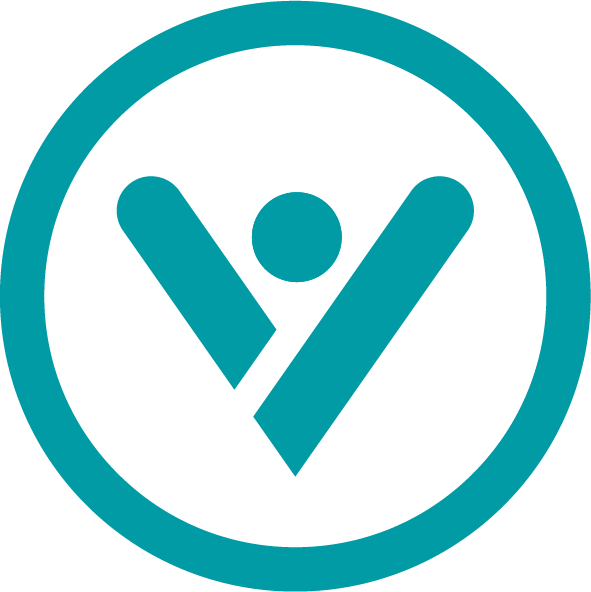
SUPPORT SPACES
Situation and Response
The inter-agency and intersectoral Support Spaces Initiative provides information, orientation, identification, safe referral and basic services to refugees and migrants through a coordinated network across the region. During 2023, Support Spaces were located at strategic points of attention and were tailored to the context, taking new movement trends and dynamics into consideration, including people leaving and returning to their countries of origin or habitual residence.
A total of 190 Support Spaces are active in nine countries of the R4V response: Argentina, Bolivia, Brazil, Chile, Colombia, Ecuador, Peru, and Uruguay. The first Support Space in the Caribbean was established in Trinidad and Tobago in the first semester of 2023.
In 2023, the Support Spaces Initiative implemented 196 activities through its 17 partners, including 3 refugee and migrant-led organizations. The main focus of the response was on capacity development to strengthen the knowledge and use of the Support Spaces Toolkit. Efforts were also concentrated on tailoring the toolkit to different locations and services provided. Building upon the toolkit, capacity-building sessions covered areas such as networking and coordination, humanitarian principles, protection, implementation with a differentiated approach, and accountability to affected populations. These sessions were held for 10 partners in Chile. Moreover, support was provided to strengthen the Support Space in Trinidad and Tobago, involving the capacity development of 30 individuals.
Together with the AAP/CwC Working Group, the Support Spaces Initiative conducted a two day-training on AAP and community feedback systems for partners involved in Support Spaces across the region. Additionally, to enhance collaboration with host governments, the Support Spaces Initiative actively engaged with the intergovernmental Quito Process under its Santiago chapter. A thematic workshop was held in July with the objective to strengthen the support structures provided by States. The workshop, conducted in close collaboration with member states and humanitarian actors, identified several priorities. These priorities included the need to elaborate care protocols, produce and disseminate information materials, strengthen collaboration with local governments and consolidate the network of care spaces.
Finally, the Support Spaces Initiative maintained coordination with regional networks such as Red Clamor and the Regional Network for the Protection of LGBTQI+ persons, including through collaborating on efforts to strengthen visibility and information dissemination through materials and capacity-building.
Lessons Learned
To better adapt to current trends and needs and to ensure that Support Spaces provide specialized support across multiple areas, the Support Space Initiative will continue to enhance coordination with other sectors in 2024.
In 2024, the objective is also to expand the network to other geographical areas under the R4V response, such as Central America and Mexico. To this end, it is necessary to continue strengthening the presence of R4V in these countries and to work in coordination with existing structures. This will contribute to responding to current needs and generate strategies for the sustainability of the Support Spaces at the regional level.
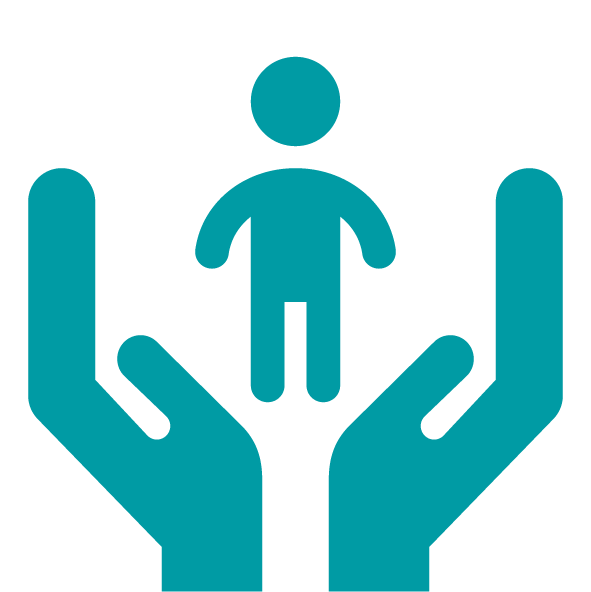
CHILD PROTECTION
Situation
Throughout 2023, refugee and migrant children and adolescents faced challenges accessing essential services and support, including protection, regularization and refugee status recognition, documentation, as well as basic needs, including food, education and healthcare. Sexual violence was one of the recurrent forms of violence affecting refugee and migrant girls and adolescents in Colombia, Peru, Brazil, Ecuador and Curaçao, Trinidad and Tobago. This includes physical and psychological violence as well as discrimination.
The RMNA highlighted the risk of child labour and early unions affecting refugee and migrant children. A significant number of unaccompanied and/or separated children (UASC) were also identified in 2023, including cases of voluntary separation from parents and caregivers, who undertook onward or transit journeys, often through unsafe routes and exposed to criminal groups, including smugglers and traffickers. Children traveling via such irregular routes or without documentation frequently faced barriers in accessing basic services, such as healthcare, education, and regularization process. Brazil reported a considerable increase of UASC in the first quarter of 2023, with 1,108 cases identified in Roraima, representing a 55% increase from the first half of 2022. Another concerning finding highlighted in the RMNA was that more than 12% of children aged 13 to 17 in Chile were separated from or unaccompanied by their parents.
Response
In 2023, Child Protection Sub-sector partners reached 105.8K people with some form of assistance, representing 37.3% of its target population. A total of 4,126 activities were implemented across the region, by 32 appealing organizations and 76 implementing partners, including 10 refugee- and migrant-led organizations.
The Sub-sector prioritized the provision of direct assistance, such as MHPSS, counselling, legal support and orientation, prevention and response to violence, support to family reunification processes, transitory care for UASC, documentation and registration.
At the regional level, the Sub-sector, in collaboration with the Integration Sector and Trafficking and Smuggling Sub-sector, published a report on Situation of Refugee and Migrant Children from Venezuela and the Link to Child Labour in Latin America. Furthermore, the Sub-sector carried out trainings for 22 partners in Trinidad and Tobago on the use of the psychosocial model for care for girls and adolescent survivors of GBV. In addition, the Sub-sector supported the development and implementation of the 3rd Regional Course on Child Protection in Humanitarian Action, training 120 people, including government officials and representatives of local and international NGOs and humanitarian actors from across the region.
Lastly, the Sub-sector maintained close coordination with the Quito Process, particularly with Government of Colombia, the Champion Country of the Child Protection Working Group, to advance advocacy efforts for child protection matters among the member states of this intergovernmental forum. This included the approval of the Operational Guide for Transnational Cooperation on specialized child protection in processes of human mobility.
Lessons Learned
In some countries of the region, limited funding impacted the Sub-sector’s ability to provide child protection services for refugee and migrant children, to strengthening public policies and specialized child protection services, family reunification, and regularization for children and their families. In other areas, the unprecedented onward and transit movement flows required for an adaptation of the R4V Child Protection response, resulting in exceeding initially planned targets.
Support for UASC continues to be a priority, and greater investment is needed to identify, negotiate and create mechanisms across countries to identify and attend the increased caseload UASC and provide them with child protection services, especially for those in-transit.
Cover Photo by: R4V
GBV
Situation
Refugee and migrant women, girls and LGBTQI+ persons continue to face severe gender-based violence (GBV) risks in public and private spaces. Population movement trends in 2023, along routes increasingly controlled by organized criminal groups, generated additional GBV threats and operational challenges for GBV responders. Refugees and migrants, predominantly women and girls, were subject to extortion, physical and sexual assault, trafficking for sexual exploitation purposes, and rape by armed and criminal groups during the perilous journey to reach destination countries. In 2023, a response actor provided clinical management of rape to 676 individuals entering Panama through the Darien jungle. Sexual violence against those in-transit was also reported on regular and irregular routes in Chile, Brazil, Peru and Colombia at the hands of drivers, police and border control officers.
Furthermore, organized crime, illegal mining and other illicit economies in remote territories in Brazil, Ecuador, Colombia, Panama, Guyana and Peru were associated with femicides, rapes, and trafficking for sexual exploitation purposes of refugees and migrants.
The impact of a challenging economic situation, high crime rates and political turmoil in some host countries also contributed to heightened insecurity, economic hardship and increased vulnerability to GBV risks for refugees and migrants, such as sexual harassment in public spaces and sexual exploitation.
Response
In 2023, GBV Sub-sector partners reached 138.1K individuals through a multisectoral response encompassing GBV prevention and risk mitigation programs (2,089 activities), trainings (1,330 activities) and direct GBV assistance (918). At the regional level, the Sub-sector developed technical guidance on GBV service provision, led regional trainings on inter-agency guidelines to improve GBV program quality, and collaborated with other sectors to mainstream GBV awareness in their action plans.
At the national level, the national Sub-sector in Colombia adapted an inter-agency GBV risk mitigation tool for cash transfers and trained national Cash Working Group members on using the tool and making safe and ethical GBV referrals. Some 381 capacity building activities and 1.2K awareness sessions on GBV prevention were also implemented in Colombia. In Peru, 60 partners were trained on the use of cash in GBV response. In Brazil, the Roraima Inter-agency GBV SOP was finalized, and the Sub-sector organized a refugee and migrant women convention, during which a document was presented to government leaders, aimed at improving protection policies for refugees and migrants. It also conducted a large scale GBV awareness campaign reaching 5K people. In Ecuador, the Sub-sector updated referral protocols and improved referral practices between R4V partners and health and legal state actors. In Guyana, Sub-sector launched self-paced capacity development activities for partners.
The regional Sub-sector’s achievements included facilitating a panel on safe referrals and appropriate interaction with survivors for Venezuelan women leaders. It also led multi-country capacity strengthening initiatives, including a training on minimum standards for GBV programming for 38 women-led organizations from seven host countries. The Sub-sector also trained social workers four countries in the Caribbean on psychosocial care for adolescent GBV survivors. Additionally, in-person workshops and online session were facilitated in Peru, Trinidad and Tobago and Chile on topics including GBV minimum standards, coordination, risk mitigation in shelters, GBV core concepts and safe referrals.
Additionally, the GBV Sub-sector provided technical guidance and support to national sub-sectors, including support into strategic planning processes in four countries. Further achievements included the production of a guidance on social inclusion for adolescent refugees and migrants and a guidance on psychosocial support for LGBTQI+ adolescents from Venezuela.
To mitigate GBV risks in temporary accommodation sites, the GBV Sub-sector and the Shelter Sector conducted a three-day training of trainers (ToT) programme on GBV risk mitigation and safe referrals for 17 shelter and project managers from seven countries.
Lessons Learned
Implementation of GBV programming was challenging in areas controlled by armed groups or with heightened insecurity such as in Ecuador, Colombia, Guyana and along the Bolivian border. To address disruptions in humanitarian access, GBV responders relied on mobile women and girls’ safe spaces and brigades, remote modalities and work through local partners.
For a more sustainable response in 2024, the GBV Sub-sector will focus on strengthening and partnering with women-led organizations to deliver community-based GBV responses due to their continued access, sustained presence and community buy-in.
Cover Photo by: Aldeas Infantiles SOS Colombia
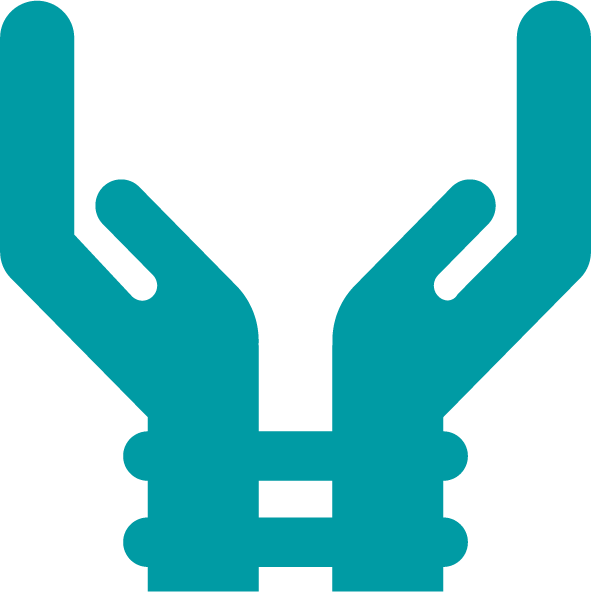
HUMAN TRAFFICKING & SMUGGLING
Situation
Refugees and migrants were at high risk of human trafficking and smuggling throughout the region in 2023, with Venezuelans being identified as victims of trafficking (VoT) in almost all 17 countries of the R4V response. As noted in the RMNA 2023, those most vulnerable to trafficking are often refugees and migrants in-transit or in an irregular situation, in particular women, unaccompanied and/or separated children, indigenous and Afro-descendant peoples, persons with disabilities, sex workers, and LGBTQI+ persons. Its findings also show that victims of trafficking are subject to various forms of exploitation, especially for purposes of sexual exploitation and forced labour.
Human trafficking and smuggling have gone hand in hand with the rise in irregular transit movements, driven by restrictive access practices and policies, including militarization of borders and at times prohibitive visa requirements. These measures have pushed refugees and migrants to seek alternative routes, including resorting to smugglers, often accompanied by heightened risks.
Other significant challenges include the presence of organized criminal groups that control smuggling routes and expose in-transit populations to diverse threats, with gang-related activity observed along borders in Argentina, Bolivia, Brazil, Chile, Colombia, Ecuador, Mexico, Paraguay and Peru. In particular, porous borders facilitate illicit human trafficking, as observed in Colombia, Brazil and Peru. Overall, refugees and migrants crossing these borders irregularly face various risks, such as labour and sexual exploitation, hazardous travel conditions, and the possibility of being victims of human trafficking, underscoring the importance of a coordinated and well-informed regional response to address this issue.
Response
In 2023, the Human Trafficking and Smuggling Sub-sector provided assistance to 26.2K refugees and migrants, and affected host community members, reaching 78.8% of its target, despite limited funding. Notably, 60% of the target population received direct assistance, including legal aid and psychosocial support. In addition, refugees and migrants who were victims of trafficking or at risk of trafficking were also able access to vocational programs in countries like Peru, Ecuador, Brazil, Colombia, Paraguay, and Uruguay.
At the regional level, guidelines were developed to improve the early identification of trafficking and smuggling profiles. These were integrated into training sessions for Peru and Ecuador and presented at regional meetings. Additionally, the Regional Assistance Mechanism provided direct assistance, such as shelter, healthcare, and legal assistance to 38 cases to a total of 83 individuals in 2023, including victims and those at risk, addressing various forms of exploitation across Ecuador, Panama, Paraguay, Peru, Trinidad and Tobago, Uruguay, Panama and the Dominican Republic. A regional campaign, “Something Goes Wrong” was launched to mark the World Day against Trafficking in Persons.
The Sub-sector also supported the development of tools within the Quito Process, specifically in coordination with the Trafficking in Persons Working Group (Champion Countries: Chile and Ecuador) including the Consular Assistance Guide and the Early Identification Toolkit. The former systematically compiles information according to international standards, supporting consular staff in identifying and assisting trafficking victims. The latter establishes criteria for prevention and victim identification.
In summary, the Human Trafficking and Smuggling Sub-sector achieved significant progress despite financial constraints. Its efforts encompassed direct assistance, regional collaboration, capacity building, and awareness campaigns. The Sub-sector’s commitment to addressing human trafficking and smuggling adopts a multifaceted approach, which prioritizes victim support, prevention, and cooperation among regional stakeholders.
Lessons Learned
Challenges encountered by the Sub-sector in 2023 include sustaining progress, adapting to evolving trafficking methods, and enhancing support to victims for long-term rehabilitation and integration into society. Achievements underscore resilience and commitment but require continued innovation and collaboration.
Funding levels for activities under the R4V response to human trafficking and smuggling varied widely across the region, with some countries encountering significant shortages while others benefitting from greater financial support. Misalignment between data on funding levels and people reached data may stem from some activities not contributing to the overall number of people reached, notably awareness campaigns or some capacity-building activities, while in other cases partners may not have reported activities or the funding they received.
Cover Photo by: Miguel Arreategui/Save the Children
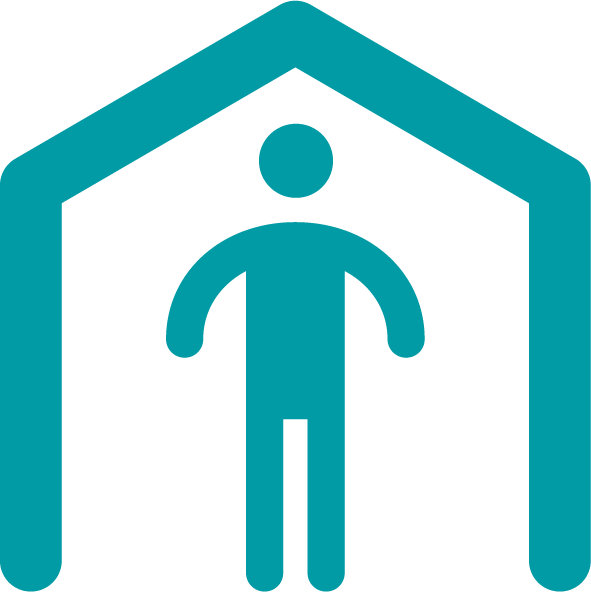
SHELTER
Situation
The shelter situation of refugees and migrants in the region remained challenging throughout 2023 due to the combined effects of a strained economic situation, high levels of inflation, increasing levels of xenophobia, and prevalent security risks. As highlighted in the RMNA 2023, refugees and migrants faced increasing difficulties in accessing affordable and adequate housing, especially in urban areas, where most reside. Due to economic instability and high levels inflation in many of the countries in the region, costs of living, including rental prices, notably increased compared to 2022. Many refugees and migrants were forced to live in overcrowded, informal, or precarious settlements. In some countries, such as Panama, Costa Rica, and the Dominican Republic, refugees and migrants faced legal and administrative barriers to accessing formal housing, among them, some noteworthy obstacles were the lack of documentation, bank accounts, or guarantors, as these are often required to secure a formal rental contract.
Shelter remains as a key concern for refugees and migrants in-transit, who often find themselves sleeping in the streets and public spaces throughout their journey. Up to 76% of refugees and migrants surveyed in Brazil, Colombia, Mexico, Panama and Costa Rica expressed uncertainty about where to spend the next night.
Response
The Sector responded to the urgent shelter needs of refugees and migrants by providing shelter assistance to 240.9K people, which represents 41% of the target population. This was achieved through 2,727 activities implemented by 73 partners, among which 6 are refugee- and migrant-led organizations. Out of the total activities, 16.3% were implemented through CVA.
Rental assistance constituted almost half of the activities implemented by the Sector, reaching more than 112,000 refugees and migrants. This included short-term support through hotels (43% of the overall rental assistance), short-term rental support for up to 3 months (30%), and long-term support of more than 3 months (26%).[1] To accompany these efforts, the Sector promoted technical tools such as the adequate housing tool, which was initially published in 2022 but adapted and improved in 2023.
The Shelter Sector coordinated with other sectors and partners to ensure a comprehensive and holistic approach to shelter interventions while supporting the integration of refugees and migrants, as well as promoting self-reliance in host communities. To this end, the Sector worked with the Integration Sector and Shelter actors to develop tools and guidelines to support the settlement approach/area-based approach in the region. Additionally, in 2023, the Sector published guidance on the Harmonization of Household Items Kits. Finally, the work of the Shelter Sector was highlighted as a good practice in the Global Shelter Cluster’s 9th edition of Shelter Projects.
Lessons Learned
The rise in the rental prices, which are often the largest cost for a family, led to refugees and migrants moving to less adequate and remote options. Such relocations, in turn, negatively impact their integration efforts. As a result, the shelter response had to continuously adapt to new rental market realities and update its tools and approaches to address the changing needs.
Another challenge relates to the ever-growing rate of refugees and migrants engaging in multidirectional onward and transit movements across the region, which contribute to the exhaustion of existing response capacities, in particular as concerns collective accommodation in border and urban areas, resulting in refugees and migrants frequently sleeping outside, without safety and protection from the elements and exposed to risks of abuse and exploitation, among others.
[1] Percentages are calculated based on the total number of activities conducted by R4V partners. The total number of refugees and migrants reached with rental assistance may contain duplications.
Cover Photo by: R4V
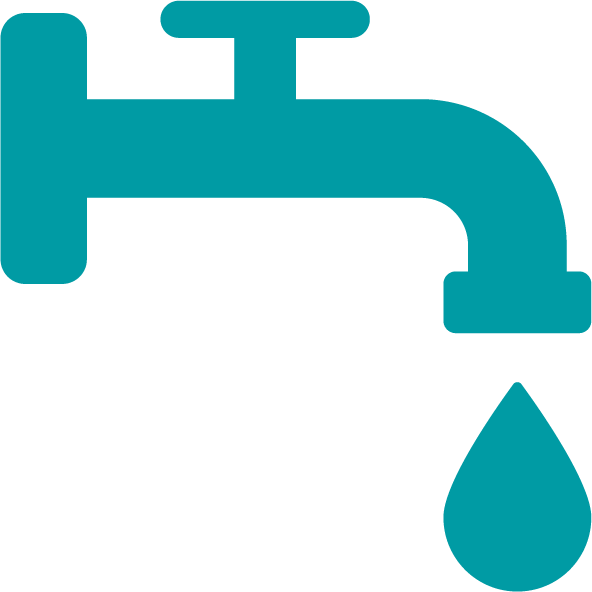
WASH
Situation
In 2023, the water, sanitation and hygiene (WASH) needs of refugees and migrants remained critical, as highlighted in the RMNA. Challenges persisted in accessing essential WASH services, especially against a background of the increasing onward and transit movements, and the strains this puts on local infrastructures along transit routes. For instance, 100% of those transiting through Panama’s Darien jungle require access to essential WASH services, despite the often remote location and overwhelmed capacities along the routes in Panama, Costa Rica, and Colombia. As also highlighted in the RMNA, women and girls on the move encountered difficulties accessing menstrual hygiene products, both along the northward route via the Darien, as well as in destination countries in the Southern Cone and the Caribbean.
Refugees and migrants in-destination often faced inadequate access to WASH services, especially those residing in urban or peri-urban areas characterized by more precarious conditions. For example, in informal settlements in Colombia, where 58% of Venezuelan households lack regular access to water, 53% have toilets outside their homes, and 39% reported open defecation practices. Obstacles persisted in accessing WASH services, partly due to high demand and strain on available WASH services in public facilities, which struggle to meet the needs of growing populations. Additionally, policies and approaches adopted by local authorities sometimes did not prioritize WASH services in informal settlements, exacerbating the issue. Collaborative efforts and the involvement of public sector partners is crucial to build local capacity and promote a nexus approach.
Additionally, extreme weather events exacerbated by climate change, such as the flooding emergency in Peru, droughts and bushfires in Chile, Colombia and Guyana, often in close proximity to areas inhabited by refugee and migrant communities, contributed to increased water scarcity, impacting disproportionately refugees and migrants, as well as affected host communities in accessing sufficient potable water.
Response
The WASH Sector’s response in 2023 reached 299.3K refugees and migrants and affected host communities, representing 50.6% of the target population. It was implemented by 38 partners in 17 countries. Panama reported the highest number population reached (264.1K, representing 259% of the national target), followed by Colombia (183.3K), Ecuador (62.8K), Brazil (34.6K), Peru (29.1K) and Guyana (7.2K). Owed to the larger than anticipated transit movements through Central America, coupled with the above-average need for WASH assistance by practically all those using this route, the number of refugees and migrants in-transit supported with WASH assistance in Panama (258.4K) was higher than any other sectoral assistance provided to in-transit populations.
The response across the region was largely implemented through direct assistance by sector partners (81%), including medium- to long-term interventions benefiting refugees and migrants in-transit and in-destination. Examples include improvements of sanitation and drinking water facilities in official shelters in Pacaraima and Boa Vista, as well as upgrades and maintenance of safe water production plants to guarantee water access in Migration Reception Centres (ERMs) and host communities in Panama’s Darien region.. The WASH Sector also provided assistance through integrated services, such as WASH assistance points, in Tumbes in Peru. Additionally, widespread distribution of in-kind hygiene supplies was an important activity, implemented through innovative response modalities, such as the Hygiene Corner. Through partners distribution of hygiene items for refugees and migrants in-transit in Necoclí in Colombia, more than 5.2K persons were reached in 2023.
On a smaller scale but with significant impact, capacity building activities (8.5%) were conducted to strengthen coordination and response efforts, including with including government officials. Additionally, partners carried out hygiene promotion campaigns (8,1%) aimed to promote social behavior change. Lastly, partners also improved infrastructure (1,6%), including through WASH projects in institutions like schools and healthcare facilities frequently attended by refugees and migrants. These interventions were coordinated with Shelter, Protection, Education and Health Sectors.
Lessons Learned
In 2023, the USD 11.56 million allocated to the WASH Sector covered only 17.4% of partners financial needs for the year. Consequently, response activities were insufficient to comprehensively address the urgent WASH-related needs of refugees, migrants and their host communities across the region. Funding shortfalls and the substantial increase of refugees and migrants in-transit resulted in front-line and shorter-term WASH needs being prioritized, impacting the implementation of longer-term solutions.
The movement trends and dynamics, in particular those involving multidirectional onward and transit movements, seen in 2023 require increased support in 2024 to enhance response capacities, to manage increased movements and to provide partners and institutions with the necessary technical support and tools. Addressing the challenges requires a coordinated and multi-sectoral approach, including building partnerships, strengthening local capacity and ensuring sustainable funding mechanisms.
Cover Photo by: Mendez/UNICEF

MULTIPURPOSE CASH ASSISTANCE (MPC)
Situation
After six years, the widespread inability of refugees and migrants to generate sufficient income impedes many from meeting their basic needs, accessing services, and exercising their fundamental rights, in turn continuing to undermine their socio-economic integration. Although significant progress was achieved in some countries in providing migratory regularization, refugee recognition and integration opportunities (such as in Colombia), this has not yet translated into comprehensive access to services and rights for the majority of refugees and migrants in the region. In particular of those engaging onward or transit movements, as well largely remain dependent on humanitarian assistance.
To respond to the varied needs, throughout 2023, cash and voucher assistance (CVA) was the preferred modality of assistance among refugees and migrants both in-transit and in-destination – in particular, multipurpose cash transfers. As noted in the RMNA 2023, cash was the preferred response modality of 61% of refugees and migrants in need of food, and of 77% of those in need of housing.
The large majority of CVA implemented in the region is targeted at in-destination refugees and migrants, who are the overwhelming proportion of refugees and migrants in the region. As concerns those in-transit, the RMNA 2023 showed that while 88% of the in-transit population in Colombia reported not having enough resources to cover their basic food requirements, with only 2% having reported receiving cash-based assistance between April and May the same year.
Response
Cash and voucher assistance has been a key response modality to meet basic needs of refugees and migrants in LAC. In 2023, some 30% of the people reached by the overall R4V response received assistance in the form of cash or vouchers. In addition, 257K people (40,7% of the target population) benefitted from multipurpose cash transfers (MPC), 74% of whom were women and children. However, this amount fell far short of the targeted population due to funding gaps for this intervention (15,1% of funds needed were received).
In 2023, the Regional Cash Working Group supported the regional coordination of cash-based interventions, the use of MPC linked with sectoral services, and the strengthening of linkages between humanitarian assistance and social protection to integrate refugees and migrants into national systems. This was done by means of partnering with regional sectors and key stakeholders, promoting inter-country dialogue and information sharing, compiling and disseminating relevant regional knowledge, and capacity-building trainings and workshops. Three capacity-building events worth highlighting are the “Basic Principles of Cash Transfers” and “Cash Transfers and Child Protection,” which trained approximately 50 regional and national actors in Panama and Bogota, respectively. Additionally, the virtual three-day Regional Learning Event “Linking CVA and Social Protection Systems” in Latin America and the Caribbean attracted an average of 90 attendees per session and garnered over 900 views of the recordings.
Lessons Learned
Cash and voucher assistance was unequally distributed across countries, with Colombia and Peru accounting for more than 87% of all CVA. A very small proportion of CVA is provided to in-transit populations, that tend to be in greater need of food and basic services, while being exposed to significant protection and safety risks. The CVA Working Group will continue to coordinate and offer technical assistance to partners in other R4V country platforms, to assess the viability of CVA methodologies outside the larger responses along the Andean Corridor.
Suggestions to improve the coordination and implementation of CVA in the region includes supporting the work on route-based approach to CVA in the region; and continuing to strengthen the linkages between social protection and humanitarian assistance.

ENVIRONMENT
Situation
In 2023, the El Niño weather phenomenon, coupled with other effects of climate change and environmental degradation caused extensive damage in multiple countries throughout the region, affecting both host communities and refugees and migrants. Parts of Central America, Bolivia and Colombia experienced prolonged droughts and water shortages, while the coasts of Ecuador, Peru and inland Bolivia saw intense rainfalls and flooding. Between April and November, a total of 803K people living in rural areas were exposed to severe drought in Bolivia, Colombia and Peru. In addition, Cyclone Yaku triggered flooding and heavy rains in the northern regions of Peru, leading to a dengue outbreak and devastating critical infrastructure such as schools and homes.
In areas facing limited access to safe drinking water, communities struggled with the repercussions of poor crops yields, livestock losses and infrastructure damage. For example, in Colombia, some 63% of nearly 2K surveyed households reported income losses due to the impacts of El Niño. Similarly, in June 2023, by heavy rains and floods affected over 20K people in northern Ecuador, while in Bolivia a state of emergency was declared for 51 municipalities, due to environmental damage, community disruption and economic losses, with an estimation of 4.9K families impacted by the fires.
These extreme weather events exacerbated existing movement dynamics and led vulnerable individuals and communities to leave their homes, leading to more people in shelters and protections concerns. The excessively dry or wet conditions heighten the risks of loss of land and income, encouraging negative coping mechanisms, resulting in growing risks of violence and exploitation.
Meanwhile, and as highlighted in the RMNA, the increasing number of refugees and migrants transiting through border and rural areas has contributed to adverse environmental impacts, with vulnerable refugees and migrants unable to access regular WASH services or shelters and therefore resorting to unsuitable natural spaces. Indigenous communities in these areas have been particularly affected, experiencing pollution of water as a result of the continuous passage of thousands of refugees and migrants each day, and inability to control garbage, solid waste, and other environmental degradation related with record-breaking movements.
These situations are compounded by at times inadequate conditions of some reception and transit facilities in the region, designed to provide an emergency response to growing numbers of in-transit movements of refugees and migrants. While not intended for longer-term needs, expansion, and not adapted to extreme climate events, at times, their shelter facilities generate construction debris, while the provision of ready-made meals in non-biodegradable packing frequently are at variance with applicable Sphere Standards for food assistance, aimed at reducing waste, reusing, and recycling.
Response
In 2023, the Environment Focal Pont developed a new integrated strategy that, underscoring R4V’s commitment to operationalizing the Humanitarian-Development Nexus in its activities. Given the exacerbated effects of climate change and environmental degradation and their effect on refugees and migrants and host communities, adaptation measures, such as Nature-Based Solutions (NBS), aim to benefit both, fostering integration and protection while increasing communities’ climate resilience. In contrast to the previous emphasis on emergency and prevention methods, the updated strategy aims to deliver concrete actions by implementing initiatives and activities at different operational levels:
- At the regional level, with the possibility to develop a regional analysis focusing on climate security to understand the effects of climate change, environmental degradation and insecurity in the LAC region as drivers of internal and external population movements; how these impacts push people into harmful adaptation practices and coping strategies, exacerbating violence, exploitation and abuse; and how these climate and environmental pressures put livelihoods and protection system at risk. Ultimately to leverage the contribution of this analysis to align with and including it in host governments’ policy/agenda.
- At national and local levels, by mainstreaming green durable solutions through the sectors, implementing environmental activities with local partners (CSOs, NGOs), that demonstrate how they can generate livelihood opportunities for refugee and migrant population and host communities, improve their living conditions and access to sustainable livelihoods; and by mainstream environmental considerations into sectors’ response to address environmental degradation in R4V response settings.
Bilateral meetings were conducted with various Regional R4V Sectors to review the existing documentation framework, collect information regarding specific priorities and challenges, and outline comprehensive actions in the Platform. Moreover, the Environment Focal Point prepared training sessions on green tools for environmental mainstreaming, such as NEAT+ (Nexus Environment Assessment Tool) to provide sectors concrete tools to assess the impact of their plans and responses on the environment.

PROTECTION AGAINST SEXUAL EXPLOITATION AND ABUSE (PSEA)
Situation
Sexual exploitation and abuse (SEA) committed by humanitarian and development actors remains a significant concern for the individuals whom these organizations serve and protect, including refugees and migrants. The impact of sexual exploitation and abuse is profound for victims, communities, and organizations and violates refugees’ and migrants’ fundamental human rights, perpetuating cycles of trauma and vulnerability. It is also a protection concern that erodes the confidence and trust of affected communities and host populations in those providing assistance.
The deteriorating socio-economic, political and security situation in various host countries, lack of access to basic needs, absence of support networks, difficulties in accessing regularization/refugee recognition, and limited access to reporting mechanisms and justice have contributed to an environment where particularly women and girlsLGBTQI+ people are at higher risk of experiencing all forms of violence. Domestic violence, sexual assault, and harassment are pervasive issues that refugees and migrants face and which are often underreported due to fear, stigma, and lack of support services. Barriers to accessing life-saving gender-based violence (GBV) response services, limited access to healthcare and sexual and reproductive health services, and obstacles to securing comprehensive sexual education exacerbate the risk of SEA and its potential consequences.
While R4V partners have revamped their commitment towards adopting robust protection against sexual exploitation and abuse (PSEA) measures, including the nomination of National/Sub-regional Platform PSEA focal points, the capacity to meet all required standards remains a challenge, and there is still an urgent need for collective action to ensure that all organizations provide adequate safeguards and appropriate response related to SEA that are in line with global standards.[1]
Response
Throughout 2023, the PSEA Community of Practice (COP) focused on its priorities of supporting partners to undertake PSEA measures within the countries of the R4V response.
The COP, in collaboration with UN agencies, NGOs, and civil society organizations shared knowledge, expertise, and best practices through remote and in-person learning sessions for R4V partner organizations, reaching a total of 190 participants. The COP also supported an inter-agency PSEA training on victim assistance and on inter-agency risk assessment in Chile, reaching 24 UN personnel, mainly PSEA focal points from different agencies.
2023 saw an increased and visible commitment from the R4V leadership on PSEA. During the XXII plenary meeting of the Regional Platform, Regional Directors reinforced expected standards of conduct for anyone associated with delivering the R4V response and expressed a renewed commitment to PSEA, ensuring that their agencies’ personnel – including partners and service providers – protect beneficiaries and communities from sexual misconduct, uphold their rights and prioritize their dignity and well-being, and expecting all R4V partners to join this commitment.
A key achievement of the COP was the consolidation of a Network of Platform Focal Points, which, under their terms of reference, promote collective PSEA measures within their respective platforms.
The COP extended support for the development and implementation of robust policies and procedures to prevent and respond to SEA through a pilot mentoring program for R4V partners. This involved reviewing and updating existing organizational PSEA policies and codes of conduct, establishing human resources systems to prevent SEA, introducing reporting mechanisms, and ensuring victim assistance and investigations. Four CSOs in Costa Rica, Colombia, Peru, and Chile participated in the pilot, which will finish mid-year in 2024.
The COP worked on the adaptation of PSEA materials based on the global campaign “Together We Say No.”
Finally, the COP actively engaged in inter-sectoral collaboration to strengthen PSEA within Shelter, Humanitarian Transportation, AAP, and GBV to ensure a coordinated and integrated approach. This collaboration facilitated information sharing, joint advocacy, and the development of inter-sectoral initiatives to address the underlying causes and risk factors of SEA.
Lessons Learned
Ensuring that over 200 partners in the world’s largest geographical response are at the forefront of protecting and responding to SEA and are able to mitigate SEA risks through their organizational structures and operations remains a challenge. Furthermore, there is a common assumption that PSEA measures do not require additional resources, while in reality, dedicated financial and human resources are crucial for PSEA capacity implementation plans and the introduction of processes and procedures that are compliant with PSEA global standards. To address this challenge, the COP was able to secure seed funding for R4V partners who participated in the above-mentioned pilot program, allowing them to fund certain organizational activities such as drafting of PSEA policies, development of staff trainings, and review of HR systems.
In general, feedback and complaint mechanisms across the region continue to lack the appropriate measures to ensure these are safe and accessible reporting channels for victims of SEA. Together with the AAP-CwC WG, the PSEA COP will continue to look into potential collaborations for 2024 and reinforce synergies.
While undertaking joint risk assessments was one of the priorities for 2023, the COP identified two important challenges. The first one was the lack of financial resources to implement them, and the second was the unfamiliarity of evaluating the PSEA response in a given site. The COP worked intensively in shifting that perception and ensuring that partners understand that despite best efforts, SEA is a risk present in any context where a response is carried out and R4V partner organizations operate. Effective SEA risk management starts with evaluating the risks and undertaking targeted actions to address them.
In 2024, the COP will strengthen dialogue with National Platforms to ensure that additional countries conduct risk assessments of their response.
[1] For more information on PSEA standards and principles please see: IASC PEAS Basics, IASC PEAS Core Principles, IASC PEAS Minimum Operating Standards, Fact sheet on the Secretary-General’s initiatives to prevent and respond to sexual exploitation and abuse, CHS Alliance PEASH Implementation Quick Reference Handbook.

ACCOUNTABILITY TO AFFECTED POPULATIONS / COMMUNICATION WITH COMMUNITIES (AAP/CwC)
Situation
In terms of Accountability to Affected Populations (AAP) and Communication with Communities (CwC), the situation for refugees and migrants in Latin America in 2023 varied across different regions and countries. Efforts were made to include refugees and migrants in decision-making processes and amplify their voices through digital engagement, as seen in Brazil, Bolivia and Peru. Rapid community information sessions were also conducted for refugees and migrants in-transit between borders, such as Panama-Colombia and Bolivia-Chile. However, fully implementing AAP principles remained a challenge.
In some countries, local and national governments, along with R4V partners, worked to directly engage refugees and migrants in discussions on policies and programs that directly affected them. This involvement ranged from community meetings to consultation processes aimed at gathering feedback on services and assistance provided, as demonstrated in the joint needs assessment in Ecuador, focusing on the integration of the refugee and migrant population. Nevertheless, limited access to information, online disinformation and misinformation campaigns, language barriers and differences in fully accessing services between different demographic groups across the region hindered meaningful community participation.
Response
At the regional level, the AAP/CwC Working Group, convened a meeting with 13 key AAP/CwC focal points from R4V partners to collectively determine the main pillars of the AAP/CwC response. These pillars included capacity building, key messaging, and harmonized interagency approaches, and were consolidated in an updated AAP/CwC work plan.
Capacity building initiatives were supported across the region, including in Bolivia, Chile, Colombia, Costa Rica, Panama, and Peru, to empower partners with the necessary skills and knowledge to effectively engage with affected populations and integrate AAP principles into their response activities. The AAP/CwC Working Group also developed regional key messages in collaboration with the Communications Working Group, the Protection Sector and Humanitarian Transportation Sector to streamline communication efforts by creating consistent messaging, providing accurate information on migration procedures, rights and available support services. To ensure the inclusivity and relevance of the key messages finalized in 2023, the working group plans to implement participatory methodologies that may include conducting focus group discussions, community consultations, and feedback sessions with refugee and migrant populations. These would help gather insights, perspectives, and suggestions for improving the key messages to ensure that they are relevant, impactful, and responsive to the diverse needs.
Finally, the AAP/CwC Working Group established a harmonized inter-agency regional AAP framework to align methodologies, tools, and reporting mechanisms to ensure coherence and consistency in AAP/CwC efforts under the R4V platform.
Lessons Learned
Despite efforts through online campaigns to disseminate accurate information for refugees and migrants, partners’ initiatives via Facebook and TikTok, challenges persist due to the prevalence of disinformation and viral campaigns in social media driven by smugglers and unreliable sources. This misinformation significantly influences their decision-making process, very often leading them to choose perilous routes like the Darien Jungle in Panama, highlighting the urgent need for scaling-up reliable online strategies and resources to ensure their safety and well-being.
In addition, in response to new migration policies enacted in countries across the region, there is a pressing need to develop or update information materials to guide refugees and migrants and ensure they understand their rights, obligations, and available services. Without updated and accurate information refugees and migrants may make decisions based on outdated information, leading to misunderstandings of their rights or risks associated with migration routes.
An additional AAP/CwC challenge in 2023 is the necessity to improve inter-agency community feedback mechanisms. Implementing innovative methods for community feedback collection, such as mobile apps or community-based surveys, can help address these challenges and ensure that locally led responses are shaped directly by community inputs.

COMMUNICATIONS
Situation
The lack of livelihood opportunities, effective integration and regularization, as well as changing regulations and dynamics in some countries of the region led hundreds of thousands of refugees and migrants in the region to engage in successive onward movements. Considering the context in which refugees and migrants live within the region, with the majority considered in-destination and seeking to integrate into host countries and communities, while others are in-transit seeking a new place to call home, it is imperative for local and international media, decision-makers, and the general public (in the LAC region and external) to better understand the present situation. In this context, it was crucial to improve advocacy efforts, highlight R4V’s relevance in the response to the situation and partners’ key activities, and contribute to the provision of key information to refugees and migrants.
Response
In 2023, the Regional Communications Working Group focused on the following areas:
Raising awareness of the situation of refugees and migrants and improving visibility of their contributions to society to fight xenophobia and promote social cohesion.
- Field missions conducted to Chile, Argentina and Brazil to gather photos and videos on human-interest stories and the R4V response, used for strategic communications pieces during key events and campaigns through the course of the year.
- The podcast “Crossing Borders” was produced in partnership with Spain’s largest radio network, Cadena Ser.
- The launch of the documentary “The Journey that Never Ends” in the framework of the Conference in Solidarity with Refugees and Migrants from Venezuela and Host Countries and Communities in Brussels. It was also screened in the framework of national film festivals and events in Panama, Ecuador, Indonesia and Libya, with over 600 people having attended these events. The documentary is also included in the Global Migration Film Festival, which will make it available to be screened at events concerning refugees and migrants, host communities, and relevant stakeholders.
Enhancing visibility of the R4V Platform, including initiatives led by Sectors, National and Sub-regional Platforms, and partners.
- Supporting the launch and dissemination of documents and projects, such as the Regional Refugee and Migrant Response Plan Update 2024 (RMRP), the Refugee and Migrant Needs Analysis 2023 (RMNA), the Solidarity Conference, the quarterly Movements Report, the Shelter Projects 9th Edition, and the 5th General Assembly of the Coalition for Venezuela, through the development of strategic messaging, press releases, social media content and videos; as well as with the planning and implementation of high-level presential events.
- Reaching 360K impressions in R4V’s YouTube account; more than 8K followers and 700K impressions in R4V’s X account; more than 3K views of R4V’s monthly newsletter; and over 240K users of the R4V’s website and microsites.
Disseminating messages to reduce information gaps and support protection of refugees and migrants.
Together with Sectors, Working Groups and partners, audiovisual and graphic materials were developed and disseminated for the following communication strategies:
- Termination of title 42: information campaign to inform refugees and migrants about the new migration measures of the U.S. government after the withdrawal of COVID-19 regulations.
- “Spread the Word”: prevention campaign created for the International Day Against Human Trafficking and Smuggling.
- “Together We Say NO”: toolkit to provide key PSEA information to humanitarian and development staff.
Lessons Learned
The Communications Working Group faced challenges such as the need to respond promptly to quickly changing government policies affecting refugees and migrants; countering the negative and false narratives about Venezuelans in the region; and managing the impact of social media influencers and media outlets disseminating misinformation with specific agendas. To address these challenges, in 2024 the Working Group will strengthen team efforts with sectors and communication partners in the region to work hand-in-hand to counter misinformation with campaigns and key messages that allow prompt responses to changing and adverse contexts.
Brazil
Situation
Brazil’s open-door policy and solutions-oriented approach under the government’s ‘Operation Welcome’ facilitated receiving the steady flow of refugees and migrants from Venezuela, reaching 510.5K individuals by end-2023. Similar to previous years’ trends , entries to Brazil far outweighed exits (ratio of 3 to 1), with refugees and migrants arriving in increasingly vulnerable conditions, as evidenced by the number of medical evacuations from the border to the capital of Roraima state nearly doubling from 2022 to 2023 (from 1,088 in 2022 to 1,966 in 2023, 46% of them children and adolescents), which also highlights the critical health situation of newly arriving refugees and migrants, and the strained nature of local capacities to address such emergencies.
In contrast to many countries in the region, in Brazil the vast majority of refuges and migrants from Venezuela have a firm intention of remaining in Brazil (see hereto the findings in the RMNA noting that that 87.5% of Venezuelans intend to stay in the country during the next year, with only 4.4% considering returning to Venezuela, and 3.8% considering relocating to a third country). This may be attributed to the extensive support systems available to refugees and migrants, including access to free healthcare, education, social services, and even cash transfer programs. Notably, in 2023, the government established a task force in Roraima to enroll all Venezuelans in the federal cash transfer program as part of Operation Welcome, ensuring immediate access to this assistance upon entry into Brazil (289.9K Venezuelans enrolled as of November 2023, of which 74K in Roraima). Additionally, findings from the JNA indicate that refugees and migrants who voluntarily relocate to other parts of Brazil, under the government’s so-called ‘interiorization’ programme, consistently experience better conditions than those in Roraima.
The Ministry of Justice initiated the creation of a National Policy of Migration, Refuge and Statelessness encompassing all nationalities. While the finalized national policy is expected for publication in 2024, meanwhile in 2023, the government began a broad consultation process with multiple sectors including local governments, civil society (especially refugee and migrant-led organizations), stakeholders and UN agencies. Additionally, thematic conferences were convened in 2023 as institutional spaces for participatory decision-making on overarching public policies (such as health, social services, and youth), as refugees and migrants, though unable to vote in Brazil, actively contribute to these conferences and can be elected as delegates to represent their interest.
Response
In 2023, R4V partners’ interventions in Brazil benefitted some 122.6K refugees and migrants from Venezuela and affected host communities, representing 79% of the total target population. In addition, through support and assistance of R4V partners, ‘Operation Welcome’ reached the milestone of having voluntarily relocated over 122K people (since the inception of the ‘interiorization’ programme in 2019), contributing to the socio-economic integration of Venezuelans in the country.
Over 1,200 children and adolescents from Venezuela received support for school enrollment in Roraima, the joint action was led by the Education Sector, with local stakeholders, to identify out of school children in shelters and spontaneous settlements in Boa Vista and Pacaraima.
Protection Sector partners supported the provision of protection services and comprehensive assistance to over 96K persons, representing 96% of the sector’s target. The national GBV Sub-sector implemented PSEA trainings for partners and ‘Operation Welcome’ personnel, training 1,321 people (984 military and 337 civilian staff working in its facilities).
The Child Protection Sub-sector published a guidance for the protection of unaccompanied and/or separated refugee and migrant children and adolescents (UASC) in Brazil. This guidance was collaboratively developed with various local stakeholders, including government entities and established a localized protocol.
Support from the Human Trafficking and Smuggling Sub-sector allowed for the training of 370 justice system staff (including federal and state judges) and other stakeholders of the counter-trafficking system to strengthen local capacity and encourage participants to replicate knowledge within their respective networks.
The WASH Sector held a workshop in Boa Vista to facilitate the sharing of experiences, good practices and to discuss the main challenges of improving access to WASH services for Venezuelan refugees and migrants in Brazil, including a discussion on strengthening governance and public policies. This workshop was considered crucial given the changes in the operational context, with the military contingency altering every 15 days and to successfully reach 34.6K people throughout the year, representing 98% of its target in 2023.
The Shelter Sector provided 42.5K people with direct shelter assistance. Additionally, overnight stay facilities in Boa Vista and Pacaraima assisted an average of 900 and 400 individuals per month, respectively, with a specific focus on reducing the number of people living in the streets, which was particularly notable during the surge of arrivals in September.
Lastly, the National Platform focused on strengthening coordination capacities at multiple levels. Following an evaluation of capacity building needs of partners in the field, the coordination team held an Inter-Agency Coordination Workshop for 22 R4V partners in Roraima. This focused on how to support an inclusive environment and foster meaningful cooperation between key actors in a humanitarian response.
Lessons Learned
In response to the diminishing availability of funding, partners had to adapt and prioritize their responses. This was particularly relevant for partners in the areas of shelter and integration. For example, in Roraima, partners were required to reduce the number of shelters, while expanding the facilities that remained, to maintain the overall capacity of Operation Welcome sites in a more efficient way.
Engaging refugee- and migrant-led organizations poses challenges, as some require support in elaborating their contributions for the RMRP. However, recognizing the importance of their involvement, the R4V Brazil Platform dedicated efforts and resources to such assistance. Consequently, their inclusion in the RMRP grew from one organization in 2023 to five in the RMRP 2024 Update, with additional support provided to facilitate their meaningful participation in coordination spaces at all levels.
Cover Photo by: Glenna Gordon/Save the Children
Chile
Situation
In 2023, against a background of challenging socio-economic conditions and repeatedly unsuccessful attempts at passing a new constitution, Chile enacted a legislative agenda around national security and critical infrastructure protection (which includes the state’s borders). This included the Critical Infrastructure Law, bestowing additional powers to the military to conduct identity checks, register belongings and vehicles, and detain people entering the country irregularly. This significantly impacted the situation of refugees and migrants, especially those who are unable to meet the country’s visa requirements and who therefore had to resort to entering or leaving the country irregularly, and via remote routes, often characterized by high-altitude terrains, harsh weather conditions, and serious protection concerns, including human trafficking and smuggling.
In parallel, the National Migration Service implemented a biometric registration process, which, while not a regularization process, facilitated the identification of 182.1K people (91% of whom were Venezuelan refugees and migrants) residing in the country in an irregular manner. This initiative reflects Chile’s efforts to improve visibility of the irregular population in national statistics, enabling better identification and prioritization of the needs and assistance required by refugees and migrants.
Response
In 2023, R4V partners in Chile reached 62.5K refugees and migrants from Venezuela and affected host community members with some form of assistance. A total of 38.4K individuals were reached with specialized protection services and assistance, including legal advice or counseling on access to rights. Some 14.5K individuals were reached through campaigns promoting access to general healthcare, sexual and reproductive health, and psychosocial support services, and over 8.7K individuals received food assistance through in-kind food kits or CVA. Additionally, 3.4K individuals participated in initiatives related to entrepreneurship support, self-employment, and integration into the labour market, and around 6K people benefited from rental subsidies and emergency accommodation support.
A priority of the National Platform was to strengthen relations with national and local authorities and institutions to address the situation of refugees and migrants. Through the collective efforts of R4V partners, the National Platform in Chile carried out its first joint needs assessment (JNA) in 2023, which was presented in an event co-hosted by the Chilean Ministry of Foreign Affairs. The JNA became a primary data source to strengthen the work of the Platform and inform the RMNA 2023 and the planning of the RMRP 2024. This assessment allowed the Platform to advocate for enhancing programs and policies and developing comprehensive solutions for refugees and migrants from Venezuela. Another important milestone was the work on a joint accountability to affected populations (AAP) tool with the Presidential Delegation of Tarapacá, to be installed at the Lobitos Transitional Center in Iquique. The coordinated efforts will serve to establish a feedback, complaints, and response mechanism and continue strengthening humanitarian assistance within the Transitional Center. To do so, R4V partners conducted focus group discussions, interviews, and coordination efforts with local authorities in the Tarapacá region.
The National Education Sector facilitated four workshops with the Ministry of Education to train R4V partners on issues related to refugee and migrant children’s right to education. The workshops emphasized 1) the Provisional School Identifier (IPE), which is a unique number issued by the Ministry of Education to children of school age without regular status; 2) complaints processes associated with the right to education; 3) early registration and associated procedures for parents; and 4) the School Admission System (SAE) Platform, which is of particular relevance to assisting refugee and migrant families with children in the Chilean school admission process. Additionally, more than 5K Venezuelan children were reached through integral education programs, school supplies donations, and non-formal education activities, emphasizing children who recently arrived in the country.
Finally, to improve social cohesion and reduce tensions between host communities and refugees and migrants, R4V partners adopted a community-based approach that improved community infrastructure, particularly in border regions where Venezuelan families recently arrived, generating spaces for peaceful coexistence by addressing the needs of host communities, refugees, and migrants. For example, in Arica (a border city with Tacna, Peru), in coordination with the Regional Ministerial Secretariat of Education, R4V partners supported the remodeling of facilities of the América school, giving its students, of which 52% were refugees and migrant children, access to improved recreational spaces.
Lessons Learned
Considering the challenges that R4V partners encountered in assessing the profiles and needs of the refugee and migrant population, as well as in creating greater visibility and advocacy for the situation in Chile, enhancing the collaboration between the National R4V Platform and the competent authorities responsible for official statistics on the number of refugees and migrants in Chile was identified as a priority. At the time of this report’s finalization, the Government had updated official statistics for the first time since late 2021, which will facilitate R4V planning and implementation efforts in 2024.
Following the passing of the Critical Infrastructure Law in early 2023 and subsequent operational challenges, in coordination with government partners, R4V partners reduced daily physical presence in Colchane, including the Reception Center. Partners continued to implement activities and conduct monitoring exercises.
Colombia
Situation
In 2023, the Governments of Colombia and Venezuela restored diplomatic relations and fully reopened their borders, leading to increased regular movements between the two countries. Meanwhile, irregular and onward transit movements via Colombia grew, with 520.1K refugees and migrants (63% Venezuelans) crossing from Colombia to Panama in 2023, compared to 248.3K in 2022. This increase could be attributed to perceived opportunities in the United States of America and in Mexico, while challenging economic conditions, limited regular employment opportunities and an increasingly reserved political climate in Colombia negatively impacted the ability of refugees and migrants to integrate and create a stable future in the country.
The economy saw a modest 0.6% GDP increase, the lowest in two decades (excluding 2020 due to COVID-19). The ever-increasing costs of living exacerbated the situation of refugees and migrants, who faced persistent barriers to entering the regular labour market, including difficulties in validating their educational and professional credentials, or lack of regularization.
Out of the 2.8M Venezuelans residing in Colombia, by end-2023, 1.9M had received temporary protection permits (TPP). However more than half of TPP holders reported difficulties accessing public services and finding jobs, citing documentary requirements, discrimination, low salaries or poor job conditions as main obstacles.
Insecurity is the third main reason identified in the RMNA for refugees and migrants in Colombia to move to another country. Despite a decrease in some violence indicators in 2023, refugees and migrants face ongoing risks; for instance, there were 1,574 violent deaths of Venezuelans in Colombia in 2023.
Response
In responding to the main priorities identified in the RMNA 2022, which highlighted a particular need for integration, shelter, health, and protection, throughout 2023, 66 R4V partners reached over 1.3 million people in 32 departments of Colombia.
The Health Sector assisted more than 574K individuals with primary healthcare, complementary services, and epidemiological surveillance. The Sector also activated a health committee to improve coordination between Colombia and Panama. Regarding sexual and reproductive health, partners made progress in monitoring sexual and reproductive health, facilitating the generation of alerts regarding morbidity and mortality to be shared with the refugee and migrant populations.
The Food Security Sector reached more than 1,03M people, mainly through direct food assistance. For the high number of people in-transit, the Sector adjusted its response and prioritized hot meals at communal facilities and ready-to-eat meals. Meanwhile, the Nutrition Sector assisted over 35.3K refugees and migrants, with particular focus on nutritional supplements for children aged 6 to 59 months, as well as for pregnant and lactating women.
With 29% of refugee and migrant children in-destination aged between 6 and 17 not enrolled in school (primarily due to financial constraints), the Education Sector assisted over 100.9K individuals, through supplies or educational services, such as school kits (60%), and assistance related to enrollment in formal educational institutions or non-formal education programs (38%).
The Integration Sector assisted over 72.9K individuals with financial inclusion and financial education services (41%) and support for self-employment or entrepreneurship initiatives (29%). Furthermore, the sector improved national and local institutional responses with competency certification programs and entrepreneurship support.
The Shelter Sector supported 149.2K refugees and migrants with short-term shelter solutions (e.g., hotel rooms) as well as medium- and long-term support, including through cash for rent programmes. The Humanitarian Transportation Sector provided assistance to 73.5K refugees and migrants, mainly for transportation within the country in order for refugees and migrants to access vital healthcare, protection, regularization, education and labour opportunities and services.
The WASH Sector provided access to services for 183.3K people, primarily through hygiene supplies and communication campaigns on hygiene practices. It also provided safe access to sufficient and potable water, for example in Urabá, where bottled water and hygiene items were distributed.
The Protection Sector reached 449.5K individuals, prioritizing access to rights and support for the TPS programme and asylum procedures. In response to the increase in GBV cases among the refugee and migrant populations (as highlighted in the RMNA 2022), the GBV Sub-sector reached over 75.5K through GBV prevention programs (82%) and referrals to survivor assistance (18%). The Child Protection Sub-sector assisted 49.1K people, including through specialized child protection services (69%), mental health and psychosocial support (31%). The Sub-sector prioritized the care of unaccompanied and separated children (UASC), aimed at preventing recruitment by armed actors and criminal groups.
Lastly, 141.3K people received cash and voucher assistance in Colombia in 2023.
Lessons Learned
Challenges mainly related to the limited integration prospects and managing the growing onward and transit movements of refugees and migrants. Between 2% – 20% of those refugees and migrants who engage in onward or transit movements via Colombia have reportedly obtained a regular status in the country (largely the TPS). This indicates that, despite prevailing challenges, the TPP and refugee recognition contribute to stabilizing a majority of refugees and migrants in Colombia.
In 2023, there was a shift within the government of responsibilities for refugees and migrants. For example, a new Ministry of Equality was created and will assume the responsibilities previously held by Border Management (Gerencia de Fronteras), and is expected to be fully operational in 2024.
Cover photo by: Aldeas Infantiles SOS
Ecuador
Situation
In 2023, Ecuador faced socio-political instability and an increase in violence, as well as natural disasters, all amidst an economy still recovering from the COVID-19 pandemic. This presented challenges for integrating and protecting the nearly 500K refugees and migrants in the country and created operational obstacles for response actors.
In May, the former President Guillermo Lasso dissolved the National Assembly and called for new elections, which were held in October. Following a presidential campaign marred by high levels of violence (including the assassination of one main candidate), newly-elected President Daniel Noboa prioritized responding to the growing insecurity in the country. Ecuador was one of the most violent countries in Latin America during 2023, recording more than 40 violent deaths per 100,000 inhabitants, an increase of approximately 64.9% compared to 2022. Increased instability also resulted in heightened levels of xenophobia against refugee and migrant populations.
This context prompted internal movements among refugees and migrants, as well as increased departures from the country, particularly north towards the United States. Population movements reflected trends observed since 2022, with growing northward movements (including a decrease in entries from Colombia; an increase in entries from Peru; a decrease in exits to the south; and an increase in exits to the north).
The national Registration and Regularization Process initiated in 2022 for the Venezuelan population in an irregular situation continued in 2023: at the end of the year, more than 201.7K people had received a certificate of temporary stay, 87.7K a Temporary Exceptional Residency Visa (VIRTE) and 72.3K a national identity card.
Response
delivered assistance to 270.6K people in need in 122 municipalities of the country, primarily in Quito, Guayaquil, and Manta, as well as border areas including Tulcán, Huaquillas and Sucumbios. Food security (158.0K people reached), protection (including for GBV and child protection, with 150.1K people reached) and WASH (62.8K) sectors reached the greatest number of refugees and migrants during the course of the year.
Protection activities included support to increase the government’s capacity to implement the Registration and Regularization Process and to expand access for eligible Venezuelan refugees and migrants. Partners of the National R4V Platform in Ecuador (GTRM) mobilized brigades to offer legal and administrative advice and provided CVA to cover documentation costs for registration to obtain a certificate of temporary stay and a VIRTE visa and identity card (a process that will end in April 2024). Community-based protection mechanisms were strengthened, particularly in response to the security situation, where partners adjusted security protocols to improve protection provided to local leaders. Similarly, child protection partners coordinated with government authorities to implement a Special Protocol for Registration and Regularization of Unaccompanied Children and Adolescents, which identified more than 1,000 unaccompanied and/or separated children, 730 of whom obtained a VIRTE visa. Actions to prevent gender-based violence, human trafficking and smuggling provided case-by-case assistance and strengthened 14 safe spaces for GBV survivors. A total of 3,009 public officials were trained in the identification and prosecution of GBV, human trafficking and smuggling of migrants.
The Health Sector response reached 33.5K people with medicines, support for health interventions, access to contraceptives, and mental, sexual and reproductive health. Partners strengthened the public health system by supporting regular vaccination campaigns for children and addressing COVID-19.
41.3K refugees and migrants received support with education during 2023. Partners strengthened the capacities of the Ministry of National Education with initiatives promoting access to the school system through active searches for out-of-school children, increasing school permanence with academic leveling activities and promoting holistic education.
The Integration Sector developed and launched a Technical Guide for Entrepreneurship Support, to help organizations which create, develop, strengthen and finance business initiatives of the refugee and migrant population in Ecuador. The methodology mainstreams a market approach for people living in poverty and refugees and migrants, and takes an intersectional approach to gender, environmental impact and human mobility.
WASH and Shelter activities articulated a strategic response to both refugees and migrants and people affected by natural disasters, in actions coordinated through both the GTRM/R4V framework and the UN Country Team. Partners provided technical support to the Secretary of Risk Management (SGR) through trainings for officials as well as contingency plans at the national and local levels.
Finally, the Food Security Sector reached more than 158K people with assistance, while the Cash Working Group developed market monitoring procedures, a targeting criteria survey and an indicative security protocol for the delivery of CVA (which was a key assistance modality for food security and several other sectoral responses).
In addition, the national GTRM promoted localization of the response through trainings in resource mobilization for civil society, refugee- and migrant-led organizations and local NGOs, reaching 24 partners, and produced a practical guide for the diversification of funding sources.
Lessons Learned
GTRM partners faced an increasingly challenging operational environment in 2023, characterized by a complex security context; in response, four out of ten local GTRMs generated contingency plans together with local governments, a good practice that will be replicated further in 2024. The impacts of the El Niño weather phenomenon underscored the need for inter-institutional collaboration through other coordination mechanisms, to respond to both mixed movements and environmental emergencies.
Cover photo by: Diana Diaz/UNHCR
Peru
Situation
The Government of Peru initiated a new regularization process in 2023. As a result, 214,633 individuals applied to regularize their migratory status during the course of the year. In parallel, more than 140,000 refugees and migrants in an irregular situation were granted amnesty on fines that had accumulated over months and years. However, many refugees and migrants remain in an irregular situation in Peru, among others, due to limited economic resources and information. remain in an irregular situation in Peru, among others, due to limited economic resources and information.
Peru’s political instability, social unrest, and recent environment-related factors (including floods and resulting dengue outbreak) contributed to increases in prices, disruption of transportation and other services, damage to housing and a deterioration in health conditions. Vulnerable populations, including refugees and migrants, were affected by these events hampering their capacity to meet basic needs.
Multiple states of emergency were declared in border areas, serving to reinforce internal order and public safety. As a result, in early 2023, along the border with Chile, hundreds of refugees and migrants were left stranded in Tacna, many of which resorted to more remote irregular crossings, associated with higher protection risks.
The government established a procedure for the expulsion of foreign nationals convicted of criminal offences while irregular re-entry into the country would be punishable. In addition, new provisions in the Migration Law foresee an accelerated process for expulsions, while the Penal Code was amended to included extended retention times for the purpose of controlling and verifying individual identities from 4 to 12 hours.
Response
The partners of the National R4V Platform supported 513.6K refugees, migrants, and affected host community members in 2023. A major achievement was the provision of support to the government’s regularization efforts, through financial support, legal counselling, decentralized offices and fairs, and communication materials encouraging enrolment and sharing information about the process.
The Protection Sector reached 305.5K refugees and migrants, primarily through activities such as the preparation and dissemination of communication materials, provision of orientation and legal counselling, as well as cash and voucher assistance (CVA) to cover the procedural costs of regularization. Additionally, R4V partners undertook advocacy campaigns to enhance protection, provided case management, and trained public authorities on rights-based response on issues related to child protection, gender-based violence and human trafficking. Partners also updated SOPs to provide timely assistance to victims of trafficking.
To cover basic needs of refugees, migrants, and affected host communities, R4V partners focused on improving access to essential services and social protection schemes, provided humanitarian assistance, such as hygiene kits and food baskets, where these were unattainable. Partners of the national Food Security Sector supported 190.6K individuals through in-kind assistance, food kits and rations, and sectoral CVA. Separately, 69.8K refugees, migrants, and vulnerable host community members received multipurpose cash assistance to cover basic needs, such as food and shelter. The national Shelter Sector partners reached 29.4K refugees and migrants, 11.6K of them with temporary accommodation, out of whom 9.1K were in Tacna, where partners were able to scale up quickly to meet urgent needs of people stranded at the border with Chile. National WASH Sector partners helped reduce the risk of infectious diseases, including through trainings on waste management and the rehabilitation of sanitation services in public spaces.
R4V partners of the national Health Sector reached 127K refugees, migrants, and affected host community members through a dual strategy: the promotion of refugees’ and migrants’ inclusion in the Comprehensive Health Insurance (SIS), as well as direct medical assistance (including sexual and reproductive healthcare).
An overarching priority of the RMRP in Peru is to promote integration, through reducing discrimination and fostering decent income-generating activities. To that end, R4V partners advocated for the adoption of a national strategy for socio-economic integration by the government of Peru, provided advocacy strategies to combat xenophobia, along with capacity-building on inclusive socio-economic integration, accompanied by technical and financial support. Additionally, 27K refugees and migrants were aided in accessing financial services and 832 refugees and migrants validated their academic degrees to help them access the formal labour market.
Promoting access, permanence, and quality education are key steps for integration of refugee and migrant children. R4V partners facilitated enrolment for 1,618 refugees and migrants, and trained 11.1K school personnel on preventing xenophobia to improve permanence.
Additionally, 14 new members joined the GTRM, increasing the number of members to 113 in 2023. In line with the GTRM commitment to actively integrate the refugee and migrant community, 13 Venezuelan refugee- and migrant-led organizations played a key role in the national response and in the elaboration of the RMRP 2024 Update.
Lessons Learned
Despite funding shortages, R4V partners delivered substantial support. The short 6-month timeframe for the regularization process was challenging for both refugees and migrants and R4V partners. To facilitate the process, R4V partners implemented various joint activities, including setting up of decentralized offices and disseminating information about the procedure, to maximize the outreach to refugees and migrants.
Refugees and migrants face increased risks due to the difficulty to access the country in a regular manner. Additionally, the lack of a regularization pathway for those arriving after May 2023 hindered their integration. In 2024, R4V partners will continue advocating for mechanisms to promote regular pathways.
Discrimination and xenophobia discourses continue increasing, creating a hostile environment towards the refugee and migrant community. R4V partners will continue to promote and implement programs focusing on integration, peaceful coexistence, access to rights and dignified livelihoods.
Finally, R4V partners will promote disaster preparedness activities and stronger coordination with key stakeholders.
Cover photo by: Plan International
Caribbean
Situation
Despite economic growth in the countries of the sub-region, refugees and migrants from Venezuela faced challenges in meeting their humanitarian, protection, and integration needs, including in the areas of food security, education, and health, which remained high due to the adverse impact of persistently high rates of inflation and resulting decrease in purchasing power.
Access to territories remained limited due to strict entry requirements and border restrictions, leading to reliance on dangerous irregular routes and protection risks. Throughout the year, irregular boat arrivals were observed to Aruba, Curaçao and Trinidad and Tobago, with reports of boats capsizing along hazardous routes resulting in cases of deceased or missing refugees and migrants. While pushbacks of boats reduced the number of refugees and migrants reaching countries of the sub-region, among those who arrived, many faced detention, deportation and refoulement. In this context, in 2023, the High Court in Trinidad and Tobago rejected the application of the 1951 Refugee Convention, due an absence of its incorporation into national law, intensifying legal and social uncertainties for many Venezuelans. The decision is under review at the High Court of Appeal.
The absence of meaningful options for refugees and migrants to obtain regular status or seek asylum, coupled with restrictive employment opportunities in various countries of the sub-region, further heighten risks of exploitation and abuse, and create situations where they are unable to access essential services, including healthcare, education and legal/protection support.
Meanwhile, in the Dominican Republic, through its Normalization Plan for Venezuelans (PNV), by December 2023, of the 43,000 registered Venezuelans, some 25,000 qualifying Venezuelans received residency cards (including 21,341 temporary work visas and 3,596 student visas), facilitating their socio-economic integration. However, for those who were not able to register for ‘normalization’ in 2021, including due to insufficient financial resources (as well as those having arrived thereafter), access to formal employment and services remains challenging, with little prospects of improvement as plans to reopen the ‘normalization’ plan have not been announced by the authorities.
In Guyana, while healthcare and education are available to all, bureaucratic challenges, high inflation, and increased tensions resulting from a border dispute with Venezuela concerning the Essequibo region contributed to a further challenging environment for Venezuelans who struggle to access work permits, often leading to the adoption of negative coping mechanisms, increased protection risks, and a lack of self-reliance. To address language barriers faced by Venezuelan students in Guyana, authorities began providing textbooks and holding national exams in Spanish, and announced their intention to make Spanish compulsory in schools for all children. Meanwhile, the Government of Trinidad and Tobago announced plans to integrate refugee and migrant children into public schools. While entry criteria were established and prospective students’ English proficiency assessed, details on the implementation of this commitment remain pending, leaving Venezuelan refugee and migrant children out of public schools.
Response
In 2023, R4V partners reached 29.9K refugees and migrants from Venezuela and affected host community members in the Caribbean with a range of assistance services, representing 36.9% of the target population.
R4V partners demonstrated strategic and adaptive planning in addressing the urgent needs of refugees and migrants. This included embedding a rights-based approach, considering age, gender, and diversity, and adopting a community-based approach, where possible. Integration and protection remained a primary focus, evidenced by successful advocacy and policy changes. In Aruba, partners collaborated with the government to amend its policies on granting work permits, allowing international organizations to cover application fees (previously borne by employers) and enabling refugees and migrants to remain on the island while permits are processed. Additionally, Aruban partners worked with the government on quality assurance, comprehensively examining the asylum process to guarantee equitable and efficient procedures adhering to international standards. Accountability to affected populations (AAP) measures ensured meaningful consultation with refugees and migrants, while regular training on protection against sexual exploitation and abuse (PSEA) was provided to 44 members of partner organizations and government officials. The R4V’s Humanitarian Breakfast Series in Trinidad and Tobago convened key stakeholders, including donors and government representatives, to discuss refugee and migrant needs, focusing on education, integration, healthcare, legal support, and gender-based violence (GBV) in 2023.
Protection services were prioritized to address identified needs, focusing on legal orientation, counselling, and community-based assistance to support vulnerable refugees and migrants from Venezuela, including survivors of GBV and victims of trafficking. Trinidad and Tobago partners also strengthened anti-trafficking efforts providing 307 government officials and other stakeholders with cybercrime training. Partners in all countries of the sub-region offered information sessions, counselling, and assistance where needed to ensure Venezuelans’ access to rights and services.
R4V integration initiatives included entrepreneurship training, language classes, and cultural expos for some 800 refugees and migrants across the sub-region. In Trinidad and Tobago, the R4V organized the first Forum of Indigenous Peoples to follow up on the outcomes from the 2021 national consultation roundtables. The Forum included the participation of 200 representatives from the Venezuelan Warao indigenous community, local communities (including the Trinidad and Tobago First Peoples), UN agencies, NGOs, and government officials. Participants discussed and identified collaboration opportunities to collectively address challenges faced by Venezuelan Indigenous communities, including cultural and economic integration opportunities with the Trinidad and Tobago First Peoples. An action plan will underpin the follow-up on identified actions. Additionally, R4V partners worked with the Guyanese government to enhance data collection and response efforts for the indigenous Warao from Venezuela, including through distributions of food and hygiene kits reaching 1.4K people.
A joint livelihoods assessment by R4V partners in collaboration with the government in Guyana examined challenges faced by Venezuelans, informing integration interventions. R4V partners in the Dominican Republic supported a Dominican-Venezuelan symphonic orchestra, promoting solidarity through cultural exchange. They also supported the implementation of the normalization plan, reaching 2.7K people with support throughout the various phases of the PNV, including through orientation programs and information hubs.
R4V partners’ education initiatives in Aruba, Curaçao, Guyana, and Trinidad and Tobago offered language support and after-school classes to 3.8K children and adolescents. Indigenous children pending school enrollment in Guyana were taught English through community initiatives, which also helped Venezuelan adults integrate into their host communities. R4V partners’ advocacy contributed to Trinidad and Tobago’s commitment to gradually include registered refugee and migrant children in public schools and though pending its implementation, partners provided support to help facilitate the inclusion of refugee and migrant children in schools. At the same time, R4V partners also provided education support to those without access to public schools.
R4V partners also supported refugees and migrants accessing WASH, with a particular focus on rural areas in Trinidad and Tobago and Guyana, and primary healthcare services, including for mental health and via telehealth consultations. Food security initiatives, such as distribution programs and voucher assistance were implemented in all five countries, while partners provided rental subsidies in most countries, ensuring shelter for vulnerable refugees and migrants.
Lessons Learned
Having only received funds amounting to 13% of the required USD 72.65M, the low funding levels in the Caribbean sub-region impeded the implementation of planned activities, including the continuation of assistance projects, thus impacting refugees and migrants. For 2024, R4V partners aim to enhance coordination, resource sharing, and efficiency while participating in the first regional Joint Needs Assessment (JNA), which will facilitate improved data required for better planning and implementation as well as advocacy. The Sub-regional Platform will also prioritize its collaboration with refugee- and migrant-led organizations (of which 8 are already included as appealing partners in the RMRP 2024) to build trust and foster community cohesion. Caribbean partners will continue to demonstrate flexibility and adaptability in addressing the specific challenges faced by refugees and migrants in this sub-region, while robust monitoring and evaluation mechanisms will facilitate continuous learning and refinement of approaches.
Cover photo by: Gema Cortez/IOM
Central America and Mexico
Situation
Throughout 2023, the situation of refugees and migrants in the Central America and Mexico sub-region was largely characterized by unprecedented onward and transit movements, predominantly in a northward direction. In 2023, 520,085 refugees and migrants crossed Darien jungle between Colombia and Panama, including 113,180 children – more than double the number of crossings in 2022. Sixty-three per cent of this population were from Venezuela, followed by Ecuador (11%), Haiti (9%), China (5%), and Colombia (4%). The end of a COVID-19-era entry restriction to enter the U.S. (known as Title 42) in May 2023, was followed by an initial decrease in irregular movements northbound for a few months, largely due to uncertainties around the potential impacts of this policy change, including stricter immigration enforcement measures. However, these movements subsequently increased, with the month of August accounting for an unprecedented record of 81,946 crossings. At the U.S. Southwest border with Mexico, 360,584 encounters of Venezuelans irregularly crossing were registered in 2023. Hundreds of cases of sexual violence were recorded in Darien, evidencing the additional vulnerabilities mainly faced by refugee and migrant women. Moreover, Panamanian authorities registered fifteen children born while in-transit in the Darien.
In response to these unparalleled irregular movements, in September 2023, the government of Panama announced new enforcement measures and the government of Costa Rica declared a state of emergency. In October 2023, these governments also agreed to allow private bus companies to transport refugees and migrants from temporary reception stations in the Darien (Panama) directly to the migration station in Paso Canoas (Costa Rica). Conversely, following the Palenque Declaration of the Regional Migration Summit with Latin American regional leaders in October 2023, the governments of Mexico and Venezuela announced that they would restart repatriation flights to Venezuela. Along the northern border with the U.S., an increase in kidnappings and extorsions by organized criminal groups was reported due to an ongoing conflict between factions of non-state actors.
To support the integration of Venezuelans in-destination, the governments of Costa Rica and Panama launched temporary permits for those in an irregular situation, which facilitate access to formal employment and services such as healthcare and education that were previously difficult to access. In Costa Rica, 6,268 applications were approved in 2023, including for 2,546 Venezuelans. In Panama, over 8,000 temporary permits were approved. However, only a smaller number of Venezuelans were able to access this permit, likely in part due to high application fees amounting to approximately USD 1,000 per person. While these measures facilitate access to temporary regular status, employment, and services for some Venezuelans, those who arrived more recently – and new arrivals – will not have access to these permits. In Mexico, 63,200 Venezuelans held a permanent residency in 2023 (42.0 K in 2022), while 11.4 K held a temporary residency (16.2 K in 2022). In addition, 431 new applications for naturalization were filed by Venezuelans and 1.8 K pending cases were approved. These developments demonstrate progress in the integration process of Venezuelans in Mexico.
A decrease in new asylum applications by Venezuelans was observed when compared to 2022. In Mexico, the number of asylum applications dropped by 63%, following decisions in October 2023 by the Commission for Refugee Assistance (COMAR) to suspend the issuance of asylum registration appointment slips and by the National Migration Institute (INM) to suspend Humanitarian Visitors’ Cards (TVRH), both to avoid their use by those intending to transit the country. In 2023, there were 5.5 K asylum applications by Venezuelans (14.8 K in 2022), with an 82% approval rate (90% in 2022), bringing to 24.3 K the number of recognized Venezuelan refugees in Mexico since 2013. In Costa Rica, there were 1.8 K asylum applications by Venezuelans (5.8 K in 2022) and 293 approved applications, now totalling 23 K recognized Venezuelan refugees. In Panama, 21 asylum applications were submitted by Venezuelans (114 in 2022), while 23 were recognized as refugees, bringing to 71 the number of recognized Venezuelan refugees.
Response
To respond to unprecedented needs in 2023, R4V partners worked with all levels of governments to provide assistance to 300.8K refugees, migrants, and host community members in Costa Rica, Panama and Mexico, including 258.4K in-transit refugees and migrants (in the case of Mexico, the response was limited to Venezuelans), representing 227% of the target population. The number of people reached exceeded the targets mainly in Child Protection (by 367%), WASH (by 259%), Food Security (by 166%) and GBV (by 150%). This is attributable to the unexpected surge in onward and transit movements, requiring partners to adjust previously planned activities to respond to the emerging emergency situation.
Partners provided access to water and hygiene items to over 264.4K people in need; provided life-saving healthcare services such as medical consultations, access to MHPSS, medical insurance, and donation of medication to 49K vulnerable individuals; and child protection assistance to over 81.9K children, including through child safe spaces along in-transit routes, which also facilitated the provision of psychosocial and legal assistance, and the implementation of care measures for unaccompanied and/or separated children. Partners also provided specialized assistance and legal support to hundreds of survivors of gender-based violence (GBV) and victims of trafficking, particularly women, reaching 52K of people in need in the GBV Sub-sector. At the same time, partners worked with governments to inform refugees and migrants about the risks associated with irregular routes.
To support protection and integration of refugees and migrants in-destination in the sub-region, R4V partners assisted with their access regular status, including to temporary permits. In Mexico, this also included supporting the naturalization of 175 Venezuelans. Partners worked closely with governments to improve the asylum systems and process applications. In Panama, partners supported the government with the opening of a National Office for the Attention of Refugees (ONPAR, by its acronym in Spanish) office in Meteti to receive asylum applications from people entering Panama.
Socio-economic integration activities in the sub-region benefitted 719 refugees and migrants through entrepreneurship and employment programs, access to community centres, and social cohesion activities such as campaigns and creative workshops for families to shape public spaces, for example with community murals.
In Mexico, partners supported 408 Venezuelans to access education, including through scholarships to facilitate their access to tertiary education and certifying studies completed outside of Mexico. In Costa Rica, early childhood learning and primary and secondary school supply kits were distributed, benefitting 3,520 refugees and migrants in-destination. Partners in Panama conducted education workshops focusing on soft and technical skills assisting 69 Venezuelans.
Lessons Learned
The needs of unprecedented numbers of refugees and migrants transiting the sub-region far surpass response capacities of governments and partners across all sectors. Venezuelan refugee- and migrant-led organizations played a key role in identifying and reaching the most vulnerable populations and sharing the latest updates on challenges faced by refugees and migrants, allowing R4V partners to adapt to the context in this sub-region. Nevertheless, limited funding for RMRP activities remains a challenge affecting the capacity of governments and partners to respond, especially refugee- and migrant-led organizations.
In 2024, R4V partners will increase the visibility of needs and response activities to mobilize additional resources, and will work to support refugee and migrant-led organizations, including through capacity-building and fundraising. They will continue to advocate for access to regular status and asylum, including through the extension of temporary permits in Costa Rica and Panama, while also increasing awareness of the risks of irregular routes and providing humanitarian assistance. R4V Platforms in Costa Rica and Panama will participate in the first regional joint needs assessment primary quantitative data collection, which will improve data on Venezuelan refugees and migrants in these countries to allow for evidence-based planning and implementation of activities.
Cover photo by: R4V
Southern Cone
Situation
In 2023, the sub-region witnessed two parallel, but markedly different dynamics concerning the situation of refugees and migrants. Argentina, Paraguay and Uruguay primarily served as destination countries, with refugees and migrants focusing on their socio-economic integration and settling in longer-term housing. Bolivia, on the other hand, continues to serve primarily as a transit country, with refugees and migrants passing for brief periods en route to other destinations either southward or northward. This transit is often marked by acute humanitarian and protection needs.
Throughout 2023 the governments of Argentina, Paraguay and Uruguay largely maintained a favourable protection environment and relatively open pathways to access territories, resulting in low levels of irregularity of refugees and migrants. Supportive integration policies in Uruguay translated into the country’s increased attractiveness for refugees and migrants and a sustained growth of the refugee and migrant population (+42.9% in comparison to end-2022). Amidst an ongoing challenging political-socio-economic context, Argentina experienced extraordinarily high inflation (reaching 254% interannually) and corresponding increases in the costs of basic goods and services. Coupled with an increase in labour informality and a stagnation of wages that also deeply affected Argentine citizens, integration prospects of refugees and migrants were impacted, especially among those in most vulnerable conditions (e.g. women-headed households, elderly, etc.). By December 2023, a new government took office in Argentina, which implemented new migratory measures, the impact of which will be observed in 2024. This included the requisite for MERCOSUR nationals to have a visa issued prior to entering the country to study and/or work, instead of the previous modality that allowed obtaining the residence permit after entering the country.
In Bolivia, where obstacles to regularization or access to asylum persist, as well as difficulties to access basic services and reduced opportunities to obtain a stable income in a highly informal labour market, the protection environment for refugees and migrants showed no notable improvement, despite support efforts of R4V partners.
As a result of prohibitive visa requirements and difficulties to access asylum, approximately 57% of refugees and migrants remain in an irregular situation in Bolivia, exposing them to exploitation and abuse by the growing network of organized criminal gangs. As highlighted in the RMNA, healthcare has been reported as inadequate and expensive, and access to education remains limited despite advances of the Ministry of Education to promote a more inclusive normative framework for refugee and migrant children (Ministry of Education Resolution 1123/2023). In addition, levels of xenophobia and discrimination towards refugees and migrants also rose in 2023.
Onward and transit movements between countries in the sub-region were observed predominantly via Bolivia and its neighbouring countries; and from Argentina to Uruguay and Chile – largely within a broader regional context of increasing northward movements, often owed to refugees and migrants unable to integrate in host communities in countries of the Southern Cone.
Response
In 2023, R4V partners reached 55,300 people across the Southern Cone with various types of assistance under the RMRP, accounting for almost 30% of the target population. In line with identified needs in the RMNA 2022, the response prioritized interventions aimed at safeguarding protection and fostering effective integration. Additionally, efforts were dedicated to providing urgent humanitarian interventions, with a particular emphasis on border points and the growing in-transit population in Bolivia.
Protection partners reached 15K refugees, migrants and affected host community members with protection-related assistance; more than half of the target population in the sub-region. Partners focused on advocating for and supporting access to territories, regularization initiatives and access to international protection and documentation. Partners strengthened monitoring of refugee and migrant movements, particularly at border crossing points in Bolivia, disseminated crucial information on protection-related matters, and offered legal assistance and counselling to refugees and migrants. Additionally, partners continued to provide capacity-building sessions for response actors, including R4V partners and government officials, to strengthen the protection and human rights-based approach, integrating considerations of gender, age, and diversity.
The Integration Sector reached 6.9K refugees, migrants, and host communities with services, which were focused on strengthening capacities of refugees and migrants for self-employment, awareness raising campaigns on labour rights, as well as advocacy with government actors and financial inclusion strategies. In Argentina, towards the end of 2023 and considering the economic crisis, sector partners prioritized support to entrepreneurial opportunities with more immediate job prospects, including provision of seed capital and participation in commercial fairs. In response to increasing levels of discrimination against refugees and migrants in the sub-region (in Argentina, perceptions of discrimination against Venezuelan refugees and migrants increased from 15% to 35% between 2020 and 2023, according to Encuesta Nacional Migrante de Argentina 2023), R4V partners implemented various social cohesion activities, such as anti-xenophobia campaigns.
Jointly with Venezuelan professional associations in Argentina, Paraguay and Uruguay, the Integration Sector also advocated for the recognition and validation of academic degrees and the certification of labour skills and competencies by public education facilities, universities, and unions.
In the Health Sector, partners made progress in health insurance coverage in Uruguay and Bolivia through joint advocacy with the national and local health authorities for the recognition of temporary documents and direct assistance for enrolment.
Education Sector partners conducted capacity building activities with teachers and members of the educational community, with a focus on adopting an intercultural approach to promote integration and encourage school retention for refugee and migrant children in Argentina, Paraguay and Uruguay. In Bolivia, R4V Education Sector partners established a working group with the Ministry of Education to promote the inclusion of children in the education system. Through this joint advocacy mechanism, it was made possible in November to revoke a resolution that had established the need to have documentation from the country of origin as a requisite for enrolment. Instead, a new resolution will come into effect in 2024 allowing the registration of foreign children using either a birth certificate or documents issued by another receiving state. In the absence of these, a sworn statement from a responsible adult suffices. Education partners expect these measures to reduce the disparity of criteria and arbitrariness in school admissions which was observed as an emerging need attributed to the increasing number of individuals with a desire to settle in the country and misinformation among school officials.
Given the persistent gaps in accessing adequate accommodation and housing, the Shelter Sector prioritized temporary/mid-term accommodation solutions across the four countries, reaching 14,500 refugees and migrants. Shelter support was primarily delivered through cash and voucher assistance (CVA). This modality was frequently used to also address other basic needs such as food security and WASH items.
Lessons Learned
Limited funding across the sub-region posed a significant challenge for R4V partners (the sub-region only received 9.6% of funds requested under the RMRP 2023), hindering their ability to effectively implement medium/long-term integration programming, especially in Argentina. One key challenge identified by partners was the lack of a strong partnership with the private sector, which would support more impactful advocacy for the social and labour inclusion of refugees and migrants.
After years of large-scale movements of refugees and migrants in the region, as well as related establishment of various temporary documentation and regularization schemes, there continues to be a challenge with recognition of the validity of these documents amongst local authorities in the Southern Cone. Platform partners will prioritize awareness raising to ensure local authorities recognize these documents and refugees and migrants are able to access essential services.
In 2023, the Southern Cone Sub-regional Platform saw a positive increase in partner involvement in exchange forums and workshops for the joint needs assessment (JNA), with 70 partners participating. In 2024, the Platform will extend JNA workshops to all four countries of the sub-region to allow for a more comprehensive analysis of the situation. Furthermore, in 2023, the Platform fully established sectors in the sub-region, placing qualified organizations, including UN, NGO, and CSOs, in leadership roles in their areas of expertise.
Cover photo by: R4V
Venezuelan family on the move after being evicted from their house in Soacha, Colombia. © NRC/Nadège Mazarserger
Your content goes here. Edit or remove this text inline or in the module Content settings. You can also style every aspect of this content in the module Design settings and even apply custom CSS to this text in the module Advanced settings.


